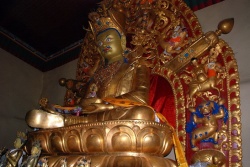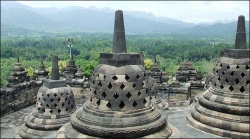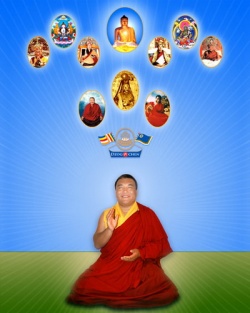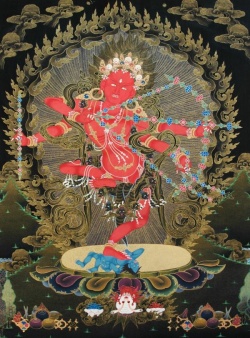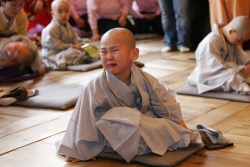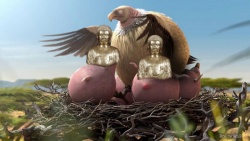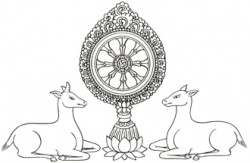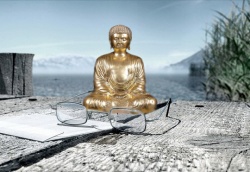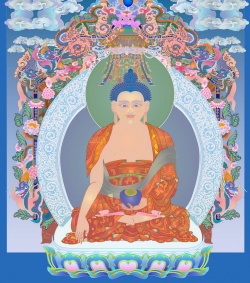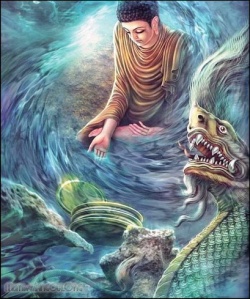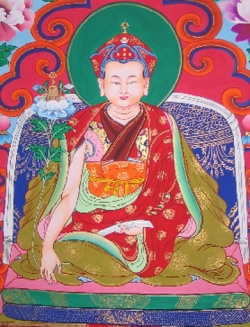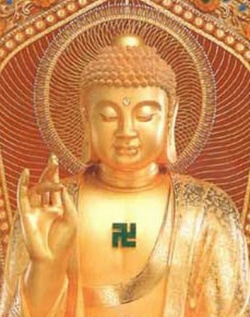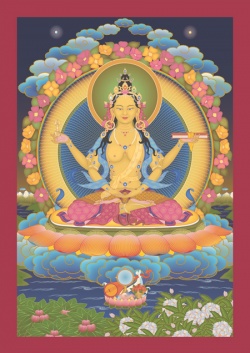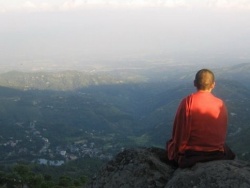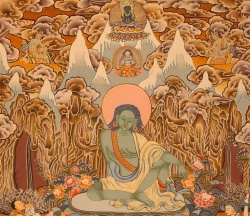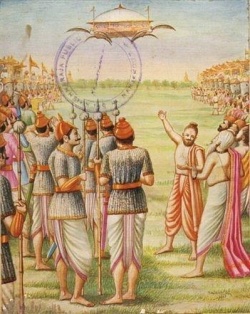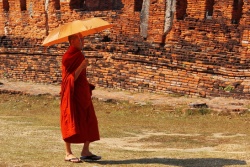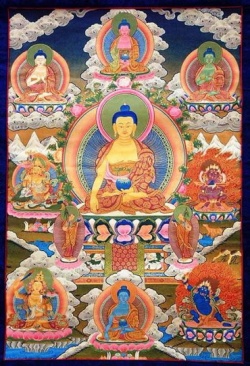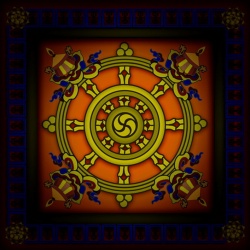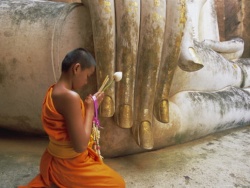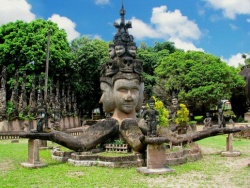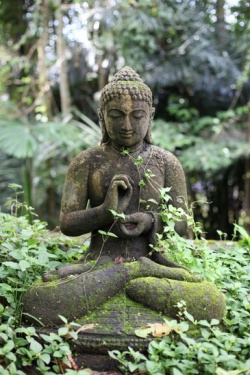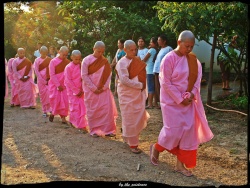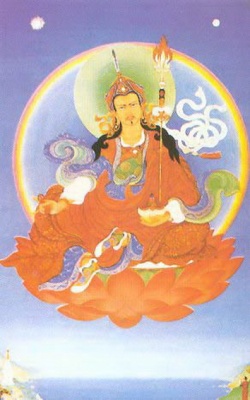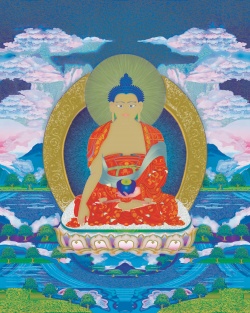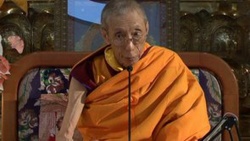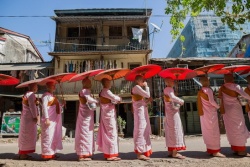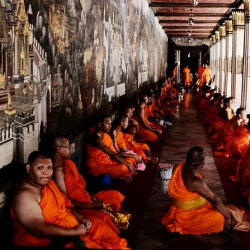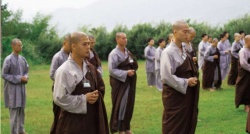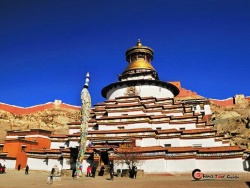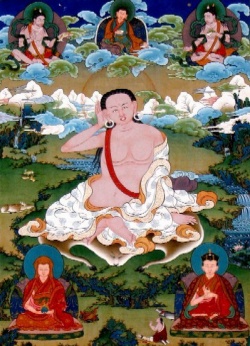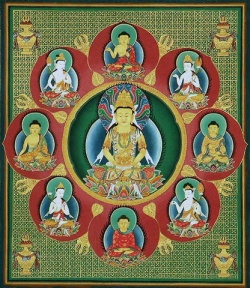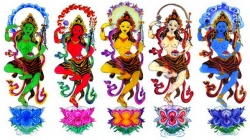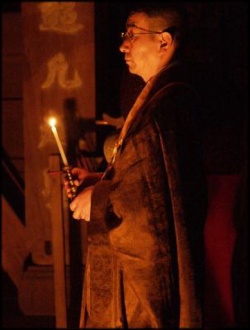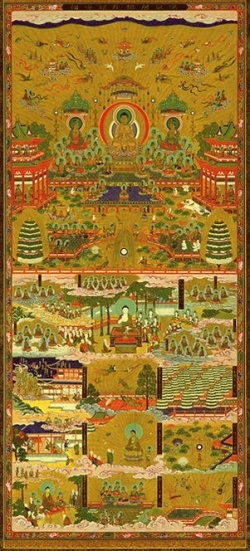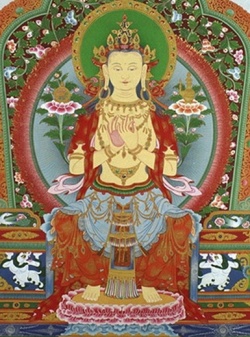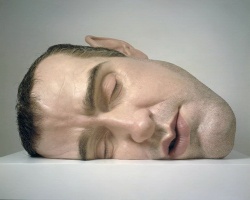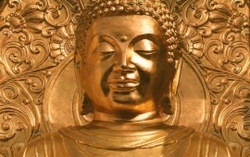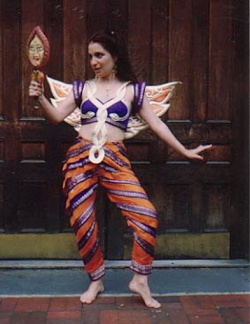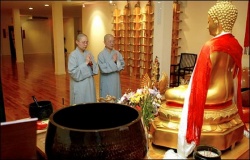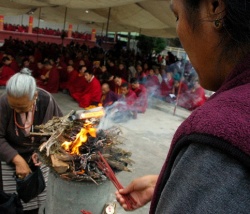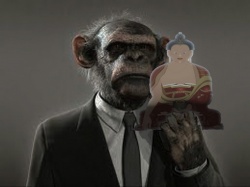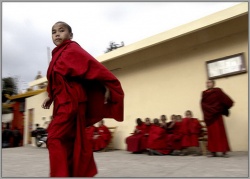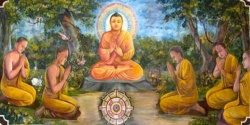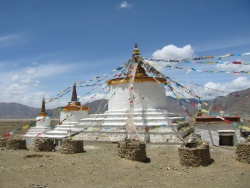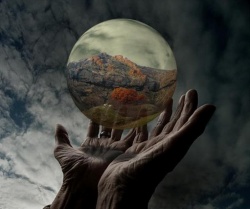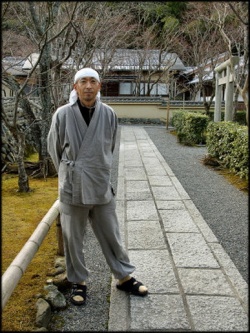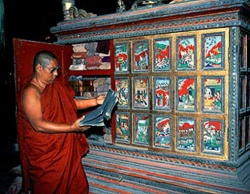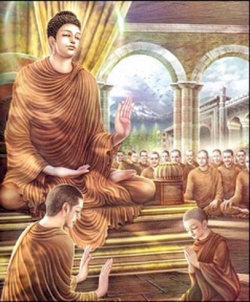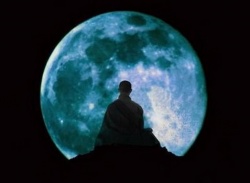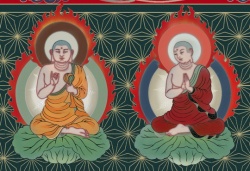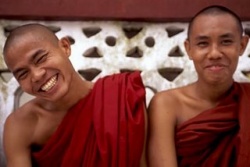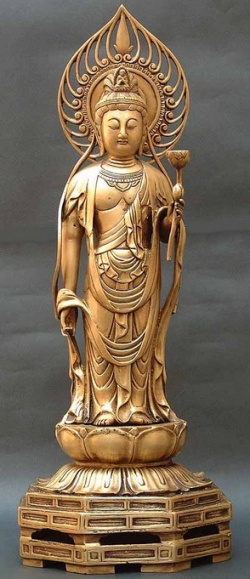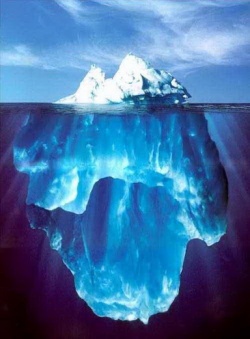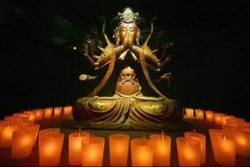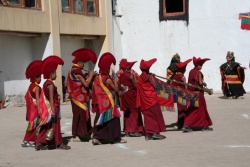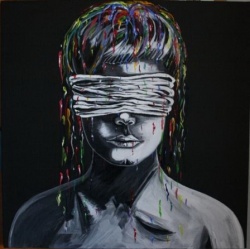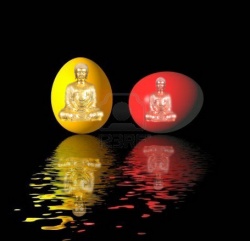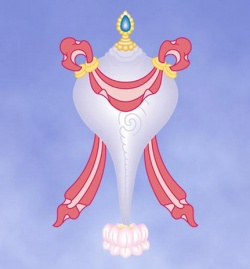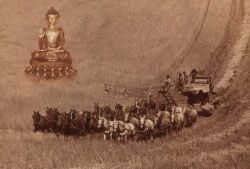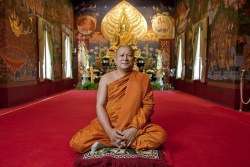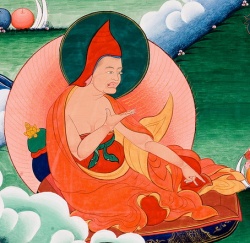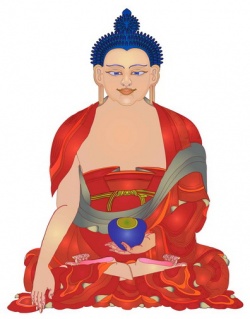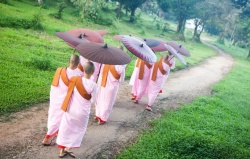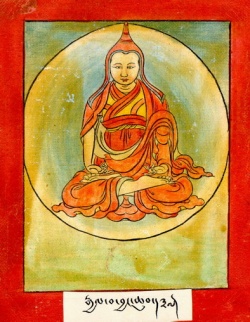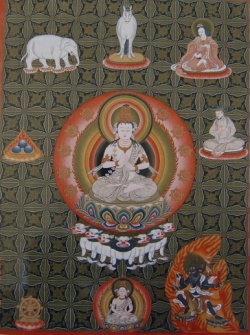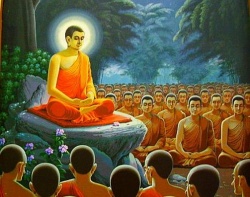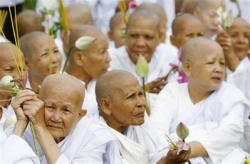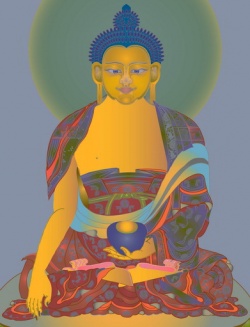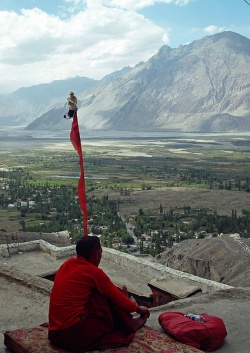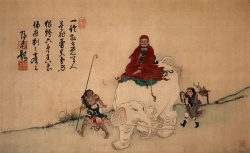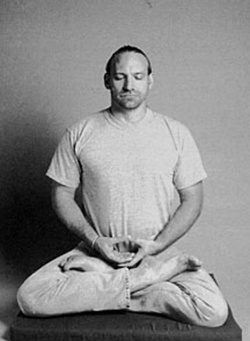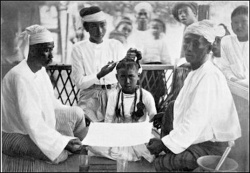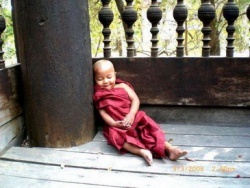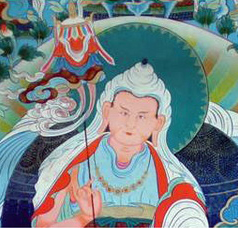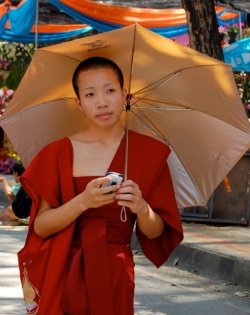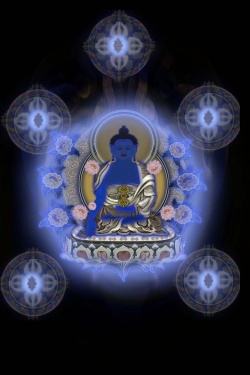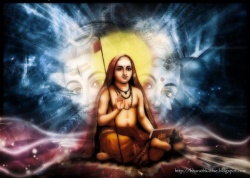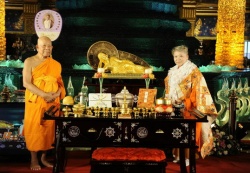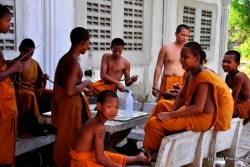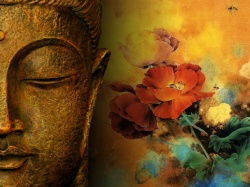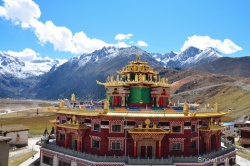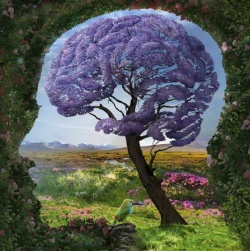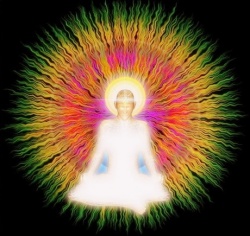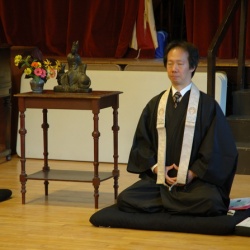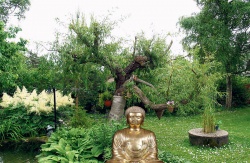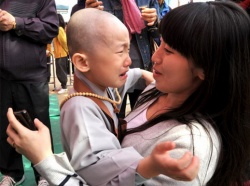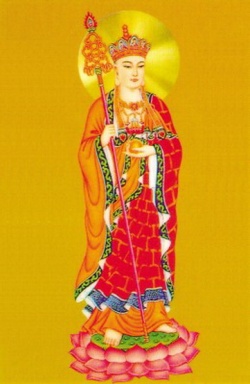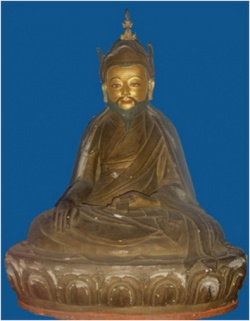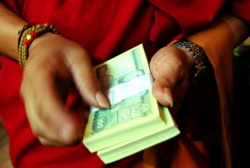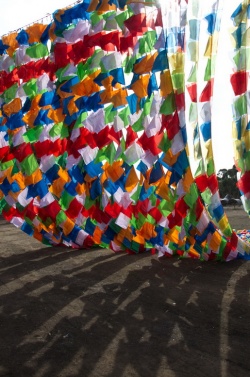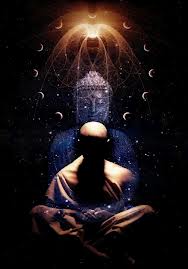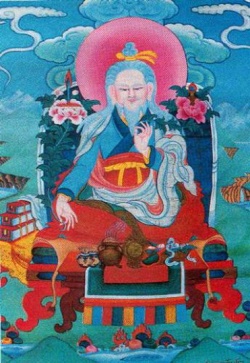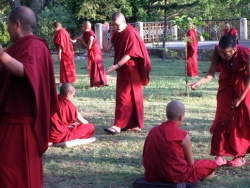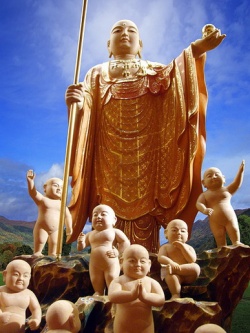Mahayana Mahaparinirvana Sutra: Chapter 20: On Pure Actions
Mahayana Mahaparinirvana Sutra
Chapter 20: On Pure Actions
Translated by Kosho Yamamoto from Dharmakshema's Chinese version,
edited and revised by Dr. Tony Page
Copyright for this edition is held by Dr. Tony Page, 2012.
"O good man! What are the pure actions of a Bodhisattva-mahasattva? O good man! The Bodhisattva-mahasattva, abiding in the Mahayana Mahaparinirvana, can be perfect in pure actions in seven categories. What are those seven? They are: 1) knowing Dharma, 2) knowing the meaning, 3) knowing the time, 4) being contented, 5) knowing for oneself, 6) knowing the masses, 7) knowing the difference between respectable and mean.
"O good man! How does a Bodhisattva-mahasattva know Dharma? O good man! This Bodhisattva-mahasattva knows the twelve types of scripture, which are: 1) sutra, 2) geya, 3) vyakarana, 4) gatha, 5) udana, 6) nidana, 7) avadana, 8) itivrttaka, 9) jataka, 10) vaipulya, 11) adbhutadharma, and 12) upadesa.
"O good man! What is meant by "sutra?" A sutra begins with: "Thus have I heard" and ends with: "practise with joy". All such are "sutras".
"What is "geya?" It goes like this: "The Buddha said to all bhiksus: In days gone by, I, like you, was ignorant and had no Wisdom, and could not see the Four Truths. For that reason, I had long transmigrated and repeated birth and death and floundered in the great sea of suffering. What are the Four? They are: 1) Suffering, 2) the Cause of Suffering, 3) Extinction, 4) the Way to the Extinction of Suffering. In days gone by, the Buddha spoke of the sutras. At that time, there was a sharp-witted person who came to the Buddha to be taught Dharma. He asked others: "What did the Tathagata speak about before?" The Tathagata, seeing this, said in a gatha, basing himself on the sutras:
"I, like you, did not see the Four Truths
And as a result floundered long in the sea
Of suffering of birth and death.
By seeing the Four Truths,
One well severs birth and death.
Birth and death done away with,
One no more gains any existence."
This is "geya."
"What is "vyakarana"? There are sutras and vinayas (monastic rules) in which, when the Tathagata speaks, he gives prophecies to all the heavenly ones, such as: "O you, Ajita! In days to come, there will be a king named "Sankha". In his reign, you will practise the Way, attain Buddhahood, and be called Maitreya." This is "vyakarana".
"What is "gatha"? In addition to the sutras and vinaya, there are cases in which a four-line poem appears, such as:
"Do not do any evil;
Do all that is good.
Purify your mind.
This is the teaching of all Buddhas."
This is "gatha."
"What is "udana"? The Buddha, at about four in the afternoon, enters a dhyana (meditation). He speaks about Dharma to the devas (gods). At that time, the bhiksus (monks) think: "What is the Tathagata doing?" The Tathagata awakes next morning from the dhyana and, without being asked by anyone, he, with the power of knowledge that can read the minds of others, speaks unasked: "O Bhiksus! Know that the life of all devas is extremely long. O all of you Bhiksus! It is good that you all act for others and do not seek your own profit. It is good that you seek but little; it is good that you feel contented; it is good that you are quiet (peaceful)!" It goes like that. In all such scriptures, the Buddha speaks unasked. This is "udana".
"What is "nidana"? The gathas of all sutras speak for others about the basic roots of all causes. In Sravasti there was a man who caught a bird in a net. Having caught it, he put it in a cage, gave it water and cereal, and then let it go. The World-Honoured One knows all histories from beginning to end and talks about this in a gatha, such as:
"Do not belittle small evil acts,
And do not say that there is no evil that arises.
Small is a drop of water,
But (by accumulation) it fills a great vessel."
This is "nidana".
"What is "avadana"? It is as in the case of the parables that occur in the vinaya. This is "avadana".
"What is "itivrttaka"? This is as when the Buddha says: "O Bhiksus! Know that what I speak when I am in the world is the sutras. In the days of Buddha Krakucchanda, it is called "amrta-drum" (drum of the Immortal); what appears in the days of Kanakamuni is called "Dharma-mirror"; what appears in the days of Buddha Kasyapa is called "Void-discriminating". This is "itivrttaka".
"What is "jataka"? This is when the World-Honoured One (tells of how he), in days gone by, became a Bodhisattva and practised the Way, such as: "O Bhisksus! Know that, in days gone by, I gained life as a deer, a brown bear, a reindeer, a hare, the king of a small state, a chakravartin, a naga, and a garuda. Such are all the bodies one receives when one practises the Way of a Bodhisattva." This is "jataka".
"What is "vaipulya sutra"? It is none other than the Mahayana vaipulya (extensive) sutras. What it states is on a large scale. It is like space. This is "vaipulya".
"What is "adbhutadharma"? After the Bodhisattva has just been born, he takes seven steps without any help from others, sending out great lights, which shine in all ten directions; or a monkey holds in its hand a pot of honey and offers it to the Tathagata; or a white-headed dog sits by the Buddha's side and listens to his sermons; Marapapiyans transforms himself into a blue cow and walks between tiles and bowls, touching but not damaging them; or, when the Buddha first enters the devas' temple, the devas come down and pay him homage. Any sutra such as this is called "adbhutadharma".
"What do we mean by "upadesa"? It is one (scripture) that discusses the sutras which contain the Buddha's sermons and analyses and widely explains the characteristics. Any such is an "upadesa".
"If any Bodhisattva is well versed in the twelve types of scripture, this is "knowing Dharma".
"How does a Bodhisattva-mahasattva understand the meaning? A Bodhisattva knows the meaning of all words and languages. This is knowing the meaning.
"How does a Bodhisattva-mahasattva know the (right) time? O good man! The Bodhisattva, at a given time, will practise quietude. At another time, he will make effort. At another time, he will practise equanimity and dhyana. At another time, he will make offerings to his teacher. At another time, he will practise dana (giving), upholding the moral precepts, forbearance, effort, and dhyana, thus perfecting prajnaparamita (transcendent Wisdom). This is knowing the time.
"In what way does a Bodhisattva-mahasattva feel contented? O good man! The Bodhisattva-mahasattva knows contentment in his meals, clothing, medicine, in going, coming, sitting, lying, sleeping, waking, talking and in silence. This is knowing contentment.
"O good man! How does a Bodhisattva-mahasattva know things by himself? The Bodhisattva knows all about faith, the precepts, rich hearing, equanimity, Wisdom, going and coming, right remembrance, good deeds, questions and answers. This is knowing of one's own self.
"How does a Bodhisattva-mahasattva know the masses? Such a Bodhisattva knows: "This is a Kshatriya, this a Brahmin, this an upasaka, this a sramana. Such a person goes thus, comes thus, sits thus, stands up thus, delivers sermons thus, and puts questions and answers thus." This is knowing the masses.
"O good man! In what way does a Bodhisattva-mahasattva know the difference between "respectable" and "mean"? O good man! There are two kinds of men: one who has faith, and the other, who has not. O Bodhisattva! Know that he with faith is one who is good, and that he who has no faith is one who is not good. Also, next, there are two kinds of faithful person. One always pays visits to viharas, and the other does not. O Bodhisattva! Know that he who goes is good, and the other who does not should not be called good. There are two kinds of people who go to viharas. One is he who worships, and the other is he who does not. O Bodhisattva! Know that he who worships is good, and the other who does not is not to be called good. There are two kinds of worshipper. One is he who listens to the sermons, and the other is he who does not listen to the sermons. O Bodhisattva! Know that he who listens to the sermons is one who is good, and that the other is one who cannot be called good. There are again two kinds of people who listen to sermons. The one is he who listens with a true mind, and the other is he who has no true mind. O Bodhisattva! Know that he who listens with a true mind is one who is good, and that he with no true mind is not to be called good. Of listeners with a true mind, there are two kinds. One thinks about the meaning, and the other does not think about the meaning. O Bodhisattva! Know that he who thinks about the meaning is good, and he who does not think about the meaning is not good. And there are two kinds amongst those who think about the meaning. One is he who practises the Way as told, and the other is he who does not practise the Way as told. He who practises the Way as told is one who is good, and he who does not practise the Way as told is one who is not good. There are, again, two kinds of people who practise the Way as told. One is he who takes to the Way of the sravaka, who is unable to releave all beings of all their worries and give them peace and benefit; the second is he who takes to the unsurpassed Mahayana and gives benefit and peace to the many. O Bodhisattva! Know that he who gives benefit and peace to the many is unsurpassed and the best.
"O good man! Of all jewels, the cintamani (wish-fulfilling gem) is the most superb; of all tastes, amrta (ambrosia) is the best. Such a Bodhisattva is the most superb and the best of all humans and devas. No comparison can express it. O good man! This is what we mean when we say that the Bodhisattva-mahasattva abides in the Mahayana Great Nirvana Sutra and lives in the seven good laws. The Bodhisattva, abiding in these seven good laws, can become perfect in pure action.
"Also, next, O good man! There are pure actions, which are: loving-kindness (“maitri”), compassion (“karuna”), sympathetic joy (“mudita”), and equanimity (“upeksha”)."
Bodhisattva Kasyapa said to the Buddha: "A person who practises kindness segregates himself from anger; a person who practises compassion segregates himself from anger. And yet we speak of the "limitless (immeasurable) minds". From the content of the meaning, there must be three. O World-Honoured One! There are three circumstantial factors in loving-kindness. One relates to beings, the second to dharmas, and the third to what is unrelated. The same with compassion, sympathetic joy, and equanimity. Following this logic, there can only be one, not four. What relates to beings comes about relative to the five skandhas, and one prays to give bliss thereto. This is what relates to beings. By what relates to things (dharmas) is meant giving what beings desire to possess. This is what relates to things. By "unrelated" comes about (is meant) the Tathagata. This is the "unrelated". Compassion has bearings on the poor and those in stressed circumstances. The Tathagata, the great teacher, is long since far removed from poverty and stressed circumstances and is blessed with the highest bliss. If any relation is had with beings, it obtains thus with the Buddha. The same is the case with things. That is why we say that any bearing that is had upon the Tathagata is the "relationless". O World-Honoured One! The field in which compassion becomes related to all beings has bearings upon parents, wife, children and relatives. Hence, we say "related to all beings." We say "related to dharmas". Here, we see no parents, wife, children or relatives. We see here that all things arise from circumstantial factors. Hence, "related to dharmas". The "unrelated" is not based on dharmas or beings. Hence, "unrelated". It is the same with compassion, sympathetic joy, and equanimity. So there must be three things, and not four. O World-Honoured One! There are two kinds of people. One is a person who practises the Way using his own intellect, and the other is a person who practises the Way through faith and love. The person who practises the Way through the intellectual channel generally practises loving-kindness, and the person who practises the Way through faith and love practises sympathetic joy and equanimity. Hence, there must be two, and not four. O World-Honoured One! "Immeasurable" means "boundless". The boundary is unattainable. Hence, "boundless". If (something is) "immeasurable", there can only be one, not four. If there were four, how could they be immeasurable? Therefore, there must be one, not four."
The Buddha said to Kasyapa: "O good man! The essence of what the All-Buddha-Tathagata says is undisclosed. For this reason, it is difficult to know. There are cases where he speaks about a set of causes and conditions. What there is (here) is just one. It is as when one says that all things are created things. Or there may be a case where it is said that there are two kinds. These are the direct and indirect causes, and the result. Or it may be spoken of as three. These are illusion, action and suffering. Or it may be spoken of as four. These are ignorance, created existence, birth, and age-and-death. Or it may be spoken of as five, such as: feeling, craving, cleaving, existence, and birth. Or it may be spoken of as six, which are the causes and results of the Three Times (past, present and future). Or things may be spoken of in terms of seven, which are consciousness, mind-and-body, the six sphere, touch, feeling, craving, and cleaving. Or one might speak of eight things, which are those (of the twelve links of interdependent arising), minus the four elements of ignorance, action, birth, and age-and-death, which makes eight. Or one may speak of nine, as stated in the “Nagara Sutra”. This refers to the nine, excepting the three elements of ignorance, action, and consciousness. Or one may speak of eleven, as to Satyakanirgranthaputra. These are the eleven, excepting the one category of "birth". At times, the Buddha speaks fully of the twelve links of interdependent arising. This is as when he spoke at Rajagriha to Kasyapa and others about ignorance all the way down to birth, age, illness, and death. O good man! A single causal relation is, for the benefit of beings, expounded in various ways. It is the same with the innumerable phases (aspects) of the mind. O good man! For this reason, do not entertain doubt in regard to the deeply-hidden action of the All-Buddha-Tathagata."
"O good man! The Tathagata-World-Honoured One enacts great expedients. He speaks of impermanence as Eternal, and of the Eternal as impermanent. He speaks of Bliss as suffering and suffering as Bliss; the impure as Pure and the Pure as impure. He speaks of the Self as selfless and of the selfless as the Self; of non-being as a beings and the real being as a non-being. A non-substance is spoken of as a substance and a substance as a non-substance. The non-real is spoken of as real and the real as non-real; the non-field of cognition as a field of cognition and the field of cognition as a non-field of cognition; non-birth as birth and birth as non-birth; ignorance as brightness and brightness as ignorance; rupa (form) as non-rupa and non-rupa as rupa; the non-Way as the Way and the Way as non-Way. O good man! The Tathagata, by using all such expedients, sets beings to rights. How could we say that anything is wrong with him?
"O good man! There may be a person who covets wealth. I then, for the sake of that person, transform myself into a chakravartin and for innumerable ages give things to him in various ways. Later, I teach him and enable him to abide in unsurpassed Enlightenment. If there is a person who clings to the five deisres, I fill up that person's clinging for innumerable ages with wonderful things that such a person desires to have, and later teach him and make him attain unsurpassed Enlightenment. If there is a rich person, strong and proud, I serve him for innumerable hundreds of thousands of years, running errands and waiting upon him, and after having won over such a person's mind, I will cause him to attain unsurpasssed Enlightenment. If there is a person who transgresses, is self-assertive, thinks he is on the right path and quarrels with others, I shall, for innumerable ages, advise him, remonstrate with him and bring him round, and then cause him to attain unsurpassed Enlightenment. O good man! The Tathagata, for innumerable ages, enacts various means, thus causing beings to achieve unsurpassed Enlightenment. How could anything be wrong here? The All-Buddha-Tathagata may live amidst all evils, but, like the lotus, he is not tainted (by them). O good man! You should understand the four immeasurables (i.e.” Brahma-viharas”) thus.
"O good man! There are four qualities in this limitless mind. The practice accomplished, one gains birth in the world of Great Brahma. O good man! There are thus four kinds within the limitless mind. That is why we speak of four. By practising loving-kindness (“maitri”), a person thoroughly extirpates greed. Practising compassion (“karuna”), a person extirpates anger. Practising sympathetic joy (“mudita”), a person extirpates non-bliss. By practising equanimity, a person well segregates beings from greed and anger. O good man! For this reason, we speak of four. It is not one, not two, and not three.
"O good man! As you say, loving-kindness indeed cuts out anger. If things are thus with compassion, one may say three. Do mot make such a reproof. Why not?
"O good man! Of anger, there are two kinds. One takes life; the other encourages a person. O good man! Because of this, how could it be other than four?
"Also, next, of anger there are two kinds. One is being angry towards beings, and the other towards non-beings. By practising loving-kindness, one thoroughly dispels anger towards beings; by practising compassion, one thoroughly dispels anger towards non-beings.
"Also, next, of anger, there are two kinds. One is based on causal relations and the other is not. Practising loving-kindness, one cuts away that which is based on causal relations; practising compassion, one cuts away that which is based on causal relations.
"Also, next, there are two kinds of anger. One is anger that has been accumulated over a long period in the past, and the other is that which one has just gained. By practising loving-kindness, one severs the anger from the past, and by practising compassion, one severs the anger of the present.
"Also, next, there are two kinds of anger. One is anger at holy persons, and the other at common mortals. By practising loving-kindness, one casts off anger at holy persons; by practising compassion, one casts off anger at common mortals.
"Also, next, there are two types of anger. One is top-grade, and the other is middle-grade. The practising of loving-kindness dispels top-grade anger, while practising compassion dispels middle-grade anger. O good man! For this reason, I say four. How can you reproach me and speak of three and not four? Thus, O Kasyapa, in this limitless mind, antitheses stand against one another, and classified, we get four.
"Also, it is four because of the vessel. If there is loving-kindness in the vessel, there can be no compassion, joy, and equanimity. For this reason, it is four and nothing less.
"O good man! We discriminate according to action. Hence, four. When loving-kindness is acted upon, there can be no compassion, sympathetic joy and equanimity. Hence, four. O good man! Because of limitlessness, we say four. Now, of the limitless there are four kinds. There is the case where what there is is the relation of the limitless mind, but not unmolestedness (unimpededness). Or there is the case where the limitless mind is unmolested and it does not stand (depend) upon relations; there is the case where things stand on the relations of the limitless mind and also on unmolestedness; there is the case where things do not stand on relations and also not on unmolestedness. What is the limitless that has relations, but is not unmolested? This is the case where causal relations are had with innumerable and boundless beings, and yet there is nothing of the kind as the unmolested state of samadhi. Even if gained, it does not remain. Or one gains and loses it. What is the limitless that is unmolested and has no causal relations? It is like desiring to have causal relations with parents, brothers and sisters and to give them peace and bliss. There can be no limitless causal relations (here). What is the limitless that has causal relations and is unmolested? This refers to all Buddhas and Bodhisattvas. What is the limitless with no causal relations and no unmolestedness? The sravakas and pratyekabuddhas cannot have unlimited relations with beings. Also, they are not unmolested (i.e. they are constrained by limitations). O good man! Because of this, we speak of the "four limitlessnesses". This is not something any sravakas or pratyekabuddhas can know. This is what applies to the world of the All-Buddha-Tathagata. O good man! The sravakas and pratyekabuddhas may call these four the things that are limitless. But petty is what is said (by them); it is not worth talking of. All Buddhas and Bodhisattvas should be called the "limitless limitless."
Bodhisattva Kasyapa said to the Buddha: "O World-Honoured One! It is thus, it is thus! It is just as you, the Holy One, say. What obtains in the world of the All-Buddha-Tathagata does not come within the reach of sravakas and pratyekabuddhas. O World-Honoured One! A Bodhisattva abides in the Mahayana Mahaparinirvana and gains a heart of loving-kindness. Is this a great heart of loving-kindness and compassion or not?" The Buddha said: "It is! O good man! The Bodhisattva sees three things as he lives with all beings, which are: 1) people on intimate relations (with him), 2) people of hateful relations, and 3) people who are in between. With those on intimate relations, there are three classes, which are: 1) top, 2) middle, and 3) low. The same with those involved in hateful relations. This Bodhisattva-mahasattva gives the highest bliss to those with whom he is on the most intimate relations. He also gives the highest bliss all-equally to those of the middle and low grades. He gives some degree of bliss to those whom he hates most, and to a person whose hatred is of middle grade he gives middle-grade bliss, and to him whose hatred is of a low level, he gives the highest bliss. The Bodhisattva thus practises from one to the other, and to the one he most hates he gives middle-grade bliss and to those whom he hates on a middling level and a low level, he gives the highest bliss. He practises and gives the highest bliss all-equally to those of the top, middle and low grades. When the highest bliss is given to one whom he most hates, we say that the heart of loving-kindness has been accomplished. The Bodhisattva, then, whether at the place of his parents or of those whom he most hates, is all-equal in mind, and there exists no mental state of discrimination. O good man! One obtains loving-kindness, but this is not called great loving-kindness."
"O World-Honoured One! Why is it that the Bodhisattva achieves such loving-kindness and yet we do not call it great loving-kindness?" "O good man! We do not call loving-kindness great loving-kindness, because it (great loving-kindness) is hard to obtain. Why so? For a long time past, over innumerable kalpas, one has amassed “asravas” (defilements, illusions) and not practised what is good. For this reason, one is unable to subdue the mind in a day. O good man! When a pea is dried up, one might try to thrust an awl through it, but one cannot. It is like that. The “asravas” are as hard as that. Try as one might single-mindedly the whole day and night through, one cannot yet subdue them. Also, the dog of a house does not fear people, and the deer of the forest fears man and runs away. Anger is difficult to do away with, like the dog that guards a house; but the heart of loving-kindness easily flees, like the deer in the forest. It is therefore hard to subdue this mind. That is why we do not say "great loving-kindness". Also, next, O good man! When we draw a picture on stone, it always remains thus. But drawn on water, it disappears immediately and its strength does not remain there. Anger is hard to do away with, like a drawing that has been done in stone. A good deed easily disappears, like a picture drawn in water. That is why it is not easy to subdue this mind. A great ball of fire sustains light for a long while; the brightness of a flash of lightning cannot endure long. It is the same here. Anger is a fire-ball; loving-kindness is like lightning. That is why this mind is hard to subdue. Hence, we do not say "great loving-kindness".
"O good man! When a Bodhisattva-mahasattva attains the first soil (“bhumi” - level of a higher Bodhisattva), this is called "great loving-kindness". Why? O good man! The last (i.e. most) evil person is the icchantika. When a Bodhisattva of the first “bhumi” practises great loving-kindness, no discrimination exists in his mind - not even towards an icchantika. As no wrong is seen, no anger arises. For this reason, we indeed call this "great loving-kindness". O good man! He deprives all beings of what gives no benefit. This is great loving-kindness. He desires to give an uncountable amount of benefit and bliss to all beings. This is great compassion. He plants joy in the minds of all beings. This is great sympathetic joy. There is no guarding or protecting. This is great equanimity (“upeksha”). My Dharma does not see one's own existence and self; what is seen is that all things are viewed all-equally and with no divided mind. This is great equanimity. One forsakes one's own bliss and gives it to others. This is great equanimity (or: great relinquishment).
"O good man! The only thing there is here is that these four limitless minds well enable the Bodhisattva to increase and perfect the six paramitas (perfections). Things are not necessarily thus regarding others' actions. O good man! The Bodhisattva-mahasattva first gains the four limitless minds that pertain to the world. Later, he aspires to unsurpassed Bodhichitta (resolve to win Enlightenment). And by degrees he gains what concerns those of the supramundane world. O good man! From the limitedness of the secular world, one obtains the unlimitedness of the supramundane world. Hence, we say "great limitlessness."
Bodhisattva Kasyapa said to the Buddha: "O World-Honoured One! We say that the benefitless is done away with and that benefit and bliss are given. Truth to tell, nothing happens. Thinking thus is surely false. No real fruition comes about. O World-Honoured One! This is as when a bhiksu meditates on impurity and regards what he is wearing as leather, which it actually is not. He thinks that what he eats is worms. But here too, it is not really worms. He regards a beautiful soup as a defiled liquid, but it is not really anything defiled. He regards the cream that he eats as the marrow of the brain, but actually it is not a brain. He meditates on the crushed powder of bones and regards it as parched barley flour. And yet it is not really parched barley flour. The same with the case of the four limitless minds. There is not really any benefiting of beings, nor any giving to them of bliss. The mouth speaks about bliss being given. But no such thing comes about. It such a meditation not false? O World-Honoured One! If it is the case that falsehood does not exist here, but bliss (truly) is given, why is it that all beings do not gain bliss by the miraculous powers of all Buddhas and Bodhisattvas? If no bliss results in any true sense, it must be as the Buddha says: "I call to mind that in days gone by I practised loving-kindness and through seven successive stages of the dissolution and re-arising of the world in this kalpa aeon, I did not get born here. When the world was born, I saw my birth in the heaven of Brahma, and when the world underwent dissolution, I was born in the heaven of Abhasvara. Born in the heaven of Brahma, one has unmolested (i.e. unrestricted) power and cannot ever be subdued. Of the thousand Brahmas, the most superb is Great Brahma. All beings considered me as the most superb. Thirty-six times I became Sakrodevanamindra, the King of Trayastrimsa Heaven, and innumerable hundreds of thousands of times a chakravartin. Only by practising the Way of the heart of loving-kindness did I gain the fruits of man and heaven." If not true, how could things be in accord with this meaning?"
The Buddha said: Well said, well said, O good man! You are, indeed, brave and fear nothing." And for Kasyapa's sake, he spoke in a gatha:
"If one does not feel anger
Even towards a single being
And prays to give bliss to such a being,
This is loving-kindness.
If one has compassion
For all beings,
This is the holy seed.
Endless is the recompense.
Even if the five-powered rishis filled this earth
And gave to Mahesvara elephants, horses
And their various possessions,
The reward gained would not equal
One sixteenth of one (impulse of) loving-kindness
That is practised."
"O good man! Practising loving-kindness is true and does not come from a false mind. It is clearly the truth. The loving-kindness of sravakas and pratyekabuddhas is that which is false. With all Buddhas and Bodhisattvas, what there is (there) is the true, and not what is false. How do we know this? O good man! As the Bodhisattva-mahasattva practises the Way of Great Nirvana, he meditates upon earth and (mentally) turns it into gold, and meditates upon gold and turns it into earth, earth into water, water into fire, fire into water, earth into wind, and wind into earth. All appears as willed, and nothing is false. He meditates upon real beings and makes them into non-beings, and turns non-beings into real beings. All appears as willed and nothing is false. O good man! Know that the four limitless minds of a Bodhisattva come about from true thinking and are not what is untrue.
"Also, next, O good man! Why is it called true thinking? Because it thoroughly does away with all defilements. O good man! Now, a person who practises loving-kindness uproots all greed; one who practises compassion uproots anger; one who practises sympathetic joy uproots unhappiness; one who practises equanimity uproots greed, anger and all the aspects of things that beings have. Hence, we call this true thinking.
"Also, next, O good man! The four limitless minds of a Bodhisattva-mahasattva form the root of all good deeds. O good man! If the Bodhisattva-mahasattva does not see a poverty-stricken being, there cannot be any arising of compassion. If the compassionate mind does not arise, there will not arise any thought of giving. By means of the causal relations of giving, he bestows on beings peace and bliss. These are drink, food, vehicles, clothing, flowers, incense, bedsteads, houses, and lamps. When giving is done in this way, there is no bond in the mind and no greed arises. He definitely transfers the merit hereof to unsurpassed Enlightenment. The mind does not sit on time. The false mind is forever done away with; what is done is not done out of fear, for fame or profit. It does not seek the world of humans or gods; whatever pleasure is gained does not evoke arrogance; it does not look for rewards; giving is not done to cheat others; it does not seek wealth or respect. When giving is performed, no discrimination (distinction) is made as to whether the recipient has upheld the moral precepts or transgressed, whether he is a true field of weal or a bad field of weal, whether learned or unlearned. When giving is performed, no discrimination is drawn between the right and wrong of the vessel; no difference is seen between the right or wrong time or place. One does not think about whether there is a famine or plenitude of things and bliss. No discrimination is made as to the cause or the result thereof, or to worrying about what is right (worthy) or not right about the recipient, or whether he is rich or not rich. Also, the Bodhisattva does not trouble to look into any difference as to whether the recipient is a person who gives or one who receives, what the thing is that is given, or ceasing, or the recompense for what is given. The only thing that is done is that giving is performed without cessation.
"O good man! If the Bodhisattva looked to the upholding or infringing of the precepts, or the results thereof, there could not be any giving to the end. If there is no giving, there cannot be perfection of the danaparamita (transcendent giving). If there is no danaparamita, there cannot be any arriving at unsurpassed Enlightenment."
"O good man! As an illustration: there is a man who has been struck by a poisoned arrow. His relatives call in a doctor to releave him of the poison and mean to extract the arrow. The man says: "Don't touch me for a moment! I shall think: (From where did such an arrow come? Who discharged it? Was it a Kshatriya, a Brahmin, a Vaishya or Sudra)." He also thinks: "What type of wood is this? Bamboo or willow? By whom was the iron barb made? Is it strong or soft? What bird does the feather of the arrow come from? Is it from a crow, an owl, or an eagle? What is the poison made from? Is it man-made or natural? Is it a human poison or from a poisonous snake?" An ignorant person like this can never reach the end of trying to know about all these things. Then, his life will depart. O good man! It is the same with the Bodhisattva. If, when giving, he were to seek to know whether the recipient had upheld or violated the precepts, what the effect of the gift might be - he would not be able to give, to the very end. If there is no giving, then danaparamita will not have been accomplished. If danaparamita is not accomplished, there cannot be the attainment of unsurpassed Enlightenment.
"Also, next, O good man! When the Bodhisattva-mahasattva practises giving, his kind heart sees all beings equally, like unto his own only son. Additionally when giving, his compassionate heart bestirs itself, as when a father and mother look at their own son who is ill. When giving, his heart feels joy, as when the father and mother see their child's illness cured. When giving is performed, his mind is away from (not attached to) what is given, as when a father and mother see their son already grown up and living by himself.
"This Bodhisattva-mahasattva always vows when he benevolently gives food: "I now give this and share it with all beings and intend that by the causal relations of this act all beings should attain the food of Great Wisdom and with effort transfer the merit thereof to unsurpassed Mahayana. I pray that all beings will gain the food of Good Wisdom and that they will not seek the food of the sravakas and pratyekabuddhas. I pray that all beings will gain the food of the joy of Dharma and not seek the food of craving. I pray that all beings will gain the food of prajnaparamita (transcendent Wisdom) in abundance and that they will have the unobstructed and best root of good, which will grow greater. I pray that all beings will understand and attain the phase of the Void and perfect the unhindered body and become like space. I pray that all beings will always pity all for the sake of those who receive and will become a field of blessings." O good man! The Bodhisattva-mahasattva, when practising the heart of loving-kindness, should firmly pray thus in regard to any food that is given.
"Also, next, O good man! When the Bodhisattva-mahasattva, with a heart of loving-kindness, gives drink (to someone), he should always vow: "I share what I now give with all beings. By reason of this act, they will walk towards the river of Mahayana and partake of the water of the eight tastes, so that they can take to the path of unsurpassed Enlightenment, segregate themselves from the thirst of the sravakas and pratyeka-buddhas, and long for the unexcelled Buddha Vehicle. (I pray) that they will segregate themselves from the thirst of the defilements, and long for the food of Dharma, that they will part from the love of birth-and-death, entertain loving thoughts towards the Mahayana Mahaparinirvana, be perfect in the Dharma-Body, gain all samadhis and enter the great sea of Wisdom. I pray that all beings will partake of the taste of renunciation, abandon greed, and attain silence and quietude. I pray that all beings become perfect in the countless hundreds of thousands of tastes of Dharma. Perfect in the taste of Dharma, they will see the Buddha-Nature, and having seen the Buddha-Nature, they will rain down the rain of Dharma, and having rained down the rain of Dharma, the Buddha-Nature will overspread all like space. Also, (I pray that) all the other countless beings will attain the oneness of taste of the Dharma of Mahayana. This is not the taste of all the sravakas and pratyekabuddhas. I pray that all beings will gain the oneness of sweet taste and that there will not be any discriminative difference of the six kinds. I pray that all will solely seek the taste of Dharma, the unhindered taste of Buddhist actions and that they will not seek other tastes." O good man! When the Bodhisattva-mahasattva, with a heart of loving-kindness, bestows drink (upon others), he should take such a vow."
"Also, next, O good man! When the Bodhisattva-mahasattva, with his heart of loving-kindness, gives away vehicles, he should always pray: "I shall share what I now give with all beings, and by reason of this I shall cause all beings to become perfect in the Mahayana and abide in it. And they will not step back from the vehicle which will be unshakable and adamantine. What will be sought will not be the sravaka or pratyekabuddha vehicle, but the Buddha vehicle, an unbeaten (indestructible) vehicle, a vehicle that is not weak and is lacking in no part, one that does not fall over or sink down, the unsurpassed vehicle, the ten-powered vehicle, the great-virtue vehicle, the incomparable vehicle, the rarest of vehicles, the difficult-to-find vehicle, the boundless vehicle, and the omniscient vehicle." O good man! When the Bodhisattva-mahasattva, with his heart of loving-kindness, gives away a vehicle, he should always take such vows.
"Also, next, O good man! When the Bodhisattva-mahasattva, with his heart of loving-kindness, gives clothing (to a person), he should always pray: "I shall always share what I now give with all beings, and through this I shall enable all beings to gain the clothing of repentance and let the Dharma-world cover their body and rend asunder the clothes of all twisted views. A robe will be put on parts of the body one foot and six inches. The body that shines is golden; its touch is soft and unobstructed; its colour is brilliant; its skin is soft and delicate. The Eternal Light is unending and is colourless. I pray that all beings will gain the colourless body and part from all colours, and attain Great Nirvana." O good man! When the Bodhisattva-mahasattva gives away clothing, he should definitely take such vows.
"Also, next, O good man! When the Bodhisattva-mahasattva, practising loving-kindness, gives flowers, incense, smearing incense, powdered incense or various other kinds of incense, he should always vow: "I share with all beings what I now give, and I pray that, through this, all beings will attain the Buddha-flower samadhi, and that I shall enable them to put on their head the wonderful wig of the seven Bodhi elements. I pray that all beings will look like the full moon and that their complexion will be wonderful and best. I pray that beings will look one and be adorned with a hundred blessings. I pray that all beings will gain whatever colour they desire to have. I pray that all beings will encounter a good friend of the Way and gain the incense of unhinderedness and do away with all evil smells and defilements. I pray that all beings will be armed with the roots of good and possess rare gems. I pray that, when they see, they will feel happy and have no apprehension or sorrow, that they will all be garbed in every good deed, and that they will have no anxieties. I pray that all beings will be completely perfect in the incense of the precepts and that the fragrance of this incense will fill all the ten directions. I pray that all beings will be perfect in the precepts that are stubborn (tenacious), the unrepenting precepts, and the precepts of all Wisdom; that they will segregate themselves from all acts of precept-violation, that they will gain a state totally away from the precepts (not separate from the precepts), the precepts that are unprecedented, the precepts that need no teacher, the precepts of non-action, the untainted precepts, the last-attained, absolute and all-equal precepts. There shall be undefiled shila (precepts), no favouring, no vengeance, no good, no bad, all will be equal, with no hating and no loving. I pray that all beings will gain the topmost, the Mahayana, and the non-Hinayana precepts. I pray that all beings will be perfect in shilaparamita (transcendent morality) and also be equal to the precepts attained by all Buddhas. I pray that all beings may be suffused with the incense of giving, precept-upholding, forbearance, effort, meditation, and Wisdom. I pray that all beings will be accomplished in the all-wonderful lotus of Great Nirvana, and that the fragrance thereof will fill the ten directions. I pray that all beings will partake of the unsurpassed dishes of Great Nirvana of Mahayana and that they will act as the bee does that calls at a flower, taking along with it only its fragrance. I pray that all beings will achieve a body suffused with the incense of innumerable virtues." O good man! The Bodhisattva-mahasattva should definitely always vow as in the above way when he abides in the heart of loving-kindness and bestows flowers and incense.
"Also, next, O good man! When the Bodhisattva-mahasattva, with a heart of loving-kindness, gives away bedding, he should always vow: "I pray that I shall share amongst all beings what I now give and that, through this, all beings will obtain the bed which one sees in the Buddha-country, that they will attain great Wisdom and dwell in the four dhyanas (deep meditative states); (I pray) that they will sleep on the bed which the Bodhisattva uses, not sleeping on those of the sravakas and pratyekabuddhas. I pray that all beings will sleep on peaceful beds, abandoning the bed of birth-and-death and will sleep in the lion's bed of Great Nirvana. I pray that all beings will gain this bed, and later, for the sake of innumerable other beings, will move from place to place and manifest the lion's play (sport) of all divine powers. I pray that all beings will live in the great palace of Mahayana and will preach the Buddha-Nature for the benefit of all beings. I pray that all beings will sleep in the unexcelled bed, one not subject to worldy dharmas. I pray that all beings will gain the bed of patience, thus parting from birth and death, famine, frost, and hunger. I pray that all beings will attain the bed of fearlessness and part from all the worries of the vengeance of defilement. I pray that all beings will gain the untainted bed and look for the unsurpassed right Way. I pray that all beings will gain the bed of Wonderful Dharma and always be under the protection of a good friend of the teaching. I pray that all beings will be able to sleep on their right side and abide in the Dharma of all Buddhas." O good man! When the Bodhisattva-mahasattva, with a heart of loving-kindness, gives away bedding, he should vow thus.
"Also, next, O good man! When the Bodhisattva-mahasattva, abiding in his heart of loving-kindness, gives away a house for someone to live in, he should vow: "I shall share what I now give with all beings and, by this means, I intend to have all beings dwell in the house of Mahayana and practise the Way as practised by good friends of the Way, so that they will be able to practise such as great compassion, the six paramitas, the great, true Enlightenment, the ways and practices that all Bodhisattvas follow, the boundlessly vast ways that are like space. I pray that all beings will attain the right (state of) mind and segregate themselves from all evil thoughts. I pray that all beings will peacefully abide in what is Eternal, Bliss, Self, and Purity, parting from the four inversions (of Truth). I pray that all beings will learn what is written about the supramundane. I pray that all beings will unfailingly become the vessels of unsurpassed Wisdom. I pray that all beings will enter the house of amrta (immortality). I pray that all beings will enter the house of Nirvana of Mahayana at their first thought, second thought, and last thought. I pray that all beings will, in the days to come, dwell in the place where the Bodhisattvas live." O good man! When the Bodhisattva-mahasattva, with his heart of loving-kindness, gives away houses, he should definitely always take such vows.
”Also, next, O good man! When the Bodhisattva-mahasattva, from his heart of loving-kindness, gives away lamp-light (lamps), he should always pray: "I shall share what I now give with all beings, and through this shall enable beings to be blessed with limitless light and to abide in the Buddhist teaching. I pray that all beings will gain the light of the lamp. I pray that all beings will be blessed with the light that is all-wonderful and best. I pray that all beings will be blessed with eyes that are clear, bright, and unclouded. I pray that all beings will gain the great Light of Wisdom and grasp the fact that they have no self, no phase of a being, man, or life. I pray that all beings will see the pristine Buddha-Nature, which is as of space. I pray that all beings will be blessed with the pure fleshly eye, so that they will be able to see the depths of the worlds of the ten directions, which are as numerous as the sands of the Ganges. I pray that all beings will be blessed with the light of the Buddha and will shine over all the ten directions. I pray that all beings will be blessed with unobstructed insight, so that they will be able to see the pristine Buddha-Nature. I pray that all beings will be blessed with the light of great Wisdom and destroy all gloom and the (state of mind of) the icchantika. I pray that the limited light of all beings will shine over all the innumerable Buddha-lands. I pray that all beings will light the lamp of Mahayana and be released from the lock of the two vehicles. I pray that the light with which all beings will be blessed will break the gloom of ignorance for over a thousand days. I pray that all beings will be blessed with the light of a fire-ball and will do away with the gloom of the 3,000 great-thousand worlds. I pray that all beings will perfect the Five Eyes (i.e. the physical eye, the deva-eye, the eye of Wisdom, the Dharma-eye, and the Eye of a Buddha) and will awaken to the true aspect of all things and attain the teacherless light. I pray that all beings will have no clinging views or ignorance. I pray that all beings will be blessed with the wonderful light of Great Nirvana of the Mahayana and will show all beings the Buddha-Nature.” O good man! When the Bodhisattva-mahasattva, from his heart of loving-kindness, gives away lamp-light, he should always vow thus. O good man! “All the roots of good of all sravakas, pratyekabuddhas, Bodhisattvas, and all Tathagatas have as their foundation loving-kindness”. O good man! When the Bodhisattva-mahasattva practises the heart of loving-kindness, he gains all such innumerable roots of good as: (mindfulness of) the impure (“asubha-smrti” - awareness of the impurity of the carnal body), (meditation upon) the exhalation and inhalation of the breath (“anapana-smrti”), (awareness of) impermanence, birth-and-death, the four mindfulnesses (“catursmrtyupasthana” - mindfulness of the impurity of the body, mindfulness of feeling as suffering, mindfulness of the mind as impermanent, and mindfulness of dharmas as contingent, without a separate, exclusive nature of their own), the seven expedients, the three views of existence, the twelve links of interdependent arising, meditation on impermanence, etc., “usmagata, ksanti” (patience), “laukikagradharma” (prime-in-the-world condition, or first-of-the-world-root-of-good), “darshana-marga” (the path of seeing), “bhavana-marga” (path of meditation), right-effort-and-at-willness, all roots and powers, the seven factors of Enlightenment (mindfulness, discriminative investigation of Dharma, vigour in practice, supersensuous rapture, pacification of body and mind, concentration, and equanimity), the eight paths (Noble Eightfold Path), the four dhyanas, the four limitless minds, the eight emancipations, the eight superior places, the ten-all-places, knowledge of mind-reading (“para-cetan-paryaya-jnana”), and other divine powers, the utmost-fathoming knowledge, the sravaka-knowledge, the pratyekabuddha-knowledge, Bodhisattva-knowledge, and Buddha-Knowledge. O good man! All such have as their foundation loving-kindness. O good man! For this reason, loving-kindness is true, and is not what is false. “If any person asks about the root of any aspect of good, say that it is loving-kindness. Thus, this is true and not false.
"O good man! A person who performs good is (one of) true thinking". True thinking is loving-kindness. Loving-kindness is the Tathagata. Loving-kindness is Mahayana. Mahayana is loving-kindness. Loving-kindness is the Tathagata. The Tathagata is loving-kindness. O good man! Loving-kindness is Great Brahma. Great Brahma is loving-kindness. Loving-kindness is the Tathagata. O good man! Loving-kindness acts as the parent to all beings. The parent is loving-kindness. Loving-kindness is the Tathagata. O good man! Loving-kindness is what exists in the inconceivable world of all Buddhas. What exists in the inconceivable world of all Buddhas is at once loving-kindness. Know that loving-kindness is the Tathagata. O good man! Loving-kindness is the Buddha-Nature of all beings. Such a Buddha-Nature has long been overshadowed by defilements. That is why all beings are unable to see. The Buddha-Nature is loving-kindness. Loving-kindness is the Tathagata. O good man! Loving-kindness is the great firmament. The great firmament is loving-kindness. Loving-kindness is the Tathagata. O good man! Loving-kindness is space. Space is loving-kindness. Loving-kindness is the Tathagata. O good man! Loving-kindness is the Eternal. The Eternal is Dharma. Dharma is the Sangha. The Sangha is loving-kindness. Loving-kindness is the Tathagata. O good man! Loving-kindness is Bliss. Bliss is Dharma. Dharma is the Sangha. The Sangha is loving-kindness. Loving-kindness is the Tathagata. O good man! Loving-kindness is the Pure. The Pure is Dharma. Dharma is the Sangha. The Sangha is loving-kindness. Loving-kindness is the Tathagata. O good man! Loving-kindness is the Self. The Self is Dharma. Dharma is the Sangha. The Sangha is loving-kindness. Loving-kindness is the Tathagata. O good man! Loving-kindness is amrta (immortality). Amrta is loving-kindness. Loving-kindness is the Buddha-Nature. The Buddha-Nature is Dharma. Dharma is the Sangha. The Sangha is loving-kindness. Loving-kindness is the Tathagata. O good man! Loving-kindness is the supreme Way of all Bodhisattvas. The Way is loving-kindness. Loving-kindness is the Tathagata. O good man! Loving-kindness is the limitless world of the All-Buddha-World-Honoured One. The limitless world is loving-kindness. Know that loving-kindness is the Tathagata."
"O good man! If loving-kindness is non-eternal, the non-eternal is loving-kindness. Know that this loving-kindness is that of the sravaka (i.e. inferior, not the Ultimate). If loving-kindness is suffering, suffering is loving-kindness. Know that this loving-kindness is that of the sravaka. O good man! If loving-kindness is impure, the impure is loving-kindness. Know that this loving-kindness is that of the sravaka. O good man! If loving-kindness is non-Self, non-Self is loving-kindness. Know that this loving-kindness is that of the sravaka. O good man! If loving-kindness is the mind of defilement, the mind of defilement is loving-kindness. Know that this loving-kindness is that of the sravaka. O good man! If loving-kindness cannot be called danaparamita, this is the loving-kindness of non-dana. Know that this loving-kindness is that of the sravaka. And the same with prajnaparamita. O good man! If loving-kindness cannot benefit all beings, any such loving-kindness is none but that of the sravaka. O good man! If loving-kindness does not get into the one mode of the Way, know that this loving-kindness is that of the sravaka. O good man! If loving-kindness (does not) awaken to all dharmas, know that this loving-kindness is that of the sravaka. O good man! If loving-kindness cannot see the Tathagata-Nature, know that this loving-kindness is that of the sravaka. O good man! If loving-kindness is of the “asravas” (spiritual defilements), such loving-kindness of the “asravas” is that of the sravaka. O good man! If loving-kindness is the created, the loving-kindness of the created is that of the sravaka. O good man! If loving-kindness cannot gain the first “bhumi” (first stage of a higher Bodhisattva), that loving-kindness which is not of the first “bhumi” is, know, that of the sravaka. O good man! If loving-kindness acquires the ten powers and the four fearlessnesses of the Buddha, know that this loving-kindness is that of the sravaka. O good man! If loving-kindness (merely) gains the four fruitions of Hinayana practice, this loving-kindness is that of the sravaka."
"O good man! If loving-kindness is an is" or not-is", neither is nor not-is", such loving-kindness is not something that can be known by sravakas and pratyekabuddhas. O good man! If loving-kindness is inconceivable, Dharma is inconceivable. The Buddha-Nature is inconceivable. The Tathagata too is inconceivable. O good man! If the Bodhisattva-mahasattva abides in the Mahaparinirvana of Mahayana and practises loving-kindness, he is not asleep even when resting in sleep, because he is all-effort. Though awake, he is not awake, because there is no sleeping with him. Though the gods guard him, there is none that guards, since there is none that does evil. Though sleeping, there is no dreaming of evil, because he has no evil and is far from sleeping. After death, he is born in the heaven of Brahma, but there is no birth, as he is unmolested (unrestricted). O good man! A person who practises loving-kindness indeed accomplishes such infinite and boundless virtues. O good man! This all-wonderful sutra of Mahaparinirvana, too, accomplishes such infinite and boundless virtues. O good man! The All-Buddha-Tathagata, too, is accomplished in such infinite and boundless virtues."
Bodhisattva Kasyapa said to the Buddha: "All thinkings of the Bodhisattva are all true and the sravakas and pratyekabuddhas are not true. Why are all beings not blessed with joy and bliss, with the divine powers of the Bodhisattvas? If all beings do not attain bliss, we can know that the loving-kindness practised by the Bodhisattva is fruitless."
The Buddha said: "O good man! It is not the case that the loving-kindness of the Bodhisattva does not generate benefit. O good man! Beings can be those who unfailingly suffer or who do not. To those beings who, without fail, have to suffer, the loving-kindness of the Bodhisattva has no benefit to bestow. This refers to the icchantika. To those for whom suffering is not unfailingly their lot, the loving-kindness of the Bodhisattva generates benefit and all beings enjoy happiness. O good man! It is, for example, like the case of a person who sees in the distance a lion, tiger, leopard, jackal, wolf, rakshasa (flesh-devouring demon) or other creature, and fear comes about of itself, or a person who is out walking at night and sees a pole sticking up out of the ground, and fear arises. O good man! All such people spontaneously gain fear. When beings see a person practising loving-kindness, bliss spontaneously arises. For this reason, we can say that the Bodhisattva's practising of loving-kindness is true thinking and is not without benefit.
"O good man! There are innumerable gates to the loving-kindness about which I speak. These are the divine powers. It is as in the case of Devadatta, who instigated Ajatasatru (to kill his own father) and who tried to harm the Tathagata. At that time, I was in Rajagriha, begging alms from house to house. King Ajatasatru let loose a crazed and maddened elephant that he used for protecting his household possessions, and tried to harm me and my disciples. At that time, the elephant trampled and killed a good hundred-thousand people. As the people were being killed, blood flowed. The elephant smelt it and his frenzy increased. I, on seeing the red colour on the clothing of the followers, said: Blood!" And I saw my disciples run. Those who had not yet done away with the mind of desire ran in all directions, except for Ananda. Then the people of Rajagriha wept and cried loudly and said: It is most certain that the Tathagata's life will come to an end today. How can the Truly Enlightened One die in the course of just a day?" Then Devadatta rejoiced: It is very good that Sramana Gautama is going to die. From now on, there truly will be no more of what obtained before. How good it is that things stand thus! I have gained my end!" O good man! With the intention of subduing the household elephant, I entered the samadhi of loving-kindness. I held out my hand and opened it, bringing out five lions from my five fingers. The elephant, on seeing these, released his urine and excrement, and threw his body down upon the ground and worshipped me. O good man! I did not (actually) have any lions on my fingers. Due to the power of good from practising loving-kindness, the elephant was thus subdued.
"Also, next, O good man! To enter Nirvana, I took my first steps towards Kusinagara. There were 500 wrestlers who were making the middle part of the road flat. There was a rock there. All were hard at it, trying to shift the rock, but they could not. I felt pity; loving-kindness arose. I then, with the big toe of my foot, lifted up this big stone and kicked it up into the air. It then fell back down upon the palm of my hand. I puffed and made it into powder. It again gathered itself together and became a stone. This was done to kill the wrestlers' arrogant minds. Thus effecting an expedient, I spoke to them of the Way and caused them to aspire to supreme Enlightenment. O good man! The Tathagata, at that time, kicked up that big stone with his toes, threw it up into the air and made it come down again onto my right-hand palm. I puffed on it and turned it into powder and made it join up again. O good man! Know that the power of goodness of loving-kindness enabled all the wrestlers to see this spectacle. Also, next, O good man! Here in South India, there is a big castle called Surparaka. In this castle lived a rich man whose name was Ruci. He led the people. He had already done much good in the past at the sites of innumerable Buddhas. O good man! All the inhabitants of that castle were pursuing wrong faiths, serving the Nirgranthas. As I desired to teach this rich man, I travelled on to this castle town. The distance was 65 yojanas (yojana=15-20 kilometres). The Buddha covered the distance on foot, followed by his retinue. This was to teach the people. The Nirgranthas, on hearing that I was coming to the castle-town, thought: If Sramana Gautama comes here, everybody will abandon us and not give any more offerings to us. We shall be hard-pressed. How are we to sustain our lives?" All the Nirgranthas went here and there and said to the people of the castle-town: "Sramana Gautama is about to come here. But all sramanas are people who have deserted their parents and have gone east and west. Wherever they go, the cereal fails and the people suffer from hunger and many have died. Illnesses prevail and there is no means of saving people. Gautama is a vagabond and is followed by evil rakshasas and demons. All are lonely solitaries, without father or mother. They come and praise and follow him. He teaches emptiness. Wherever he goes, there is no peace." The people, on hearing this, became frightened and touched the feet of Nirgrantha, saying: O great one! What are we to do?" Nirgrantha answered: "Sramana Gautama, by nature, loves forests, rivers, ponds, and pure water. If there are any such things, have them destroyed. All of you go out of the town together, fell the trees, do not leave one standing. Fill the rivers, ponds, and wells with dirty things. Close the castle gates. Have soldiers with you, stick to the bulwarks and keep unrelenting watch! He may come, but do not allow him to enter. If he does not come, you will be safe.
We, too, shall think of some means and drive him back. All the people heard this and respectfully did as they were told. They felled all the trees, made all the watery places dirty, and strongly armed themselves for protection. O good man! When I arrived there, I could not see any trees or forest; all I could see were the people bearing arms and standing by the castle walls on guard. On seeing this, compassion welled up within me, and with a heart full of loving-kindness I stepped forward. Then all the trees came back and looked just as they had before. And all the trees, whose number was beyond reckoning, grew again. The water of the rivers, ponds, wells, and springs was all pure and full, like blue vaidurya. All kinds of flowers spread out in profusion. The bulwarks looked like dark-blue vaidurya. The people could all easily see me and my retinue. The gates opened by themselves, with nothing stopping them. All the weapons changed into various flowers. Led by Ruci, all the people came out to see me. I then spoke about many things connected with Dharma and caused them all to aspire to unsurpassed Enlightenment. O good man! I, at that time, called forth all those trees artificially and filled the streams, rivers, and ponds with pure water. I made the main castle transform itself and look like dark-blue vaidurya. I let the people all see through me. I made the gates open and caused all the weapons to be transformed into flowers. O good man! Know that the power of good of loving-kindness enabled those people to see such things.
"Also, next, O good man! There was in the castle of Sravasti a woman called Vasistha. She had a son whom she loved very much. This son died from an illness. Then sorrow poisoned her (mind) and she became mad. She stripped off all her clothing and felt no shame. She wandered about the crossways and wept and cried: O my child, my child! Where have you gone?" She walked (unceasingly) around the castle-town and there was no stopping her. But this woman had already amassed virtue at the place of the Buddha before. O good man! I could not help but sympathise with her. She saw me and thought of her son (i.e. thought I was her son) and came back to herself. She came up to me and embraced me as though I were her own son. I then said to my follower, Ananda: "Go and fetch some clothing and give it to her." After having given her some clothing, I told her various things of the Way. Having heard about the Way, the woman was overjoyed and aspired to unsurpassed Enlightenment. O good man! I, at that time, was not her son; she was not my mother. Also, there was no embracing. O good man! Know that this was but the power of the good act of loving-kindness, through which that woman saw such things."
"Also, next, O good man! At the castle of Varanasi, there was an upasika (female lay Buddhist) called Mahasenadatta, who had already done various good deeds at the places of innumerable Buddhas before. This upasika invited the Sangha (to be her guests) for 90 days in the summer and offered the Sangha medicine. At that time, there was a bhiksu who was seriously ill. A good doctor saw him and prescribed human flesh. If flesh were given, the illness would at once retreat. If not, his life would be at stake. On hearing the words of the doctor, the upasika took some gold and went about the town, saying: "Who can sell me human flesh? I want to buy some. I will give gold equal to the amount of flesh." She went about the town, but nobody gave her any. Then the upasika cut off some from her own thigh. She made a hot meal, scented it, and gave it to the bhiksu. After he had partaken of it, his illness was cured. (But) the pain the upasika had from her wound was so great that she could not stand it and cried out: "Namo Buddhaya, namo Buddhaya!" (adoration of Buddha). I was in Sravasti at that time and heard her voice. Great pity took hold of me for this upasika. The woman, on receiving some good medicine from me, applied it to her wound. A cure ensued, and all was as before. I told her wonderful things about the Way. On hearing them, she was overjoyed and aspired to supreme Bodhi. O good man! I, at that time, did not go to Varanasi Castle, take medicine with me and smear it over the upasika's body. O good man! Know that all of this came from the power inherent in the good deed of loving-kindness, which enabled the upasika to experience these things.
"Also, next, O good man! Devadatta, the evil-hearted one, was greedy beyond measure. He ate a lot of butter and got a headache and a swollen belly, and the pain was so great that he could not endure it. He said: "Namo Buddhaya, namo Buddhaya!" At that time, I was living in the castle-town of Ujjaini. Hearing his voice, pity overtook me. Then Devadatta saw me come to him, rub his head and belly, give him hot salt water and make him partake of it. Having partaken of it, he regained his health. O good man! I did not go to where Devadatta was, rub his head and belly, or give him hot water. O good man! All of this arose from the power of virtue inherent in the good deed of loving-kindness, so that Devadatta was able to see all of this.
"Also, next, O good man! In the state of Kosala, there were 500 robbers. This robber-band plundered and wreaked much havoc. Worried over their misdeeds, King Prasenajit dispatched some soldiers who, hiding under cover, caught the band. Having been caught, their eyes were taken out, and they were taken to a dark forest and left there. These robbers had, in the past, planted virtue under the Buddha. Having lost their eyes and in great pain, they cried out: "Namo Buddhaya, namo Buddhaya! We now have no one to help us." They wept and cried out loudly. I was staying at Jetavana at that time. On hearing their cry, loving-kindness overcame me. Then a cool wind sprang up, which blew and filled the cavities of their eyes with fragrant medicine. Then their eyes returned, and there was no difference from before. The robbers opened their eyes and saw that the Buddha was standing before them, preaching Dharma. Having heard the sermon, the robbers aspired to unsurpassed Enlightenment. O good man! I, at that time, did not cause the cool wind to arise and waft fragrant medicine; nor did I stand before them. O good man! Know that this was all the result of the power of the goodness of loving-kindness that made things thus come about.
"Also, next, O good man! Prince Vidudabha, due to ignorance, did away with his father and ascended the throne. Also, recalling a long-standing hatred, he killed many of the Shakya clan (i.e. the Buddha's own clan). 12,000 Shakya women were taken prisoner. As a punishment, their ears and noses were chopped off. Their hands and legs were cut off, and they were thrown into holes and trenches. Then the females, oppressed by pain, said: "Namo Buddhaya, namo Buddhaya! We are helpless." They also wept and cried. All of these females had already amassed virtue in (the time of) Buddhas before. On that occasion I was at the Bamboo Grove. Hearing their cry, loving-kindness overtook me. All the females saw that I, at that time, had come to Kapilavastu and that I was washing their wounds with water and applying medicine to them. Their pain gradually abated, and their ears, noses, hands and legs were restored to them, just as before. I then, in a simple way, spoke about the essence of Dharma and they all aspired to unsurpassed Enlightenment. They were ordained at the place of Mahaprajapati (i.e. the Buddha's aunt and adoptive mother) and received the upasampada. O good man! It was not the case that the Tathagata, at that time, went to Kapilavastu and washed their wounds with water, applied medicine and stopped the pain. O good man! Know that this came about as a result of the power of good inherent in loving-kindness, which enabled the women to experience these things.
"It is the same with compassion and sympathetic joy, too. O good man! For this reason, the thinking (mental state) of loving-kindness practised by the Bodhisattva-mahasattva is true and not false. O good man! "Limitless" means "inconceivable". What the Bodhisattva does is inconceivable. What the Buddha does, is also inconceivable. The same applies to this Mahayana Great Nirvana Sutra, too, which is likewise inconceivable."
"Also, next, O good man! The Bodhisattva-mahasattva, having practised loving-kindness, compassion, and sympathetic joy attains the stage of the best-loved only son. O good man! Why do we call this stage that of the "best-loved" and also "only son"? A father and mother, for example, greatly rejoice when they see their son in peace. The same with the Bodhisattva-mahasattva who abides in this soil (“bhumi”). He sees all beings just as though they were his only son. On seeing a person practising good, he greatly rejoices. So we call this stage that of the best-loved.
"O good man! As an example: a father and mother become worried in their hearts when they see their son ill. Commiseration (anguish) poisons their hearts; their minds cannot get away from the illness. It is thus, too, with the Bodhisattva-mahasattva who abides in this stage. When he sees beings bound up by the illness of defilement, his heart aches. He is worried, as if over his own son. Blood comes from all the pores of his skin. That is why we call this stage that of the only son.
"O good man! A person, in his childhood, will pick up earth, dirty things, tiles, stones, old bones, and bits of wood and put them into his mouth, at which his father and mother, fearful of the harm that may ensue therefrom, take hold of the child with their left hand and take these things away from him with their right. It is the same with the Bodhisattva of this stage. He sees that all beings have not grown up to the stage of the Dharma-Body and that non-good is performed with body, mouth and mind. The Bodhisattva sees this and extracts (the harmful things) with the hand of Wisdom. He does not wish any person to repeat birth and death, receiving thereby suffering and worry. Hence, this stage is also called the “bhumi” of an only son.
"O good man! When, for example, a son dies and the father and mother have to part from their son whom they love, their hearts so ache that they feel that they themselves will die too. It is the same with the Bodhisattva. When he sees an icchantika (person of the most deluded, twisted views on life) falling into hell, he himself wishes to be born there, too. Why so? Because this icchantika, as he experiences pain, may gain a moment of repentance when I speak to him of Dharma in various ways and enable him to gain a thought of good. Hence, this stage is called that of an only son.
"O good man! As an example: all a father and mother have is their only son. Asleep or awake, while walking, standing, sitting or reclining, their mind is always on their son. If any sin occurs, they give kindly advice, and the boy is thus guided not to do evil again. It is the same with the Bodhisattva-mahasattva, too. When he sees beings falling into the realms of hell, hungry ghosts, and animals, his mind is ever upon them and not away from them. He may see them doing all kinds of evil, and yet he does not become angry or punish them with evil things. Hence, this stage is called the “bhumi” of an only son."
Bodhisattva Kasyapa said to the Buddha: "O World-Honoured One! What the Buddha speaks is closely guarded words. I am shallow in Wisdom. How can I arrive at the meaning? If it is the case that all Bodhisattvas abide in the stage of the only son and can do all such things, why was it that the Tathagata, when born as a king, practising the Bodhisattva Way, took the life of a Brahmin of a (certain) place? If this stage was gained, there must be some protection. If it was not yet attained, why did he not fall into hell? If all beings are viewed as an only son, like Rahula, why did you say to Devadatta: "You eat the tears and spittle of one ignorant and shameless!"? Why was he made to hear this and to entertain anger and enmity and evil thoughts, so as to cause blood to come out of the Buddha's body? When Devadatta had committed this evil, the Tathagata went on to prophesy, saying: "Devadatta will fall into hell, where punishment will persist for a kalpa." O World-Honoured One! Subhuti has attained the “bhumi” of space. Whenever he enters a castle and begs for food, he always looks at the person. If he should get any feeling of displeasure or jealousy, he ceases begging. Even if he is excessively hungry, he will not go and beg. Why not? This Subhuti thinks: "I remember that in days gone by I gained an evil thought at a place that was a field of merit, and as a result I fell into a great hell, where I suffered from various pains. I may now not gain anything to eat all day, but even so, I will not have any ill-will raised against me, so that I would have to fall into hell and suffer from various mental afflictions." He also thinks in this way: "If people hate to see me standing, I shall sit all day long and not stand; if people do not like to see me sitting, I shall stand the whole day and not move. The same with walking and reclining." This Subhuti thinks thus so as to protect people. How could things be otherwise with the Bodhisattva? How could a Bodhisattva who has attained the “bhumi” of an only son, O Tathagata, speak thus rudely and cause people (to entertain) extremely heavy ill-will?"
The Buddha said to Kasyapa: "Now, you should not use such harsh words and say that the Buddha-Tathagata causes any kind of worry of defilement (any mental affliction due to the “asravas”) to arise within beings. O good man! The proboscis of a mosquito could sooner gain the bottom of the sea than that the Tathagata would ever occasion any worry of defilement to any being. O good man! The great earth could sooner turn out to be immaterial, or water become solid, fire cool, wind static, the Three Jewels, Buddha-Nature and space impermanent, than that the Tathagata would ever occasion a cause of worry to any being. O good man! Even those who have committed the four heavy transgressions, or an icchantika, or those who slander Wonderful Dharma, could sooner attain in this present life the ten powers, the four fearlessnesses, the 32 signs of perfection, and the 80 minor marks of excellence than that the Tathagata would ever occasion the worry of defilement to any being. O good man! Even sravakas and pratyekabuddhas could sooner exist eternally than that the Tathagata would ever occasion the worry of defilement to any being. O good man! All the Bodhisattvas of the ten abodes could sooner commit the four grave offences, become icchantikas and slander Wonderful Dharma than that the Tathagata would ever give occasion for defilement worry to any being. O good man! All beings could even soooner cut off the Buddha-Nature and the Tathagata enter the last of Nirvanas than that the Tathagata would ever, even once, give occasion for the worry of defilement to any being. O good man! One could sooner catch hold of the wind with a rope, or crush iron with one's teeth, or destroy Mount Sumeru with a (finger)-nail than that the Tathagata would ever occasion the worry of defilement to any being. One could sooner live with vipers, or put both hands into the mouth of a famished lion, or wash one's body with the charcoal of khadira, than ever say that the Tathagata occasions the worry of defilement to any being. O good man! The Tathagata truly extirpates the bond of worry of all beings and does not occasion the worry of defilement to any of them.
"O good man! You say that the Tathagata, in days gone by, killed a Brahmin. O good man! “The Bodhisattva-mahasattva would not purposely kill an ant” (a large, winged black ant). How could he kill a Brahmin? “The Bodhisattva always, through various means, gives unending life to beings.” O good man! Now a person who gives food gives life. When the Bodhisattva-mahasattva practises the danaparamita, he always gives beings unlimited life. O good man! By upholding the precept of non-harming, one gains a long life. When the Bodhisattva-mahasattva practises the shilaparamita, he gives all beings unlimited life. O good man! If one is mindful of one's speech and does not do anything wrong, one gains a long life. When the Bodhisattva-mahasattva practises the ksantiparamita (perfect patience), he always teaches beings not to give rise to any thought of enmity, to do what is straight, to refrain from what is twisted, and thus to look to one's own self and not dispute with others. And through this one is blessed with a long life. Because of this, when the Bodhisattva-mahasattva practises the ksantiparamita, he always gives beings long life. O good man! If one makes effort and does good, one will be blessed with long life. When the Bodhisattva-mahasattva practises the viryaparamita (perfected vigour, effort), he always urges beings to do good. Having done as told, those beings are blessed with a long life. Thus, when the Bodhisattva practises the viryaparamita, he already gives beings an immeasurably long life. When the Bodhisattva-mahasattva practises dhyanaparamita (perfected meditation), he urges beings to develop the all-equal mind. Having practised this, beings will be blessed with long life. Hence, when the Bodhisattva practises the dhyanaparamita, he already gives beings an immeasurably long life. O good man! A person who is not indolent regarding Dharma gains a long life. When the Bodhisattva-mahasattva practises the prajnaparamita (perfected Wisdom), he urges all beings to practise all kinds of good dharmas (things) and is not indolent. Having thus practised, beings in consequence gain a long life. For this reason, when the Bodhisattva practises the prajnaparamita, he already bestows on beings unlimited life. O good man! Because of this, the Bodhisattva-mahasattva does not take the lives of any being to the end.
"O good man! You asked if one could gain this “bhumi” or not when one has killed a Brahmin. O good man! I already gained it. Out of love, I took his life. It was not done with an evil mind. O good man! For example, a father and mother have an only son. They love him greatly and act against the law. At that time, the father and mother, out of fear, drive one away or kill. Though they drove (him) away or killed (him), they had no evil mind. In just the same way, the Bodhisattva-mahasattva acts likewise for reasons of protecting Wonderful Dharma. Should beings slander Mahayana, he applies kindly lashings, in order to cure them. Or he may take life in order that what obtained in the past could be mended, thus seeing to it that the law (Dharma) could be accorded with. The Bodhisattva always thinks: "How might I best make beings aspire to faith? I shall always act as is best fitted to the occasion." The Brahmin fell into Avichi Hell after his death. He gained three thoughts. The first thought was: "Where have I come from to be born here in this way?" And the realisation dawned on him to the effect that he had been born there from the world of men. His second thought was: "What is this place where I have now been born?" The realisation dawned that this was Avichi Hell. The third thought (then) arose: "Through what causal concatenations have I been born here?" He then came to realise that things had taken this turn because of his slandering of the vaipulya Mahayana sutras and by his not believing, and by his being killed by the king - thus had he been born there. Thinking in this way, respect arose towards the Mahayana vaipulya sutras. Then, after his death, he was born in the world of Tathagata Amrta-Drum. There he lived for 10 kalpas. O good man! I thus, in days gone by, gave this person a life of 10 kalpas. How could it be said that I killed him?”
"O good man! There is a man who digs up the ground, mows the grass, fells trees, cuts corpses into pieces, slanders and beats (people). Would this cause him to be born in hell?" Bodhisattva Kasyapa said to the Buddha: "O World-Honoured One! From what I gather from what you said, this would be a cause of hell. Why? It is as the Buddha once said to the sravakas: "O all you Bhiksus! Do not bear any ill will towards any grass or trees. Why not? Because, due to an evil mind (bad thoughts), all beings fall into hell."
Then the Buddha praised Bodhisattva Kasyapa: "Well said, well said! It is as you say. Hold fast to the precepts. O good man! If a person falls into hell through an evil mind, this tells us that the Bodhisattva does not have any evil mind. Why not? Because the Bodhisattva-mahasattva always pities and desires to benefit all beings, down to insects and ants. Why? Because he is versed in all causal relations and expedients. Through the power of expedients, he desires to cause beings to plant the seeds of all varieties of virtue. O good man! For this reason, I, at that time, took life as the best expedient. Yet I did not entertain any evil in my mind. O good man! According to the doctrine of the Brahmins, there is no karmic result even if one kills tens of wagons of ants. All such insects and animals that harm man, such as the mosquito, gadfly, flea, louse, cat, lion, tiger, wolf and bear may be killed in an amount as great as ten wagon-loads (according to the Brahmins). Such beings as demons, rakshasas, kumbhandas, kataputanas and all those made and dried-up devils who harm human beings may well be killed, without any evil result arising from the killing (according to the Brahmins). But if one kills an evil person, karmic consequences ensue. If one kills and there is no repentance that follows, one gains life in the hell of hungry ghosts (according to the Brahmins). If one repents and fasts for three days, the sin dies out and nothing remains behind. If any harm is caused to an upadhyaya (teacher of the Vedas, grammar, etc.), to one's father, mother, a woman or a cow, one will have to go to hell for innumerable thousands of years (according to the Brahmins).
"O good man! The Buddha and Bodhisattva see three categories of killing, which are those of the grades 1) low, 2) medium, and 3) high. Low applies to the class of insects and all kinds of animals, except for the transformation body of the Bodhisattva who may present himself as such. O good man! The Bodhisattva-mahasattva, through his vows and in certain circumstances, gets born as an animal. This is killing beings of the lowest class. By reason of harming life of the lowest grade, one gains life in the realms of hell, animals or hungry ghosts and suffers from the downmost “duhkha” (pain, mental or physical). Why so? Because these animals have done somewhat of good. Hence, one who harms them receives full karmic returns for his actions. This is killing of the lowest grade. The medium grade of killing concerns killing (beings) from the category of humans up to the class of anagamins. This is middle-grade killing. As a result, one gets born in the realms of hell, animals or hungry ghosts and fully recieves the karmic consequences befitting the middle grade of suffering. This is medium-grade killing. Top-rank killing relates to killing one's father or mother, an arhat, pratyekabudda, or a Bodhisattva of the last established state. This is top-rank killing. In consequence of this, one falls into the greatest Avichi Hell (the most terrible of all the hells) and endures the karmic consequences befitting the highest level of suffering. This is top-grade killing. O good man! A person who kills an icchantika does not suffer from the karmic returns due to the killings of the three kinds named above. O good man! All those Brahmins are of the class of the icchantika. For example, such actions as digging the ground, mowing the grass, felling trees, cutting up corpses, ill-speaking, and lashing do not call forth karmic returns. Killing an icchantika comes within the same category. No karmic results ensue. Why not? Because no Brahmins and no five laws to begin with faith, etc. are involved here (Maybe: no Brahmins are concerned with the "five roots" of faith, vigour, mindfulness, concentration, and Wisdom). For this reason, killing (of this kind) does not carry one off to hell.
"O good man! You asked why the Tathagata spoke ill of Devadatta to the effect that he was an ignorant person who gulped down spittle. You should not speak ill of this, either. Why not? It is not possible to conceive (i.e. fully understand) what the Buddha-World-Honoured One says. O good man! True words are loved in the world; or there are cases where what is contrary to the time (occasion) and law (Buddhist teaching) do not benefit a person. I never speak thus. O good man! There are situations in which rough, untrue, untimely, unlawful words are not loved by him who hears them, and do not bring benefit. I also do not speak such words. O good man! And there are times when, though the language be harsh, it is true and not false. At such a time, if this teaching gives benefit to all beings, I always speak, even if the listener is not pleased (to hear my words). Why? Because the All-Buddha, the Arhat-and-Samyaksambuddha (Fully Awakened One) knows the best expedient (for any given situation).
"O good man! I once passed hours in the wild, in hamlets and forests. In the forest, there was a demon called "Wild". He only ate human flesh and blood, and many a being was killed. And one person from the village was eaten every day. O good man! I, at that time, was speaking expansively about the essence of Dharma. But he (the demon) was rude, evil, ignorant, and had no Wisdom, and did not lend an ear to what I was saying regarding Dharma. I then transformed myself into a very powerful demon, shook his palace so mightily that there was no peace. Then that demon came out of his palace with his kindred to challenge me. On seeing me, he lost heart. Frightened, he fell to the ground, wriggled and moaned, and looked as though he were dead. Pitying him, I rubbed his body with my hand. He regained himself, sat up and said: "I am glad that I have regained my body and life. This great god possesses great virtue. Being compassionate, he pardons my hateful acts." He gained a good (state of) mind and faith at my place (in my presence). I then re-assumed my body as the Tathagata and spoke to him about the various essentials of Dharma. And I made that demon receive from me the precept of non-harming.
"And that day there was a rich man in the village in the wilds, who was about to die. The villagers brought him to the demon. The demon, after receiving him, gave him to me. I got him and named this rich man "Hand-Rich-Man". Then the demon said to me: "O World-Honoured One! My people and I feed on flesh and blood and (thus) sustain (our) life. I have now received this shila (rule of moral conduct). How am I to live?" I replied: "From now on, I shall give orders to the sravakas. Follow them and go to where they practise the Way, and I shall make them give you things to eat." O good man! For this reason, I instituted for the bhiksus this shila: "You shouuld henceforward give food to the field demon. If there are those who, living themselves, cannot give, such are - you should know - not my disciples, but the relatives of the heavenly Mara (the devil Mara's abode is in heaven)." O good man! The Tathagata puts forth such diverse expedients so as to teach and subdue beings. It is not particularly to cause fear. O good man! I also beat the law-protecting demon with a wooden stick. And at one time I was on top of a hill. I pushed a sheep-headed demon down the hill. Also, when in the top of a tree, I beat a monkey-protecting demon, and (another time) I caused the treasure-guarding elephant to see five lions, and made vajra-deva fear Satyakanirgrantha. And (another time) I thrust a needle into an arrow-hair demon. Though I did all these things, there were no demons that were harmed or killed. It was only to get them to rest in peace in Wonderful Dharma. Thus did I perform all such expedients.
"O good man! I did not at that time speak ill of Devadatta and did not make him feel ashamed. He, too, was not so ignorant as to gulp down another person's spittle. Nor did he fall into Avichi Hell, there to suffer punishment for a kalpa. Nor did he disrupt the peace of the Sangha or cause blood to come out of the Buddha's body. Nor did he commit the four grave offences, nor did he slander the Wonderful Dharma of the Mahayana sutras. He is no icchantika, no sravaka, and no pratyekabuddha. O good man! Devadatta does not belong to the class of the world of the sravakas or pratyekabuddhas. All this is only what all Buddhas can know. O good man! For this reason, do not reproach (me) and say: "Why should the Tathagata impeach Devadatta, speak ill of him, and make Devadatta feel ashamed?" Do not doubt things that concern the world of all Buddhas."
Bodhisattva Kasyapa said to the Buddha: "O World-Honoured One! As an example: when we decoct sugar cane many times, we gain various grades of taste. The case is so with me. Following as often the words of the Buddha, we gain the various kinds of dharma. These are those (dharmas) of fleeing the world, of abandoning desire, of quietude, and of Enlightenment. O World-Honoured One! Another example: if we burn, beat, smelt and temper gold, it becomes all the brighter and purer, more harmonious, soft, wonderful in its colour, and priceless. And later gods and men prize it highly as treasure. O World-Honoured One! The same is the case with the Tathagata, too. If we carefully and respectfully ask questions, we arrive at the depths of the meaning. By practising the Way profoundly, one can uphold it, and innumerable beings will aspire to unexcelled Enlightenment and (one) is looked up to and respected by humans and gods."
Then the Buddha spoke in praise of Bodhisattva Kasyapa: "Well said, well said! O Bodhisattva-mahasattva! To benefit all beings, you put such questions of deep signification to the Tathagata. O good man! For this reason, I follow your lead and speak about the deepest depths of the Mahayana vaipulya. This is the stage of an only son of dearest love."
Bodhisattva Kasyapa said to the Buddha: "O World-Honoured One! If all Bodhisattvas practise the Ways of loving-kindness, compassion, and sympathetic joy and attain the stage of an only son, what is the stage that one attains when one practises the mind of equanimity?" The Buddha said: "Well said, well said! You know well when to ask. You see what I desire to speak about and you ask. When the Bodhisattva-mahasattva practises the mind of equanimity, he attains the All-Void All-Equal stage, and becomes like Subhuti. O good man! When the Bodhisattva-mahasattva dwells in the All-Void All-Equal “bhumi”, he no longer sees parents, brothers, sisters, children, relatives, good friends of the Way, enemies, those who are hostile or friendly, those who are neither friendly nor antagonistic, down to the five skandhas, the 18 realms, the 12 spheres, beings, and life. O good man! As an illustration, it is like space, in which we see no parents, brothers, wife and children, down to beings and life. It is the same regarding all things. There can be no parents and life. Thus does the Bodhisattva-mahasattva see all things. His mind is all-equal like space. Why? Because he thoroughly practises the dharma of the Void (“shunyata”)."
Bodhisattva Kasyapa said to the Buddha: "O World-Honoured One! What do you mean by the Void?" "O good man! Of the Void, there are such as the internal, external, internal-external Void, the Void of created existence, the Void of the uncreated, the Void of beginninglessness, the Void of nature, the Void of non-possession, the Void of “Paramartha-satya”, the Void-Void, and the Great Void.
"How does the Bodhisattva-mahasattva experience the internal Void? This Bodhisattva-mahasattva meditates on the Void of the internal elements (“adhyatma-shunyata”). That is to say that the internal elements (the six sense-organs) are void. This means to say that there are no parents, no persons with ill-will or on friendly terms (with one), none who is indifferent, no beings, life, Eternal, Bliss, Self, and Purity, Tathagata, Dharma, Sangha, and all good. In these internal elements, there is the Buddha-Nature. Yet this Buddha-Nature exists neither within nor without. Why not? Because the Buddha-Nature is eternal and experiences no change. This is what we mean when we say that the Bodhisattva-mahasattva meditates on the internal elements.
"The same applies in the case of the external Void (“bahirdha-shunyata”: the six sense-fields). No internal elements exist.
"It is the same with the internal-external Void (“adhyatma-bahirdha-shunyata”). O good man! There are only the Tathagata, Dharma, and Sangha, and the Bddha-Nature. This has no two aspects of the Void. Why not? For the four are the Eternal, Bliss, Self, and the Pure. That is why we do not say that these four are void. We call this the All-Void of both the internal and the external.
"O good man! We say "the Void of created existence (“samskrta-shunyata” - the voidness of formed, conditioned, assembled phenomena). Whatever is created is all void. Thus there can be the internal Void, the external Void, the the internal-external Void, the Void of the Eternal, Bliss, Self, and the Pure, the Void of life, of beings, of the Tathagata, Dharma, and Sangha, and of “Paramartha-satya.” Of these, the Buddha-Nature is not anything created. Hence, the Buddha-Nature does not belong to the category of the Void of created existents.
"O good man! How does the Bodhisattva-mahasattva meditate on the Void of the uncreated (“asamskrta-shunyata”)? Those things of the category of the uncreated are all void. They are so-called impermanence, suffering, the impure, the non-Self, the five skandhas, the 18 realms, the 12 spheres, life, beings, the characteristics, the created, the leakable (“asravas”), the internal elements, and the external elements. Of the uncreated, the four which begin with the Buddha are not the uncreated. As the nature is good itself, it is not the uncreated; as it is eternal, it is not the created. This is how the Bodhisattva meditates on the Void of the uncreated.
"How does the Bodhisattva-mahasattva meditate on the Void of the beginningless (“anavaragra-shunyata”)? This Bodhisattva-mahasattva sees that birth and death are beginningless. Hence, he sees that all are void and quiet. We say Void. That is to say that the Eternal, Bliss, Self, and the Pure are all void and quiet, with nothing that changes. So are life, beings, the Three Jewels, and the uncreated, in all of which the Bodhisattva sees the beginningless Void.
"How does the Bodhisattva meditate on the Void of nature (“prakrti-shunyata” - Emptiness of primordial matter)? This Bodhisattva-mahasattva sees that the original nature of all elements is all void. These are the five skandhas, the 18 realms, the 12 spheres, the Eternal, the non-Eternal, suffering, Bliss, the Pure, the impure, Self, and non-Self. In all such things, he sees no nature of their own. This is how the Bodhisattva-mahasattva meditates on the Void of nature."
"How does the Bodhisattva-mahasattva meditate on the Void of non-possession? This is like speaking of a house being empty when there is no child inside. He sees here an uttermost void. There is no friendliness, no love. The ignorant say that in all directions what there is is peace; a poor man says that all is void. All such presumptions are either void or non-void. When the Bodhisattva meditates, it is as with the poor man who says that all is void. This is how the Bodhisattva-mahasattva meditates on the Void of non-possession.
"How does the Bodhisattva-mahasattva meditate on “Paramartha-shunyata” (the Void of “Paramartha” - of Ultimate Reality)? O good man! When the Bodhisattva-mahasattva meditates on the “Paramartha”, he sees that when this eye comes about, it does so from nowhere; when it dies out, it dies out to nowhere. What originally was not, now is; what was turns back to nowhere. As we look into the real nature, we see that what there is is eyelessness and masterlessness. All other things are as in the case of the eye. What is the Void of the “Paramartha”? It is seeing that there is action and the result thereof, but no maker. Such a doctrine of voidness is the Void of the “Paramartha”. This is how the Bodhisattva-mahasattva meditates on the Void of the “Paramartha”.
"How does the Bodhisattva-mahasattva meditate on the Void-Void? This Void-Void is where the sravakas and pratyekabuddhas get lost. O good man! This is "is" and this is "not-is". This is the Void-Void. This is this; this is not "this-is-this". This is the Void-Void. O good man! The Bodhisattva of the ten “bumis” (stages) is only able to know a little of this, which might well be likened to the size of a dust-mote. How much less must it be with others! O good man! Thus, the Void-Void is not equal to the Void-Void samadhi of the sravakas. This is the Void-Void which the Bodhisattva meditates upon.
"O good man! How does the Bodhisattva-mahasattva meditate on the Great Void? O good man! The Great Void is the prajnaparamita (perfection of Wisdom). This is the Great Void. O good man! Attaining such a gate of the Void, the Bodhisattva-mahasattva abides in a “bhumi” equal to space.
"O good man! As I now, here amongst the congregated, speak about all these kinds of Void, Bodhisattva-mahasattvas as numerous as the sands of ten Ganges are able to gain the “bhumi” equal to space. O good man! Abiding in this “bhumi”, nothing hinders the Bodhisattva-mahasattva in anything; no clinging binds him and no anguish takes hold of his mind. Hence, we call it the “bhumi” equal to space. O good man! As an illustration, this is as with space, which does not greedily cling to any lovable colour and does not become angry with a colour wihich is displeasing. The same with the Bodhisattva-mahasattva who abides in this “bhumi”. No mind of desire or anger arises towards good or bad colours. O good man! This is like space, which is vast and great, with nothing to equal it, taking in all things. It is the same with the Bodhisattva-mahasattva abiding in this “bhumi”. It is vast and great, so that nothing can bear comparison to it, and it can indeed take in all things. For this reason, we can truly call it the “bhumi” equal to space. O good man! When the Bodhisattva-mahasattva abides in this “bhumi”, he can see and know all things. Be it actions, circumstantial factors, the nature and characteristics (of things), causes, by-causes, the minds of beings, the sense-roots, dhyana, vehicle, good friends of the Way, upholding of the precepts, or whatever is given - all is seen or known.
"Also, next, O good man! The Bodhisattva-mahasattva, abiding in this “bhumi”, knows and yet does not see. How does he know? According to the self-fasting (self-abnegation) doctrine, one throws one's own body into deep water, into fire, jumps from a high precipice, always stands on one leg, bares one's body and exposes it to heat, always sleeps on ashes, thorns, woven rafters (mats), harmful grass, cow dung, and wears coarse hemp clothing, dung-defiled woolen cloth left in a graveyard, kambala cloth, reindeer or deer skin, fodder clothing; (such fakirs) feed on vegetables, fruit, lotus roots, oil dregs, cow dung, and roots and fruits. When they go to beg food, it is only to one house. If the householder says that he has nothing to give them, they desist. Even if people later call them back, they do not look back. They do not eat salted flesh or the five varieties of the cow's products (i.e. fresh milk, cream, fresh butter, clarified butter, sarpirmanda). What they consume is dreg-juice and hot water. They uphold shilas (moral prohibitions) vis-ã¡-vis cows, hens, dogs, and pheasants. They smear ashes over their bodies, wear their hair long, worship heaven by sacrificing and killing sheep, first saying a charm.
"For four months they worship fire and for seven days they partake of the wind, offer hundreds and thousands and billions of flowers to the devas, and all that they desire is to have their wishes fulfilled. He (the Bodhisattva) knows that all such things can never be the cause of supreme emancipation. This is knowing. What does he not see? The Bodhisattva-mahasattva sees that not one person attains true emancipation by such acts. This is not seeing."
"Also, next, O good man! The Bodhisattva-mahasattva both sees and knows. What does he see? He sees that beings perform twisted practices and unfailingly fall into hell. This is seeing. What does he know? He knows that all beings come out of hell and gain life as a human, practise the danaparamita and become perfect in the other paramitas. He knows that these people unfailingly attain right Enlightenment. This is knowing.
"Also, next, O good man! The Bodhisattva-mahasattva further sees and knows. What does he see? He sees the Eternal and the non-Eternal, suffering, Bliss, the Pure and the non-Pure, the Self and the non-Self. This is seeing. What does he know? He knows that all Tathagatas definitely do not enter Nirvana (i.e. do not truly die and desert the world). The body of the Tathagata is adamantine and indestructible. It is not one of defilement. It is also not a body that emits bad smells and decays. Thus does he know. Also, he knows that all beings possess the Buddha-Nature. This is knowing.
"Also, next, O good man! The Bodhisattva-mahasattva also knows that the mind of beings achieves faith. These beings seek Mahayana. He knows that they float down, or float back, or abide rightly. He knows that beings do gain the other shore. Floating down refers to common mortals; floating back refers to the shrotapanna up to the pratyekabuddha; right-abiding refers to all Bodhisattvas, and attaining the other shore to the Tathagata, the Arhat, the Samyaksambuddha. This is knowing. What does the Bodhisattva see? He abides in the teaching of the Mahayana Great Nirvana Sutra, practises pure actions, and, with the pure heavenly (“deva”) eye, sees that all beings commit evil through body, mouth and mind and fall into the realms of hell, animals, and hungry ghosts. He sees that beings who do good die and are re-born in the worlds of heaven or humans. There are beings who move from gloom to gloom, from gloom to light, from light to gloom, and then from light to light. This is seeing.
"Also, next, O good man! The Bodhisattva-mahasattva also knows and sees. He sees that all beings practise the way of the body, observe shila (morality), and practise the way of the mind, and that of Wisdom. He sees that a person who does deeds replete with evil in this present life, or through greed, ill-will and ignorance, harvests karmic returns in hell. He sees a person practising good in body, upholding shila, cultivating the mind, practising the way of Wisdom, and being recompensed in this life to some degree and not falling into hell. How can this action gain rewards in the present life? This comes about when a person confesses all the evils he has done, repents, and does not commit them any more; when he repents fully, makes offerings to the Three Treasures, and always reproaches himself. This person, due to his good deeds, does not fall into hell, but receives in this life karmic returns such as headaches, pain in the eyes, stomach and back, an untimely death, criticism, slander, lashings, prison or fetters, hunger, and poverty. He knows that light karmic returns are visited upon a person in this present life. This is knowing. What does he see? The Bodhisattva-mahasattva sees that a certain person does not practise the Way in body, shila, mind, and Wisdom, and that that person performs petty bad deeds. And all such actions call forth returns in the present life. This person does not confess his petty bad deeds, does not reproach himself, does not repent, and feels no fear. Such action increases, and he receives his karmic results in hell. This is seeing.
"Also, there is the case where one knows but does not see. How does one know and not see? All beings know that they have the Buddha-Nature, but, overshadowed by defilements, cannot see it. This is knowing but not seeing. Also, there is the situation where one knows and sees somewhat. The Bodhisattva-mahasattvas of the ten “bhumis” know that all beings have the Buddha-Nature, but they cannot see it clearly. This is like on a dark night, where one cannot see clearly. Also, there is both seeing and knowing. This is the situation of the All-Buddha-Tathagata, where he both sees and knows.
"Also, there are cases in which one sees and knows, and, not seeing, one does not know. Seeing and knowing refers to what pertains in the world of letters, language, men and women, vehicles, pots, trays, houses, castles, clothing, eating, drinking, mountains, rivers, gardens, forests, beings, and life. This is seeing and knowing. What is not seeing and not knowing? This is all the minute words of the sages themselves, and men and women, and gardens and forests, in which these do not exist. This is not seeing and not knowing.
"Also, there is a situation in which one knows but does not see. One knows where to give, where to dedicate (offerings), one who receives, and the fact that results accrue from the things that have been done. This is knowing. How does one not see? There are cases where one does (not) see what is given, the place whereto dedication is made, one who is given, and the results of causality. This is not seeing. The Bodhisattva-mahasattva knows eight types of knowing. This is what is known by the five eyes of the Tathagata."
Bodhisattva Kasyapa said to the Buddha: "O World-Honoured One! What profit does the Bodhisattva-mahasattva gain from such kinds of knowing?" The Buddha said: "O good man! The Bodhisattva-mahasattva gains the four unhinderednesses (“catasrah-pratisamvidah” - analytical knowledges, discriminations) from such knowings, which are unhinderedness in: 1) Dharma (“dharma-pratisamvit”), 2) meaning (“artha-pratisamvit”), 3) language (“nirukti-pratisamvit”), and 4) eloquence (“pratibhana-pratisamvit “ - ready wit).
"In the unhindered knowledge of dharmas, one knows all things and their names.
"In the unhindered knowledge of meaning, one knows all about the meaning of things (of the Dharma), arriving at the meaning by the names established for them.
"In unhindered knowledge of language, one knows the morphological, phonological, prosodical, and oratorical aspects of words.
"In unhindered knowledge of eloquence, the Bodhisattva-mahasattva has no hindrance in oratory, and is unmoved. He has no fear, and it is difficult to defeat him. O good man! If the Bodhisattva thus sees and knows, we may say that he is armed with the four-fold unhindered knowledge.
"Also, next, O good man! In unhindered knowledge of Dharma, the Bodhisattva-mahasattva knows the dharmas of the sravaka, pratyekabuddha, Bodhisattva, and all Buddhas.
"In unhindered knowledge of the meaning, he knows that, though there are three vehicles, these enter into one and he sees therein no distinction.
"In unhindered knowledge of language, the Bodhisattva-mahasattva gives varyious names to a thing. Even in the course of innumerable kalpas, one could not fully name them all. The sravakas and pratyekabuddhas are not equal to this.
"In unhindered knowledge of eloquence, the Bodhisattva-mahasattva, in the course of innumerable kalpas, talks about all dharmas to all beings, and his speech is endless in regard to names and meanings, and all about ideas. Also, next, O good man! By unhindered knowledge of dharmas is meant that, though the Bodhisattva-mahasattva is versed in all dharmas, he has no clinging to them.
"By unhindered knowledge of the meaning is meant that though the Bodhisattva-mahasattva is versed in all meanings, he has no clinging to them.
"By unhindered knowledge of language is meant that though the Bodhisattva-mahasattva knows the meaning (relevant language), he has no clinging to this.
"Unhindered knowledge of eloquence means that though the Bodhisattva-mahasattva knows that this eloquence is best, he has no clinging to it. Why? “If one clings, one is not called a Bodhisattva."
Bodhisattva Kasyapa said to the Buddha: "O World-Honoured One! If one does not cling, one cannot come to know of Dharma. If one knows of Dharma, this is nothing but clinging. If one does not cling, there can be no knowing. How can the Tathagata say that one knows Dharma and yet does not cling?" The Buddha said: "O good man! Clinging is not unhinderedness (unobstructed knowledge). Where there is no clinging, there is unhinderedness. O good man! Hence, any Bodhisattva who has any clinging is not one unhindered. If not unhindered, he is no Bodhisattva. Know that such a person is a common mortal.
"Why do we say that clinging is of the common mortal? All common mortals cling to matter (“rupa” - body, form) down to consciousness (“vijnana”; the five skandhas are here meant). When one clings to matter, this clinging evokes a mind of greed; because of greed, one gets bound up by matter down to consciousness. Because of such bondage, one cannot escape from the great suffering of birth, ageing, illness, death, apprehension, and sorrow, nor from all the (various) kinds of defilement. Hence, due to his clinging, we call a person a common mortal. For this reason, no common mortal possesses the fourfold unhindered knowledge.
"O good man! The Bodhisattva-mahasattva has already, over innumerable asamkhyas of kalpas past, seen through the characteristics of all things; through knowing, he knows the meaning. As he knows the characteristics of all things and the meanings, he does not cling to matter. The same with consciousness, too. With no clinging, the Bodhisattva does not have any greed for matter. Nor does he have greed for consciousness. Not having any greed, he is not bound by matter. Nor is he bound by consciousness. Because he is not bound, he can indeed become emancipated from birth, age, illness, death, the great sufferings of apprehension and sorrow, and all the defilements. For this reason, all Bodhisattvas possess the fourfold unhindered knowledge. O good man! Hence, for the sake of my disciples, I have spoken in the twelve types of scripture about clinging and spoken of it as being bound by Mara. Without clinging, one becomes emancipated from Mara's hands. For example, in worldly life, one who has committed a sin (crime) gets chained up by the king. A person without sin cannot be taken prisoner by the king. It is the same with the Bodhisattva-mahasattva. A person possessed of clinging is bound up by Mara. One with no clinging is not bound up by Mara. Thus, the Bodhisattva-mahasattva has no clinging.
"Also, next, O good man! We say "unhindered knowledge of Dharma". The Bodhisattva-mahasattva well upholds the words (of Dharma) and does not forget (them). Upholding is like (the actions of) the earth, mountains, eyes, clouds, man, and mother. The same is the case with all things.
"We say "unhindered knowledge of the meaning". Now, the Bodhisattva may know the names of all things and yet not know the meaning. When one is unhindered in the meaning, one comes to know of the signification.
"How does one know of the signification? We say "upholding like the earth". This is analogous to the way in which the earth supports all beings and non-beings. Hence, "earth" is referred to, to symbolise "support".
"O good man! We say "support of the mountains". The Bodhisattva-mahasattva thinks thus: "Why do we say that mountains support? The mountains well support the earth and there is no shaking. Hence, "to support".
"Why do we say that the eye supports? The eye well supports light. Hence, "support".
"Why do we say that clouds support? Clouds are called the "air of the nagas" (snake-beings, dragons). The air of the nagas supports water. Hence, "support".
"Why do we say that man supports? Man well supports Dharma and non-Dharma. Hence, "support".
"Why do we say that a mother supports? A mother well supports her child. Hence, "support".
"The Bodhisattva-mahasattva knows well the names and meanings of all things. It is thus.
"We say "unhindered knowledge of language". The Bodhisattva-mahasattva may use various idioms (words) to speak about a single meaning. But there is no signification. It is as in the case of the names of man, woman, house, vehicle, beings, etc. Why is there no signification? O good man! We say "signification". But this is of the world of Bodhisattvas and all Buddhas. Idioms (words) belong to the world of common mortals. By knowing the meaning, one gains unhinderedness in language.
"We say "unhindered knowledge of eloquence". The Bodhisattva-mahasattva knows the language and the meaning as he goes on talking for a period of innumerable asamkhyas of kalpas. This is unhinderedness in eloquence.
"O good man! The Bodhisattva, for innumerable, boundless, asamkhyas of kalpas, practises secular dharmas. By practising, he gains unhinderedness in dharmas.
"Also, for innumerable, boundless asamkhyas of kalpas, he practises the “Paramartha”. Thus, he gains unhinderedness in meaning.
"Also, for innumerable, boundless asamkhyas of kalpas, he practises the vyakaranas. Hence, he gains unhinderedness in language.
"Also, for innumerable asamkhyas of kalpas, he practises secular eloquence, and he gains unhinderedness in eloquence.
"O good man! No one can say that the sravakas and pratyekabuddhas gain this fourfold unhindered knowledge. O good man! In the nine types of scripture, I say that sravakas and pratyekabuddhas do possess the fourfold unhindered knowledge. But, truth to tell, no sravakas or pratyekabuddhas can have any such knowledge. Why not? The Bodhisattva-mahasattva particularly practises such fourfold unhindered knowledge in order to save beings.
"The pratyekabuddha practises the Way of extinction and seeks a lonely place. With him, there is no saving of beings, no resorting to miracles; instead, he is silent, without talking, all day long. How can he have unhindered Wisdom? Why does he sit silently and not teach? He does not speak about Dharma and enable beings to gain the usmagata, murdana, laukikagradharma, shrotapanna, sakrdagamin, arhat, pratyekabuddha, or Bodhisattva-mahasattva (level). He does not cause others to gain unsurpassed Bodhichitta. Why not? O good man! When the pratyekabuddha appears in the world, there are not the nine types of scripture. Hence, there can be no unhinderedness in language and eloquence with the pratyekabuddha. O good man! The pratyekabuddha knows all about Dharmas, but he is not unhindered in Dharma. Why not? Unhinderedness in Dharma is "knowing the words." The pratyekabuddha knows the words, but is not blessed with unhinderedness in words. Why not? Because he does not know the two words, "eternal" and "abiding". That is why the pratyekabuddha cannot gain unhinderedness in Dharma. He knows of the meaning, but he is not blessed with unhinderedness (of understanding) in the meaning. If he truly understood the meaning, he would have to know that all beings possess the Buddha-Nature. The meaning of Buddha-Nature is none other than unsurpassed Enlightenment. Thus, the pratyekabuddha does not possess unhindered knowledge of meaning. So, for him there cannot be unhindered Wisdom in all things of the four categories.
"Why does the sravaka not have the fourfold unhindered knowledge? He does not have the three kinds of best expedient. What are the three? First, using soft (gentle) words, followed by accepting Dharma; secondly, using harsh words, followed by melting into the teaching; thirdly, neither softness nor harshness, followed by the teaching. As the sravaka does not have these three, he cannot have the fourfold unhindered knowledge. Also, next, the sravaka and pratyekabuddha, after all, do not know language and meaning. With them, there is no knowing of the world of unmolested Wisdom; they do not have the ten powers and the four fearlessnesses. They, after all, cannot cross the great sea of the 12 links of interdependent arising. They do not know well the differences between beings, as to whether they are sharp-witted or born dull. They cannot yet eradicate the doubting mind regarding the two phases of truth (relative, worldly truth, and Absolute, Supramundane Truth). They do not know the various aspects of beings' mental activities. They cannot speak well about the All-Void of “Paramartha-satya” (Absolute, Supramundate Truth). For this reason, these two vehicles (of pratyekabuddha and sravaka) do not possess the fourfold unhindered knowledge."
Bodhisattva Kasyapa said to the Buddha: "O World-Honoured One! If sravakas and pratyekabuddhas do not possess the fourfold unhindered knowledge, why, O World-Honoured One, do we say that Shariputra is the foremost in Wisdom, Mahamaudgalyayana the foremost in divine powers, and Mahakausthila the foremost in the fourfold unhindered knowledge? If this is not the case, why do you say so?" Then the World-Honoured One praised Kasyapa and said: "Well said, well said! O good man! The Ganges, for example, contains an immeasurable volume of water. The great volume of water of the Indus cannot be known. The water of the Oxus, too, cannot be known; the volume of water of Lake Anavatapta is also immeasurable. The water of the great sea is immeasurable. The volume of all this water (together) is immeasurable. But actually, there can be more or less, their not all being the same. It is the same with the fourfold unhindered knowledge of sravakas, pratyekabuddhas, and Bodhisattvas. O good man! We can never say that they are the same. O good man! For the sake of common mortals, I say that Mahakausthila is the foremost in the fourfold unhindered knowledge. What you ask about stands thus. O good man! Amongst the sravakas, there may be one who has one of the four unhindered kinds of knowledge, or one who has two. But there is no case where a sravaka has the four."
Kasyapa said to the Buddha: "O World-Honoured One! You spoke above in this chapter on pure actions about the fourfold unhindered knowing and seeing, and you say that in the knowing and seeing of the Bodhisattva, there is nothing that is gained and his mind has nothing that is not gained. O World-Honoured One! Now, this Bodhisattva-mahasattva has, truth to tell, nothing to gain. If there is still something to be gained in his mind, he is not a Bodhisattva; he is a common mortal. How can the Tathagata say that the Bodhisattva still has something to gain?" The Buddha said: "O good man! Well said, well said! You again ask that of which I desire to speak. O good man! The Bodhisattva-mahasattva has nothing to gain. Having nothing to gain is the fourfold unhindered knowledge. O good man! Why is having nothing to gain unhinderedness? If there is something still to be gained, this is a hindrance. A person who has a hindrance is one who has the four inversions (distorted views). O good man! As the Bodhisattva-mahasattva does not have the four inversions, he has unhinderedness. Hence, we say that the Bodhisattva is a person who has nothing more to gain.
"Also, next, O good man! This ungainedness is Wisdom. As the Bodhisattva-mahasattva gains this Wisdom, we say that he has ungainedness. Still having something to gain means ignorance. When the Bodhisattva has eternally dispelled the gloom of ignorance, he has nothing more to gain. Hence, we say that the Bodhisattva is a person who has nothing more to gain.
"Also, next, O good man! Having nothing more to gain is Great Nirvana. Abiding in peace in this Great Nirvana, the Bodhisattva-mahasattva sees no nature, no characteristics in any thing. Hence, we say that the Bodhisattva has nothing more to gain.
"Having (the need) to possess means the 25 existences. The Bodhisattva has long segregated himself from the 25 existences and attained Great Nirvana. Thus, we say that the Bodhisattva has nothing more to gain hold of.
"Also, next, O good man! Not having to possess means Mahayana. The Bodhisattva-mahasattva does not abide in any dharma. Hence, he gains Mahayana. So, we say that the Bodhisattva has nothing more to gain.
"The need to possess is the path of the sravaka and pratyekabudda. The Bodhisattva has segregated himself from the paths of the two vehicles. Hence, he gains the Buddha-Way. So, we say that the Bodhisattva has nothing more to gain.
"Also, next, O good man! Having no need to possess anything is the vaipulya sutra. When the Bodhisattva recites such a sutra, he gains Great Nirvana. Hence, we say that the Bodhisattva has nothing more to gain. The need to possess is the 11 types of scripture. The Bodhisattva does not practise (these); he exclusively expounds the Mahayana vaipulya sutras. So, we say that the Bodhisattva does not need to gain anything.
"Also, next, O good man! Not having to gain anything is Emptiness (“shunyata”). In the world, when there is nothing there, we say empty. The Bodhisattva attains this Emptiness samadhi (meditative state). Because there is nothing to see. Hence, we say that the Bodhisattva has nothing to gain.
"The need to possess is the wheel of birth and death. As all common mortals repeat birth and death, they have things to see. The Bodhisattva has long segregated himself from all births and deaths. Hence, we say that the Bodhisattva has nothing more to gain.
"Also, next, O good man! Not to possess is the Eternal, Bliss, Self, and the Pure. When the Bodhisattva-mahasattva sees the Buddha-Nature, he gains the Eternal, Bliss, Self, and the Pure. Hence, we say that the Bodhisattva has nothing to gain.
"Having something to gain is the non-Eternal, non-Bliss, non-Self, and the non-Pure. Hence, we say that the Bodhisattva is a person who has nothing to gain.
"Also, next, O good man! That there is nothing to gain is the All-Void of “Paramartha-satya” (Ultimate Truth). When the Bodhisattva-mahasattva meditates on the All-Void of “Paramartha-satya”, he sees nothing. Hence, we say that the Bodhisattva is a person who has nothing to gain."
"That one still has something to gain equates with the five distorted views (“panca-drstayah”). As the Bodhisattva has eternally segregated himself from the five distorted views, he gains the All-Void of “Paramartha-satya”. Hence, we say that the Bodhisattva has nothing more to gain.
"Also, next, O good man! That there is nothing more to be gained, this is unsurpassed Bodhi (Enlightenment). When the Bodhisattva-mahasattva gains unsurpassed Bodhi, there is nothing more to see. Hence, we say that the Bodhisattva has nothing more to gain.
"What still has more to be gained is the Enlightenment of the sravaka and pratyekabuddha. The Bodhisattva is eternally away from the Enlightenment of the two vehicles. Hence, we say that the Bodhisattva has nothing more to gain.
"O good man! What you ask about has nothing more to gain. What I say, also has nothing more to gain. Any person who says that there is still a thing to be gained is one of Mara's kindred and not my disciple."
Kasyapa said to the Buddha: "O World-Honoured One! As you expound to me the ungainedness of Enlightenment (i.e. that it is not a separate thing that can be grasped hold of), an innumerable number of beings cut themselves away from the mind that has an image of existence. Hence, I particularly ask of you to explain to me what has nothing more to be gained, and to enable innumerable beings to segregate themselves from Mara's clan and become the Buddha's disciples."
Bodhisattva Kasyapa said to the Buddha: "O World-Honoured One! You said before in a gatha, for Cunda's sake:
"What originally was is now no longer;
What originally was not, now is.
There can be no such thing as "is" pertaining
In the Three Times (of past, present, and future)."
"O World-Honoured One! What might this mean?" The Buddha said: "O good man! As I desire to teach all beings, I say this. I also say this for the sake of sravakas and pratyekabuddhas. Also, I say this to the Prince of Dharma, Manjushri. It is not the case that I said this to Cunda alone. At that time, Manjushri wished to put a question to me. Fathoming (reading) his mind, I spoke thus. When I spoke thus, Manjushri understood."
Bodhisattva Kasyapa said: "O World-Honoured One! How many persons could there be of the class of Manjushri, who could thus gain the point? Please, O Tathagata, for the sake of all beings, explain expansively once again." "O good man! Listen carefully, listen carefully! I shall now explain it again in detail especially for you. I said "originally was not". There was originally no prajnaparamita. As there was no prajnaparamita, there are now so many bonds of defilement. If any sramana, Brahmin, deva, Mara, Brahma, or human were to say: "The Tathagata had defilement in the past, has defilement in the present or will have defilement in the future", this is not so.
"Also, next, O good man! I said "originally was". In days gone by I had a body gained through the union of father and mother. And in consequence, I do not now have an adamantine Dharma-Body (i.e. if the Buddha as Buddha had ever been produced by parents like an ordinary, mortal being, he would not now be able to have an adamantine Dharma-Body. Precise meaning not clear here and in the following). "I said: "originally was not". I did not have the 32 signs of perfection and the 80 minor marks of excellence. As I did not have the 32 signs of perfection and the 80 minor marks of excellence, I now have the 404 illnesses. If any sramana, Brahmin, deva, Brahma, or human says: 'The Tathagata has had, all the way through past, present and future, the suffering of illness', this is not so."
"Also, next, O good man! I said: "originally was". I once had the non-Eternal, non-Bliss, non-Self, and the non-Pure. As I had the non-Eternal, non-Bliss, non-Self, and the non-Pure, there is now no unsurpassed Enlightenment.
"I said: "originally was not". I did not see the Buddha-Nature. Not seeing it, there are the non-Eternal, non-Bliss, non-Self, and the non-Pure. If any sramana, Brahmin, deva, Mara, Brahma, or human says: "The Tathagata does not, throughout all the past, present and future, possess the Eternal, Bliss, Self, and the Pure", such can never be (i.e. this is an utterly untrue statement).
"Also, next, O good man! I said: "originally was". Common mortals might have the idea of practising penance and say that one (thus) arrives at unsurpassed Enlightenment. For this reason, one cannot now crush out the four Maras.
"I said: "originally was not". That is to say that there were originally no six paramitas. Not having the six paramitas, the common mortal has the thought of practising penance and says that he can attain unsurpassed Enlightenment. A sramana, Brahmin, deva, Mara, Brahma, or human might say: "The Tathagata, all through the past, future and present, did penance." But such can never be (stated).
"Also, next, O good man! I said: "originally was". I had in the past a body sustained by various kinds of food. As I had a body supported by various kinds of food, I cannot have a boundless body now. "Originally was not" says that there were not the 37 factors assisting towards Enlightenment. As there were not the 37 factors assisting towards Enlightenment, there is now the body supported by various kinds of food. Some sramana, Brahmin, deva, Mara, Brahma, or human might say: "The Tathagata, all through the past, future, and present, has a food-supported body." But such can never be (truly stated).
"Also, next, O good man! I said: "originally was", meaning that I originally had a mind that clung to all things. So, there cannot now be any samadhi of the ultimate Void.
"I said: "originally was not", meaning that I did not originally have the true meaning of the Middle Path. And as I did not have the true meaning of the Middle Path, I now have clinging to all things. If any sramana, Brahmin, deva, Mara, Brahma, or human says: "The Tathagata, all through past, future and present, has a body that has (samsarically) existed", this is not so.
"Also, next, O good man! I said: "originally was". When I first attained this unsurpassed Enlightenment, there were dull-headed sravaka disciples. As I had dull-headed sravaka disciples, I could not speak about the truth of the one vehicle.
"I said: "originally was not". There was no sharp-witted elephant king such as Bodhisattva Kasyapa. As there was none sharp-witted like Kasyapa, I resorted to the expedient of the three vehicles, which I enlarged upon. If any sramana, Brahmin, deva, Mara, Brahma, or human says: "The Tathagata has, all through the past, future, and present, preached the Dharma of the three vehicles", this is not so.
"Also, next, O good man! I said: "originally was". I formerly said: "In three months' time, I shall enter Parinirvana between the sal trees." That is why I cannot now preach the doctrine of the great vaipulya sutra, “Mahaparinirvana”.
"I said: "originally was not", meaning that there were no such great Bodhisattvas as Manjushri and the others. As there were not, we now say: "The Tathagata is non-eternal." If any sramana, Brahmin, deva, Mara, Brahma, or human says: "The Tathagata, all through the past, future and present, is non-eternal", this is not true.
"O good man! Although the Tathagata knows all things he says that he does not know, because of all beings. He sees all things. But he says that he does not so see. Speaking about what has form, he says formless; speaking about things that have no form, he say that there are forms (there). Speaking about what has form, he says "formless". The same applies to the Self, Bliss, and the Pure. Speaking about the three vehicles, he say one vehicle, speaking about one vehicle, he says, as the case may be (according to the situation), three vehicles. He says that an abbreviated form is one that is full, and a full one abbreviated. He says that the four grave offences are the sthulatyayas, and the sthulatyayas are the four grave offences. He says that transgression is non-infringement, and that non-infringement is an infringement. He says that a venial sin is grave, and a grave sin venial. Why so? Because the Tathagata sees the root of beings' abilities. O good man! The Tathagata speaks thus, but nothing is wrong at bottom. Why not? Whatever is false constitutes sin. The Tathagata is totally segregated from sin. How could he say anything false? O good man! Although the Tathagata does not resort to falsehood, he will do so as an expedient and as it serves the occasion when he sees that all beings gain the benefit of Dharma. O good man! To the Tathagata, all worldly truths are “Paramartha-satya”. And he also enables beings to attain “Paramartha-satya”. If all beings did not attain “Paramartha-satya”, all Buddhas, to the end, would not speak of worldly truth. O good man! When the Tathagata at times speaks of worldly truth, beings say that the Tathagata is speaking about “Paramartha-satya”. When he at times speaks about “Paramartha-satya, “beings say that the Buddha is speaking about worldly truth. All of this comes from the deepest depths of the world of all Buddhas. This is not something that can be understood by sravakas and pratyekabuddhas. O good man! For this reason, do not hastily contest and say that the Bodhisattva-mahasattva possesses nothing. The Bodhisattva always abides in “Paramartha-satya”. How could anyone criticise him and say that he has nothing?"
Kasyapa said: "O World-Honoured One! You say that “Paramartha-satya” is the Way, Enlightenment, and Nirvana. If we say that the Bodhisattva possesses the Way, Enlightenment, and Nirvana, this is nothing other than the non-Eternal. Why? If Dharma is eternal, one cannot gain it. It is like space. Who can gain it? O World-Honoured One! In worldly life, what originaly was not, but is now, is called the non-Eternal. The same with the Way. If the Way can be gained, this is nothing but the non-Eternal. If Dharma is the Eternal, there can be no gaining of anything, no arising, as in the case of the Buddha-Nature, which knows no gaining and no arising. O good man! Now, the Way is non-matter, not non-matter, not long, not short, not high, not low, not arising, not extinction, not red, not white, not blue, not yellow, not "is", not "is-not". How could the Tathagata speak of it as "what can be gained"? The same applies to Enlightenment and Nirvana."
The Buddha said: "It is thus, it is thus. O good man! There are two kinds of Way. One is eternal, and the other non-eternal. Enlightenment, too, is of two kinds. One is eternal, and the other non-eternal. The same applies to Nirvana, too. What the tirthikas say regarding the Way relates to the non-eternal; what is said within Buddhism relates to the Eternal. The Enlightenment of the sravaka and pratyekabuddha relates to the non-eternal. The Enlightenment of all Buddhas and Bodhisattvas is the Eternal. The emancipation of the tirthikas is non-eternal, and that of the Buddhist is eternal. O good man! The Way, Enlightenment, and Nirvana are all eternal. All beings are always overshadowed by innumerable defilements, and as they lack the eye of Wisdom, they cannot see. But in order to see, all beings practise shila (morality), samadhi (meditative absorption), and Wisdom. By practising these, they see the Way, Enlightenment, and Nirvana. The nature and characteristics of the Way do not suffer from birth and death. Hence, it is hard to grasp.
"O good man! With the Way, there is no colour or form to be seen, nor any weight to be known. Yet there is its function. O good man! A being's mind is not long, not short, not coarse, not minute, not bound nor unbound, nor is it anything visible, but it still appears as though it were visible. Hence, I said to Sudatta: "O rich man! Make the mind the king of the castle. If the mind is not guarded, the body and mouth will not be guarded. If the mind is guarded, the body and mouth, too, will be guarded. When the body and mouth are not well guarded, all beings fall into the three unfortunate realms. If beings guard their body and mouth well, they can attain the Nirvana of humans and gods. "Gaining" speaks of truth. "Not gaining" speaks of non-truth." O good man! It is the same with the Way, Enlightenment, and Nirvana. There can be the "is" and the Eternal. If there were (only) the "not-is", how could there be a cutting away of all defilements? Because of the "is", all Bodhisattvas are able to see clearly and to know.
"O good man! There are two kinds of seeing. One is seeing by outer signs (indications), and the other by fathoming. What is seeing by outer signs? It is like seeing fire from afar, when one sees the smoke. Actually, one does not see the fire. Though one does not see it, nothing is false (here). We see a crane in the sky, and say that we see water. Though we do not see water, this is not false. We see the flower and the leaf, and we say that we see the root. Though we do not see the root, this is not false. We see a cow's horns far off through the hedges, and we say that we can see a cow. Though we do not see the cow, this is nevertheless not false. We see a pregnant woman and say that we see carnal desire. We do not (actually) see carnal desire, but this is not false. Also, we see the fresh leaves of a tree and say that we see water. Though we do not (actually) see it, this is not false. We see a cloud, and we say that we see rain. Though the rain (itself) is not seen, this is not false. Seeing the actions of the body and mouth, we say that we see the mind. The mind is not seen, but this is not false. This is seeing by outer signs.
"What is seeing by fathoming? It is like seeing the colour of the eye. O good man! A man's eye is pure and does not get broken (damaged by looking). It is like seeing a mango held in one's own palm. The same is the case where the Bodhisattva clearly sees the Way, Enlightenment, and Nirvana. Though he sees thus, there are no characteristics to be seen. For this reason, in days past I said to Shariputra: "O Shariputra! The Tathagata alone knows, sees and realises all that the world, such as sramanas, Brahmins, devas, Maras, Brahmas, or humans, do not see and realise. It is the same with the Bodhisattvas. O Shariputra! What all the world knows, sees and realises, I and the Bodhisattvas also know, see and realise. What the world and beings do not know, see and realise, is also known, seen and realised (by the Buddha and the Bodhisattvas). It must be thus. The world and beings know, see and realise, and they say that they know, see and realise. O Shariputra! The Tathagata knows, sees and realises all, yet he does not say that he knows, sees and realises. So do things also obtain with the Bodhisattvas. Why? If the Tathagata shows that he knows, sees and realises, he is no Buddha-World-Honoured One. He is a common mortal. It is the same with the Bodhisattva, too."
Bodhisattva Kasyapa said: "The Buddha-World-Honoured One once said to Shariputra: "What the world knows I also know; what the world does not know, I also know all." What does this mean?" "O good man! The world does not know, see or realise the Buddha-Nature. If there is a person who knows, sees, and realises the Buddha-Nature, we do not call such a person one of the world. We say "Bodhisattva". The world also does not know, see, or realise the twelve types of scripture, the twelve links of interdependent arising, the four inversions, the Four Truths, the 37 factors leading to Enlightenment, unsurpassed Enlightenment, and Great Nirvana. If (these are) known, seen or realised, we do not say "of the world"; we say "Bodhisattva". O good man! This is what we mean when we say that the world does not know, see or realise. How does the world know, see or realise? So-called Brahma, Mahesvara, Narayana, nature, time, mote, dharma, non-dharma are the creators. They talk about an end and a beginning, about the "is-not" and "is" of the world and say that "Nirvana commences from the first dhyana and ends in non-thoughtlessness". O good man! This is what the world knows, sees and realises. The Bodhisattva knows, sees, and realises such. The Bodhisattva already has known, seen and realised such. If we say that he does not know, see or realise, this is nothing but falsehood. What is false constitutes sin. On account of this sin, one falls into hell. O good man! If any man, woman, sramana or Brahmin says that there is no such thing as the Way, Enlightenment or Nirvana, know that such a person is an icchantika (most spiritually deluded person). Such a person is one of Mara's kindred. This is slandering Dharma. Such slandering is a slandering of all Buddhas. Such a person is not of the world, and not "not-of-the-world."
Then Kasyapa, on hearing this, praised the Buddha in a gatha, saying:
"The Great Compassionate One pities beings
And has them take refuge in him.
He well extracts all poisonous arrows.
So I call him a great doctor.
A worldly doctor effects a cure.
He cures indeed, but the illness returns.
The Tathagata cures, but the illness does not return.
The World-Honoured One gives
All beings amrta (the ambrosia of immortality).
When beings partake of this,
They do not die, nor do they get re-born.
The Tathagata expounds to me
Great Nirvana. When beings
Hear the closely guarded doctrine,
They gain birthlessness and deathlessness."
Having sung thus, Bodhisattva Kasyapa said to the Buddha: "O World-Honoured One! The Buddha says: "The Bodhisattva does know, see and realise what the world knows, sees and realises". If it is the case that the Bodhisattva is here in the world, we cannot say: "The world does not know, see or realise. But this Bodhisattva well knows, sees and realises." If he is not of the world, what different characteristics does he have?"
The Buddha said: "O good man! The Bodhisattva is of the world and not of the world. What does not know, see, and realise is the world; he who does know, see, and realise is not of the world. You ask: "What difference is there?" I shall now explain. O good man! If any man or woman hears this Nirvana Sutra, feels respect, and aspires to unsurpassed Enlightenment, such a person is a Bodhisattva of the world. All the world does not know, see, or realise. Such a Bodhisattva, too, does not know, see, or realise, as in the case of the world. When the Bodhisattva hears this Nirvana Sutra, he comes to know that the world does not know, see, or realise, and that this is what the Bodhisattva should come to know, see and realise. Having come to know of this, he thinks to himself: "How am I to effect an expedient and learn and come to know, see, and realise?" He further thinks: "I shall uphold the pure shila (moral rules) with the deepest mind. O good man! On this account, the Bodhisattva, in the world to come, is pure in all places where he gets born. O good man! As the Bodhisattva-mahasattva is pure in shila, in whatever place (he finds himself) he has no arrogance, no wrong views, no doubt, and never, to the end, says that the Tathagata ever enters Nirvana. This is how the Bodhisattva observes pure shila. The precepts are already pure (with him). He then next practises meditation. Through practising meditation, wherever he may be, he abides in right remembrance and does not forget. That is to say that beings all have the Buddha-Nature; that there are the twelve types of scripture, and that the All-Buddha-World-Honoured One is the Eternal, Bliss, the Self, and the Pure. All Bodhisattvas abide in the vaipulya Great Nirvana Sutra and see the Buddha-Nature. They rightly remember all of this and do not forget. Through practising dhyanas (meditations), they gain eleven shunyatas (emptinesses). This is the practising of the pure meditation of the Bodhisattva. Achieving shila and meditation, they next practise pure Wisdom. By practising Wisdom, they first see the Self in the body and the body in the Self. There are no such clingings as: this body, this Self, no body, and no Self. This is practising the pure Wisdom of the Bodhisattva. By practising Wisdom the shila which he observes is steadfast and does not move. O good man! It is like Sumeru, which does not shake, in spite of the winds from the four quarters. The same is the case with the Bodhisattva-mahasattva. He does not shake, in spite of the four inversions. O good man! The shila which the Bodhisattva knows, sees and realises and upholds at that time does not shake. That is why we say that what the Bodhisattva knows, sees and realises is not of the world. O good man! The Bodhisattva has no repentance in his mind when he sees that the shila he upholds is steadfast. As there is no regret, there is joy in his mind. As he has joy, his mind is happy. As he is happy, his mind is at peace. As his mind is at peace, there comes about an immovable samadhi. As the samadhi is immovable, there is true knowing and seeing. Due to true knowing and seeing, there is parting from birth and death. Parting from birth and death, he achieves emancipation (“vimukti”). As a result of emancipation, he clearly sees the Buddha-Nature. This is what we mean when we say that what the Bodhisattva knows, sees, and realises is not something that obtains in the world. O good man! This is what the world does not know, see, or realise."
Kasyapa further said: "In what way does the Bodhisattva not repent as he upholds the pure shila, and how does he clearly see the Buddha-Nature?" The Buddha said: "O good man! The shila that obtains in the world is not pure. Why not? Because the shila that obtains in the world is grounded on "is", and because its nature is not fixed and is not the utmost. It stands not widely for all beings. Hence, we say "non-pure". Not being pure, there is regret. Because of regret, the mind knows no joy. As there is no joy in the mind, there is no happiness. As there is no happiness, there is no peace. As there is no peace, there is no immovable samadhi. As there is no immovable samadhi, there is no true knowing and seeing. As there is no true knowing and seeing, there is no fleeing from the world. As there is no fleeing from the world, there is no emancipation. As there is no emancipation, there is no seeing of the Buddha-Nature. As there is no seeing of the Buddha-Nature, there is no gaining of Great Nirvana. This is what we call the impure shila that obtains in the world.
"O good man! We speak of the pure shila of the Bodhisattva-mahasattva because the shila is no shila, not for existence, but the ultimate in samadhi, and is for the benefit of beings. This is the pure shila of the Bodhisattva. Although the Bodhisattva-mahasattva does not desire to gain any non-regretting mind through pure shila, the non-regretting mind spontaneously arises. O good man! If, for example, a man holds a bright mirror in his hand, his face will appear in it, even if he does not wish it to appear there. It is also as in the case of a farmer who sows good seed in a good field, after which buds spontaneously emerge there, even were this not so desired. Also, it is like lighting a lamp, when the gloom automatically disappears, even though such may not be desired. As the Bodhisattva-mahasattva steadfastly observes the purity of shila, a non-regretful mind will automatically arise. The case is thus. Through the purity of the shila, the mind gains joy. O good man! It is like the mien of a man of straight (honest) mind, which is pleasing to behold. The same is the case with a person who observes the purity of shila.
"O good man! One's mind does not feel pleased when one sees the impurity of shila of a person who violates shila. This is like seeing the ill-looking (unattractive) face of a cruel person, when one does not feel any joy. The situation is the same with a person who violates shila. O good man! As an example: there are two pasture women. One holds in her hand a pot of cream, and the other a pot of milk. Both go to the castle-town, wishing to sell (their produce) there. On the way, they take a tumble, and the pots get broken. The one woman is happy, and the other is sad and worried. It is the same with upholding and not upholding shila. The person who upholds the purity of shila has a joyful mind. Glad at heart, that person thinks: "The All-Buddha-Tathagata says in his Nirvana Sutra that a person who upholds the purity of shila will gain Nirvana. Since I now uphold the purity of shila, I shall surely attain it. Because of this, my heart is glad."
Kasyapa said further: "What difference is there between "joy" and "bliss?" "O good man! When the Bodhisattva-mahasattva does not commit any evil, there is joy with him. When the mind is pure, and when one upholds shila, there is bliss. O good man! When the Bodhisattva sees birth and death, this is joy. When he sees Great Nirvana, there is bliss. What is low in grade is joy, and what is high in grade is bliss. When one departs from the property gained in common with others, there is joy. When one attains individually gained property, there is bliss. When shila is pure, the body is light and soft, and one's speech knows no coarseness. Then, the Bodhisattva can see, hear, smell, taste, touch, and know, and there is nothing that is evil (in these sensations). With no evil, the mind is at peace. Because of peace, he gains the quietude of samadhi. As he gains the quietude of samadhi, he truly knows and sees. When he truly knows and sees, he flees from birth and death. When he flees from birth and death, he gains emancipation. When he gains emancipation, he sees the Buddha-Nature. When he sees the Buddha-Nature, he gains Great Nirvana. This is the pure upholding of shila by the Bodhisattva. This is not what applies in the upholding of shila in secular life. Why not? O good man! The pure shila which the Bodhisattva-mahasattva upholds is supported by five things. What are these five? They are: 1) faith, 2) feeling ashamed of oneself for any sin that one has committed, 3) feeling ashamed of others, for any sin they have committed, 4) a good friend of the Way, and 5) respect-adding (increasing) shila. Because one segregates oneself from the five overshadowings (“panca-avaranani”). Because what one sees is pure, as one is separate from the five distorted views (“panca-drstayah”). There is no element of doubt, since one is away from the five doubts, which are doubting: 1) the Buddha, 2) Dharma, 3) Sangha, 4) shila, and 5) non-indolence. The Bodhisattva then gains the five roots, which are: 1) faith, 2) remembrance, 3) effort, 4) meditation, and 5) Wisdom. Through the five roots, he gains the five kinds of Nirvana, which are emancipation from: 1) rupa (body, matter) down to consciousness (i.e. emancipation from the five skandhas). This is the Bodhisattva's pure upholding of shila. This is not of the secular world. O good man! This is what the secular world does not know, see, or realise. This is what the Bodhisattva knows, sees, and realises.
"O good man! If any of my disciples uphold, recite, copy and speak about the Great Nirvana Sutra and violate the moral precepts, people will reproach them, look down upon them, and say: "If the Mahaparinirvana which the Buddha closely guards is supposed to have power, how come that it makes you thus violate the moral precepts which you have received? If it is the case that anybody upholding this Nirvana Sutra breaks the prohibitive rules, know that this sutra has no power. If it has no power, there can never be any merit (from it), even if one recites it." By belittling and transgressing against this Nirvana Sutra, all innumerable and boundless (numbers) of people have to fall into hell. Anyone who upholds this sutra and breaks the moral rules is a very bad teacher of the Way. Such is no disciple of mine, but one of Mara's kindred. I do not permit such a person to hold this sutra. It is better not to allow such a person to receive, possess and practise than to allow him to transgress, uphold and practise shila.
"O good man! Any disciple of mine, when upholding, reciting, copying, or speaking about the Nirvana Sutra, should be serious in the deportment of his body and mind and should be careful not to play around and behave lightly. What refers to body is "playing around"; what refers to mind is "behaving lightly". The mind that seeks "is" is what "behaves lightly"; the body that does many things is that which "plays around". Any of my disciples who seek "is" and act cannot receive and hold this Mahayana Great Nirvana Sutra. Should any (such) be holding this sutra, people will belittle and reproach him, saying: "If the Buddha's close-guarded Nirvana Sutra possesses any power, how can it be that he permits you to seek "is" and act? If anyone who holds this sutra seeks "is" and acts, know that this sutra has no power. If it cannot generate any great power, it is useless to possess this sutra." When a person thus belittles this sutra, innumerable and boundless (numbers of) beings will have to fall into hell. Should a person possess this sutra, see "is" and act, such a person is none but the worst friend of the Way. Such a person is not one of my disciples, but a kindred of Mara.
"And next, O good man! Any disciple of mine who receives, recites, copies, and speaks about this Nirvana Sutra should not speak about it at an untimely moment, in a land where one should not preach, not when one is not asked to preach, not with a light mind, not in all places, not speak about it, praising it by oneself, not speak of it while belittling others, not by killing the Buddhist teaching, and not by burning out secular dharma. O good man! If any of my disciples receive and hold this sutra and speak about it at an untimely moment or down to burning off of secular dharma, people will belittle it and say: "If there is any great power in the Buddha's closely guarded Great Nirvana, how can it allow you to speak of it at an untimely moment or burning out secular dharma? If a person who possesses this sutra acts like this, then know that this sutra has no power. If it has no power, there is no benefit (to be had from it), even if you hold it." Through belittling this Nirvana Sutra, innumerable beings are caused to fall into hell. If one receives and upholds this sutra and speaks of it on untimely occasions down to burning off of secular dharma, such a person is the worst friend of all beings. Such a one is not a disciple of mine, but is of Mara's kindred.
"O good man! What is required first of all of anyone who desires to keep this sutra, who speaks of Great Nirvana, who speaks of the Buddha-Nature, who speaks of the hidden Dharma of the Tathagata, who speaks of Mahayana, who speaks of the vaipulya sutras, who speaks of the sravaka vehicle, who speaks of the pratyekabuddha vehicle, who sees the Buddha-Nature, is to make the body pure. When the body is pure, there can be no grounds for reproaching. When there is nothing to reproach, this enables beings to gain the pure mind in this Great Nirvana. When faith arises, one respects this sutra. One hears a gatha, a line, or a word, or one speaks of Dharma, (and) one aspires to unsurpassed Enlightenment. Know that this person is a true, good teacher of the Way to all beings. Such a person is not a bad teacher of the Way. Such is a disciple of mine and not of Mara's clan. This is what we mean when we say that the Bodhisattva is not of the world. O good man! This is what the world does not know, see, or realise. This is what the Bodhisattva knows, sees, and realises.
"Also, next, O good man! What is that which all the world does not know, see, or realise, and which the Bodhisattva knows, sees, and realises? This is the six thinkings. What six? These are: 1) thinking of the Buddha, 2) thinking of Dharma, 3) thinking of the Sangha, 4) thinking of shila, 5) thinking of dana (charitable giving), and 6) thinking of the devas.
"O good man! What is thinking of the Buddha? This is saying that the Buddha, who is the Tathagata, Alms-Deserving, All-Enlightened One, All-accomplished One, Well-Gone, All-Knower, Best Trainer, Teacher of Gods and Humans, Buddha and World-Honoured One is eternal and does not change, possessed of the ten powers, the four fearlessnesses, uttering the lion's roar, and is a great sramana and a great Brahmin. His great pureness ultimately carries a person to the other shore. No one supercedes him, and none can see the top of his head. There is no fear, no being frightened, and no moving (with him). One and alone, none to accompany him, and none to teach him, he is perfectly awake in all such treasures of knowledge as quick-acting knowledge, great knowledge, bright knowledge, deep knowledge, emancipation knowledge, unshared knowledge, widely-suffusing knowledge, and ultimate knowledge. He is, of men, the elephant king, the cow king, the naga king, the strongest male, the white lotus, and the best trainer. He is the great giver, the great teacher of Dharma. As he knows Dharma, he is called "teacher of Dharma". He is called the teacher of Dharma because he knows the meaning, because he knows the (apt) time, because he knows how to be contented, because he knows by himself, because he knows the masses (of beings), because he knows the various natures of beings, because he knows, of all natures, the sharp, the dull, and the medium, and because he speaks of the Middle Path.
"Why do we say “Tathagata”? Because he does not change, as already taught by all Buddhas in the past. Why does he not change? All Buddhas in the past, in order to succour beings, delivered the twelve types of scripture. The same with the Tathagata. So we say "Tathagata". The All-Buddha-Tathagata comes from the six paramitas, the 37 factors leading to Enlightenment, the 11 shunyatas, and enters Great Nirvana. The same is the case with the Tathagata, too. That is why he is called the Buddha and the Tathagata. The All-Buddha-Tathagata enacts expedients as he wills for the sake of beings, and opens up the three vehicles. His life is infinite and boundless. The same is the case with the Tathagata too. That is why the Buddha is called the Tathagata.
"Why is he called "one worthy of the offerings made him"? Whatever is of the world is the enemy. As the Buddha has to crush this out, he is called "one who answers" (i.e. one who answers the challenges of Mara). Now, the four Maras are the enemies of the Bodhisattva. The All-Buddha-Tathagata, when still a Bodhisattva, thoroughly vanquished the four Maras through Wisdom. Hence, "one who answers". Also, next, "to answer" means "to segregate". While a Bodhisattva, he segregated himself from innumerable defilements. Hence, "to answer". Also, next, "to answer" means "bliss". All Buddhas in the past, as Bodhisattvas and for innumerable asamkhyas of kalpas, underwent all kinds of suffering, and yet there was no "non-bliss" to the end, but always "bliss". The same was the case with the Tathagata. Hence, "to answer". And also, all humans and devas offer him various kinds of incense, flowers, garlands, flying and hanging banners, and music. Hence, "to answer".
"Why do we say “sho-henji” (“samyaksambuddha”)? "Sho" means "not upside-down"; "henji" means that there is nothing in the four inversions that he does not know. And also, "sho" means "penance". We say "henji". By virtue of penance, one knows that sorrowful fruits definitely arise therefrom. And also, "sho" is the middle path in secular life. "Henji" means that as one definitely practises the Middle Path, one attains unsurpassed Enlightenment. And, also, "sho" connotes that it is possible to count, weigh, and tell out (describe, proclaim); "henji" means that it is not possible to count, weigh, and tell out. That is why the Buddha is the "All-Enlightened One". O good man! With the sravakas and pratyekabuddhas, there are cases where they have henji or where they do not. How so? "Hen" means the "five skandhas", "twelve spheres", and "eighteen realms". And the sravakas and pratyekabuddhas can also gain henji. Hence, "to know all-pervadingly". What is "not knowing all-pervadingly"? O good man! The two vehicles cannot know rupa (body, form) all through, even if they meditate on it for innumerable kalpas. Hence, there can be no case where the sravakas and pratyekabuddhas can know all the way through.
"What is “myo-gyo-soku” (“vidyacaranasampanna”)? Myo means to gain innumerable good fruits, and gyo means leg. Good fruit means unsurpassed Enlightenment, and leg means shila and Wisdom. Riding on the legs of shila and Wisdom, one gains unsurpassed Enlightenment. Hence, myo-gyo-soku. And also, myo means to charm, gyo means good, and soku fruit. O good man! This is what the world thinks it means. To charm means emancipation; good means unexcelled Enlightenment; the fruit refers to Mahaparinirvana. Hence, myogyosoku. And also, myo means light, gyo action, and soku fruition. O good man! This is the meaning which the world accepts for these terms. Light relates to non-indolence, action to the six paramitas, and fruition to unsurpassed Enlightenment. And also, myo means three brightnesses, which are: 1) Bodhisattva brightness, 2) all-Buddha brightness, and 3) ignorance-destroying brightness. The Bodhisattva brightness is the paramitas; the all-Buddha brightness is the Buddha-eye; ignorance-destroying brightness is the ultimate Void. By action is meant that one performs all kinds of good actions over innumerable kalpas for all beings. Foot (soku) betokens "clearly seeing the Buddha-Nature". Hence, we say myogyosoku.
"What does “zen-zei” (“sugata” - "well-gone") mean? Zen means high, and zei means not high. O good man! This is what the world takes it to mean. High relates to unsurpassed Enlightenment, and not high to "Tathagata mind". O good man! Anyone whose mind is high is not called "Tathagata". That is why the Tathagata is called zenzei. And also, good (zen) connotes "good teacher of the Way". "Zei" is the fruition of the good teacher of the Way. O good man! This is what the world takes it to mean. Good teacher of the Way means the first budding of Bodhichitta (Enlightenment Mind). Fruition is none other than Great Nirvana. The Tathagata, not abandoning the first budding of the mind, arrives at Great Nirvana. For this reason, the Tathagata is the "well-gone". And also, zen indicates "to like", and zei indicates "is". O good man! This is as the world takes the meaning. "To like" refers to seeing the Buddha-Nature, and "is" is Great Nirvana. O good man! The nature of Nirvana is not really "is". The All-Buddha says "is" when he is addressing the world at large. O good man! For example, a person does not have a son, but people say that he has. Though, in truth, they have no "Way", they say that they do. The same is the case with Nirvana. Because of standing on this ground of the world at large, we say "is". The All-Buddha-World-Honoured One attains Great Nirvana. Hence, "well-gone".
"What do we mean by “seken-ge” (“lokavid” - knowledge, understanding of the world)? "Seken" denotes the five skandhas, and "ge" means "to know". The All-Buddha-World-Honoured One thoroughly knows the five skandhas. Hence, "understanding the world well". Also, "world" means the "five desires", and "ge" "non-clinging". When one does not cling to the five desires, this is "one who well understands the world". We say "world". All the sravakas and pratyekabuddhas, as numerous as asamkhyas of countries in the east, do not see and know. But all Buddhas know all, see all, and understand all. So is it with the countries in the south, west, north, the four corners, and the lands up and down. Thus the Buddha is one who knows the world. Also, "world" refers to "all beings"; "to know" relates to the good and bad causes and effects of all beings. This is not something that can be known by sravakas and pratyekabuddhas. The Buddha alone knows. That is why we say that the Buddha is the "All-Knower". Also, the world is "lotus", and "to know" means "not to get defiled". O good man! This is what the world takes things to be. "Lotus" is the Tathagata; "not getting defiled" means that the Tathagata does not get defiled by the eight things of the world (possibly: profit, weakening, destruction, honour, praise, slandering, suffering, and bliss). Hence, we call the Buddha the "All-Knower". Also, all Buddhas and Bodhisattvas are called "All-Knowers". Why? Because of the fact that all Buddhas and Bodhisattvas see the world. Hence, "All-Knower". O good man! This is as when one gains life from food, as a result of which we call food "life". The same is the case with all Buddhas and Bodhisattvas. As they know the world, they are called "All-Knowers".
"Why do we say “mu-joshi” (“anuttara” - the "unsurpassed one")? "Joshi" means "to cut". One who does not need to cut anything is the unsurpassed one. So the Buddha is the unsurpassed one. Also, "joshi" means "quarrel". The unsurpassed one has no quarrel. The Tathagata has no quarrel. So the Buddha is the unsurpassed one. And "joshi" means that the words can be destroyed. The word, "mujoshi", is not one that can be destroyed. Beings cannot destroy what the Tathagata says. So, the Buddha is the unsurpassed one. Also, "joshi" means "top seat" (“sthavira” - an honorific, meaning "aged", "old", "venerable"). "Mujoshi" means that there is no seat that is higher. No one surpasses the Buddhas of the Three Times. So, we call the Buddha the "unsurpassed one". "Jo" is "new", and "shi" "old". The All-Buddha-World-Honoured one dwells in Great Nirvana, and there is no talking of new or old. So, we call the Buddha the "Unsurpassed One".
"Why do we say “jägo-jäbu” (“purusadamyasarathi” - "trainer of men/ persons")? Being a man himself, he trains men. O good man! The Tathagata is no man, and is not no-man. As he perfects man, the Tathagata is called a man. If any man or woman is perfect in four things, such a one is a man (human). What four? These are: 1) (being) a good teacher of the Way, 2) listening well, 3) thinking well, and 4) practising the Way well as told. O good man! If any man or woman fails in these four things, he or she is not a human. Why not? Because, though the body is that of a human, the action is that of an animal. The Tathagata trains and breaks in men and women. For this reason, the Buddha is called the "the best trainer". Also, next, O good man! There are four ways of breaking in a horse. These are to touch: 1) its hair, 2) its skin, 3) its flesh, and 4) its bone. By touching, the trainer's will is carried out. It is the same with the Tathagata. Beings get broken in in four ways. First, he speaks of birth, and beings accept the Buddha's words. This is like the driver touching the hair, by which his will is carried out. Second, he speaks of birth and death, and beings accept the Buddha's words. This is as when the hair and skin are touched, by which the trainer's will is carried out. Thirdly, he speaks of birth, old-age, and illness, and beings accept the Buddha's words. This is like touching the hair, skin and flesh, by which the trainer's will is carried out. Fourthly, he speaks of birth, old-age, illness, and death, and the Buddha's words find acceptance. This is as when the trainer's will is carried out as his hand touches the hair, skin, flesh, and bone. O good man! There is nothing definite when a trainer breaks in a horse. When the Tathagata-World-Honoured One subdues beings, this is definite and there is nothing lacking. Hence, we say that the Buddha is the best trainer.
"Why is he the “tenninshi” (“sastadevamanusyanam” - teacher of gods and humans)? Of teachers, there are two kinds. One teaches what is good, and the other teaches what is bad. All Buddhas and Bodhisattvas teach all beings what is good. What is good? It is what is good of body, mouth and mind. All Buddhas and Bodhisattvas teach beings and say: "O good man! You should segregate yourself from the evil actions of the body. Why? Because one ought to segregate oneself from evil actions and attain emancipation. For this reason, I teach you this Dharma. If it were the case that you could not segregate yourself from evil actions and attain emancipation, I would not, to the end, teach you to segregate (yourself from evil). It can never come to pass that any being should segregate himself from evil actions and (then) fall into the three unfortunate realms. Through segregation, one achieves unexcelled Enlightenment and attains Great Nirvana. So, all Buddhas and Bodhisattvas always teach beings this Dharma. It is the same with the situation of the mouth and mind. Hence, the Buddha is the unsurpassed teacher. Also next: before, I was not Enlightened, but now I am. With what (I have) gained, I teach beings. I did not practise pure actions from the very beginning, but now I do so practise. With what I have practised, I address beings. Having done away with ignorance, I also do away with the ignorance of (other) beings. I have myself gained the pure eye and enable beings to dispel the gloom, and give them the pure eye. I know of two truths and also speak to beings about the two truths. On gaining emancipation, I speak to them about this Dharma of emancipation. Crossing the boundless great ocean of birth and death, I likewise enable beings to cross it. Having myself gained fearlessness, I teach and make them fearless. Having myself gained Nirvana, I speak to beings of Great Nirvana. That is why I am the Buddha and the unsurpassed teacher. Heaven is daytime. Up in heaven, the day is long and the nights short. Hence, heaven. And, also, heaven has no apprehension. Hence, what there is is pleasure. So we say heaven. And also, heaven is a lamp. It thoroughly dispels the gloom and makes things very bright. Hence, heaven. Also, it thoroughly destroys the gloom of evil actions, giving one good actions, by which one gets born in heaven. Hence, heaven. And also, heaven is felicity. Due to felicity, we also say heaven. Also, heaven is day. The day has light. So we call the day heaven. Hence, heaven. Man feels much obligation. And also, man has softness (gentleness) in body and speech. Also, man is arrogant. Also, man thoroughly destroys arrogance. O good man! Although the All-Buddha is the unsurpassed great teacher, in the sutras he is also styled the teacher of gods and humans. Why? O good man! Of all beings, only devas and humans can well aspire to unsurpassed Enlightenment, practise the ten good deeds, and attain the fruits of the shrotapanna, sakrdagamin, anagamin, and arhat, and attain unsurpassed Enlightenment. Hence, the Buddha is the teacher of heaven and earth."
"Why do we say “Buddha”? He is awake. Himself awake, he also thoroughly awakens others. O good man! For example, if one is aware that there is a robber present, the robber can do nothing. It is the same here. The Bodhisattva-mahasattva is awake to all the innumerable defilements. Being awake to all defilements, he makes all defilements unable to do anything. Hence, the Buddha. On account of this awakening, he is birthless, ageless, disease-less, and deathless. Hence, the Buddha.
"We say “bagaba” (“bhagavat” - "Lord"). "Baga" means "to destroy"; "ba" means "defilement". As he crushes defilements, he is called “bhagavat”. He is also so called because he well accomplishes Wonderful Dharma; because he well comprehends all teachings (dharmas); because he possesses great virtues and towers above all others; because he has great fame, being known in all ten directions; because he variously makes great offerings; because, innumerable asamkhyas of kalpas ago, he did away with the female quality.
"O good man! Any person, man or woman, who thus thinks of the Buddha, always sees the Buddha-World-Honoured One, while walking, standing, sitting, lying in bed, day or night, in the brightness or in the gloom.
"Why do we say "Tathagata, Alms-deserving, and All-Enlightened One, down to Bhagavat" and give him so many epithets of innumerable virtues? O good man! The Bodhisattva, for innumerable long kalpas past, has respected his parents, the honoured ones (“upadhyaya” - the Buddhist teacher responsible for rites, rules and discipline in a monastic community), all teachers, sthaviras and elders (“ayusmat” - "long-lived" ones), and has always, over innumerable kalpas, practised - for beings' sake - dana, observed the moral precepts, practised forbearance, made effort, practised meditation, attained Wisdom, and has been full of great loving-kindness and compassion, and is perfect in sympathetic joy and equanimity. Because of this, the Bodhisattva now has the 32 signs of perfection and the 80 minor marks of excellence. And also, the Bodhisattva, for innumerable asamkhyas of kalpas, has practised effort, faith, mindfulness, meditation, Wisdom (the “panca-indriya” - the five "sense-organs" or roots), has respected and made offerings to teachers and elders, always caring for the good of Dharma and for food. The Bodhisattva holds, reads, and recites the twelve types of scripture, and for the sake of all beings works for emancipation, peace, and happiness, not caring a whit for his own. Why? Because the Bodhisattva always cultivates the mind (mental attitude, mental state) to flee the world, to renounce home life, (he cultivates) the non-created mind, the mind of non-disputation, non-defilement, non-binding, non-clinging, uncoveredness, and the non-indefinable mind, the mind of non-birth-and-death, non-greed, non-anger, non-ignorance, non-arrogance, non-defilement, non-illusion, non-suffering, the infinite mind, the large mind, the mind of the All-Void, the vacant mind, the non-vacant mind, the non-trained mind, the non-protected mind, the non-covered mind, the non-secular mind, the mind that is eternally in meditation, the ever-practising mind, the ever-emancipated mind, the mind that seeks non-recompense, the desireless mind, the mind that desires to do good, the non-speaking mind, the softened mind, the non-abiding mind, the unmolested (free, unrestricted) mind, the impermanence mind (mind aware of the impermanence of phenomena), the honest mind, the non-flattering mind, the mind of pure good and the mind that does not care for more or less (i.e. contented mind), the non-hard mind, the mind not of the common mortal, the non-sravaka mind, the non-pratyekabuddha mind, the good-knowing mind, the boundary-knowing mind (mind that knows that an existence has its own boundary line), the mind that knows the world of birth and death, the mind that knows the eternal world, the mind of the unmolested world. Because of this, he now has the ten powers, the four fearlessnesses, great compassion, the three mental states, and the Eternal, Bliss, Self, and the Pure. That is why we can say "Tathagata" down to "Bhagavat". This is the Bodhisattva-mahasattva's way of thinking of the Buddha.
"How does the Bodhisattva-mahasattva think of Dharma? O good man! The Bodhisattva-mahasattva thinks: "The Dharma spoken of by all Buddhas is all-wonderful and best." Grounding themselves in this Dharma, beings arrive at the fruition of the present life. Only this Wonderful Dharma knows no time. What the Dharma-Eye sees is not that of the fleshly eye. And no analogy can gain comparison “(express it)”. Dharma is not something that is born, and it does not die; it abides not, nor does it die away. There is no beginning and no ending. It is not created and is not countable “(cannot be reckoned or calculated)." To the homeless, it becomes his home; to the refugeless and homeless, it is a refuge. To one with no light, it is light. To one not yet arrived at the other shore, it enables him to reach the other shore; to one who has no fragrance, it becomes unhindered fragrance. It cannot be seen. It does not move; it does not turn. Parting eternally from all pleasures, what there is is peace and bliss. It is the Ultimate and the All-Wonderful. It is not matter (“rupa”) and is cut off from matter. And yet it is matter. The same applies down “(all the skandhas)” to consciousness. And it is not consciousness and is cut off from consciousness. And (yet) it is consciousness. It is not action and is cut off from action. It is not binding, nor severing from bonds. It is no substance and is cut off from substance, and yet, it is substance. It is not the world and is cut off from the world, and yet, it is the world. It is not "is" and is cut off from "is", and yet, it is "is". It is not "entering" and is cut off from "entering", and yet, it is "entering". It is no cause and is cut off from cause, and yet, it is cause. It is no result and is cut off from result. It is not false and not true, and is cut off from all that is true, and yet, it is the true. It is not something born, and it does not die, and it is long cut off from birth and extinction, and yet, it is extinction. It has no form that can be seen and is not non-form, and is cut off from all that can be seen, and yet, it is form. It is no teaching and is not no teaching, and yet, it is the teacher. It is no fear and no peace, and is cut off from all fear, and yet, it is peace. It is not patience (“ksanti”) and is not non-patience, and is long away from non-patience, and yet it is patience. It is not tranquillity (“samatha”), is not non-tranquillity, is cut off from all tranquillity, and is yet tranquillity. It is the top (“murdhana”) of all dharmas, and cuts itself away from all defilements. It is pure, has no form to conform to, and is away from all forms. It is the last station of all innumerable beings. It is cut off from the blazing flames of all births and deaths. This is where all Buddhas come to play. It is the Eternal, and there is no change. This is the Bodhisattva's thinking of Dharma."
"In what way does the Bodhisattva "think of the Sangha"? All Buddhas and all holy priests live in accordance with Dharma and obediently practise the Dharma which is straight. One cannot see it, catch hold of it, destroy it, or cause harm to it. It cannot be conceived of and is a good field of weal (“punya-ksetra” - a field of merit, blessings) for all beings. Though it is a field of weal, there is no having it in hand (grasping hold of it). All is pure and undefiled; it is non-”asrava” and non-created; it is vast and boundless. The mind is trained and soft, is all-equal, and is undivided. There is no madding. All is eternal and unchanging. This is how to think of the Sangha.
"How does the Bodhisattva think of shila (the moral precepts)? The Bodhisattva thinks: "There is shila. It is not (to be) transgressed against. It is non-”asrava”, cannot be destroyed, and is not mixed up. Though it has no form or colour, it can be protected. Though there is nothing (about it) that can be touched or felt, one can certainly effect a means and be perfect in it. Nothing is lacking. It is what all the Buddhas and Bodhisattvas praise. This is the cause of the vaipulya and Great Nirvana." O good man! As an example, all such things as the great earth, ships, garlands, great family-clans, the great ocean, ash water, houses, swords, bridges, good doctors, wonderful medicine, agada, cintamani (wish-fulfilling jewel), legs, eyes, parents' gentle attitude: all such things cannot be plundered or have harm caused them. Fire cannot burn them nor water wash them away. Such is a flight of steps that leads up to high mountains or a great hanging banner of all Buddhas and Bodhisattvas. Abiding in this shila, one attains the (level of) shrotapanna. I know that I can, but I do not. Why not? Because if I attain this shrotapanna, I cannot save all beings. If I am to abide in this shila and attain supreme Enlightenment, I, too, can (do this). This is what I desire to have. Why? If I gain supreme Enlightenment, I will indeed be able to speak about All-Wonderful Dharma and succour beings. This is the Bodhisattva-mahasattva's way of thinking of shila.
"How do we think of dana (charitable giving)? The Bodhisattva-mahasattva meditates deeply on this dana, which is the cause of unsurpassed Enlightenment. (He thinks): "All Buddhas and Bodhisattvas perform such dana. I, too, will befriend and practise it." If it is not performed, one cannot adorn the four classes of people of the Sangha. Though giving does not cut away defilements to the (very) end, it certainly extirpates those of the present. By reason of giving, all the beings of the ten directions, as numerous as the sands of innumerable, boundless numbers of Ganges, always praise (such giving). When the Bodhisattva-mahasattva gives food to beings, he gives out life. “As a recompense for this dana, he always is and does not change when he attains Buddhahood.” “As he bestows bliss, peace visits him when he attains Buddhahood. When the Bodhisattva gives, he seeks things in the correct way; he never spoils others through his giving. “Because of this, when he attains Buddhahood, he is blessed with the purity of Nirvana. When the Bodhisattva gives, he so contrives things that beings do not ask and yet are given “(what they need)”. As a result of this, on the morning of Buddhahood, he attains the Sovereign Self (aisvarya-atman; i.e. the autonomous, free and unrestricted Self). By giving, he gives strength to others. Because of this, when Buddhahood arrives, he gains the ten powers. Through giving, he enables others to gain words (the words of the scriptures). By means of this, when Buddhahood comes, he gains the fourfold unhindered knowledge. All Buddhas and Bodhisattvas practise this giving and gain the cause of Nirvana. I, too, will practise giving and engender the cause of Nirvana. This is as was said in the vaipulya “Zäke” (i.e. possibly the “Gandavyuha Sutra”).
"What is thinking of heaven? There are such places as the four guardians' heaven and the thoughtlessness-non-thoughtlessness heaven. If one has faith, one gains the heaven of the four guardians of the earth. I, too, can be born there. If shila, erudition, giving, and Wisdom gain one the four guardians' heaven and the thoughtlessness-non-thoughtlessness heaven, I, too, can be born there. But I do not desire to get born. Why not? Impermanence reigns there in the four guardians' heaven and (also in) the thoughtlessness-non-thoughtlessness heaven. Due to impermanence, there exist birth, ageing, illness, and death. For this reason, I do not desire to be born there. This is similar to phantoms' possibly cheating the ignorant but not the wise. The four guardians' heaven and the thoughtlessness-non-thoughtlessness heaven are analogous to a phantom. The ignorant is the common mortal, but I am not a common mortal. I once heard of the “Paramartha” heaven. This refers to the fact that the Buddhas and Bodhisattvas are eternal and do not change. Because of the Eternal, there is no birth, ageing, illness, or death. I will make effort and seek - for beings' sake - “Paramartha” Heaven. Why? Because “Paramartha” Heaven can decidedly enable beings to cut off the “asravas”, as in the case of the tree of the mind, which one can certainly bend as one wills. If I have faith down to Wisdom, I can certainly gain this “Paramartha” Heaven, and for the sake of beings, one may well think and speak about this “Paramartha” Heaven. This is the Bodhisattva-mahasattva's thinking about heaven. O good man! This is how we say that the Bodhisattva is not of the world. The world does not know, see, and realise. But the Bodhisattva knows, sees, and realises.
"O good man! My disciples might say that there is no difference between holding, reciting, copying, and speaking about the 12 types of scripture and holding, reciting, copying, expatiating upon and expounding the Great Nirvana Sutra. But this is not so. Why not? O good man! Great Nirvana is what is closely guarded by the All-Buddha-World-Honoured One. As it is the deepest and most closely guarded of all the sutras of all the Buddhas, we call it superior. O good man! For this reason, this is a sutra most rare and special, and one difficult to conceive of."
Bodhisattva Kasyapa said to the Buddha: "O World-Honoured One! I also know that this Great Nirvana Sutra is the most rare, most special, and is inconceivable, that the Buddha, Dharma and Sangha are inconceivable, and that the Bodhisattva, Enlightenment, and Great Nirvana are also inconceivable. O World-Honoured One! Why is it that we say that the Bodhisattva is also inconceivable?"
"O good man! Though none teaches, the Bodhisattva-mahasattva well aspires to Enlightenment. Having aspired, he practises and makes effort. Even if a great fire were to burn his body and his head, he would not abandon his intention of seeking emancipation and his thinking of Dharma. Why not? Because the Bodhisattva-mahasattva always thinks to himself: "For innumerable asamkhyas of kalpas, I lived in the realms of hell, hungry ghosts, and animals, amongst humans and gods, and was burnt by the fire of defilement and, until now, was not able to gain one definite Dharma. Definite Dharma is none other than unsurpassed Enlightenment. I do not care about my body and mind, if it is for unsurpassed Enlightenment. I might well pound my body and mind into motes if it be for unsurpassed Enlightenment, but I shall not cease practising the Way and making effort. Why not? Because the spirit of practising the Way and making effort is none other than the cause of unsurpassed Enlightenment." O good man! The Bodhisattva has not yet seen unsurpassed Enlightenment and does not mind sacrificing his body and life for it thus; how could it be otherwise if he has seen it? That is why the Bodhisattva is inconceivable.
"Also, we say inconceivable. We say so because the Bodhisattva-mahasattva sees the countless number of ills connected with birth and death, and this is not what sravakas and pratyekabuddhas can do. Though aware of the countless ills of birth and death, he does not entertain the least desire to flee from the pains which he suffers - and this for the sake of beings. Hence, we say inconceivable. Just for the sake of beings, the Bodhisattva-mahasattva might suffer all the pains of hell, and yet, for him this is nothing other than feeling the bliss of the third dhyana (“tritiya-dhyana” - a meditative absorption characterised by equanimity, alertness, awareness, and a feeling of wellbeing). For this reason, too, we say inconceivable. O good man! As an illustration, a fire starts up in the house of a rich man. He sees this and comes out of the house. His children are left behind and are not free (safe) from the fire. The rich man thinks of the danger from the fire. He goes back and tries to save his children, forgetting all about the danger to himself. It is the same with the Bodhisattva-mahasattva. He knows all about the ills of birth and death. But he faces them and does not mind the danger to himself, just for the benefit of (other) beings. Hence, we say inconceivable.
"O good man! Innumerable minds aspire to Bodhichitta (the resolve to gain Enlightenment). But seeing all the evils of birth and death, the mind pulls back. Some become sravakas and some pratyekabuddhas. But the Bodhisattva, when he hears this sutra, never loses his Bodhichitta and does not become a sravaka or pratyekabuddha. Thus, although the Bodhisattva has not yet risen to the state of the immovable first “bhumi” (stage of Bodhisattvic development), his mind is firmly set and knows of no retardation. Hence, we say inconceivable. O good man! A person might say: "I shall float on the great sea (of suffering) and save (beings)." Can we believe such a statement?" "O World-Honoured One! Such a statement may well be believed, or may not. How so? If it means to say that a human is doing the crossing, this is unthinkable. If it means to say that an asura is, this may well be thought of." "O good man! I do not speak of an asura. I only speak of the human being." "O World-Honoured One! Even amongst humans, there are those who can be thought of and those who cannot. O World-Honoured One! There are two kinds of human. One is the sage and the other a common mortal. The common mortal is not to be thought of; the sage can be." "O good man! I am only speaking of the common mortal, not of the sage." "O World-Honoured One! One such as a common mortal cannot be thought of (in this connection)." "O good man! A common mortal cannot cross the great sea. But this Bodhisattva can indeed cross the great sea of birth and death. For this reason, we say inconceivable. O good man! Is it possible to think of covering Mount Sumeru with the threads (fibres) of a lotus root?" "No is the answer, O World-Honoured One!" "O good man! The Bodhisattva-mahasattva can, in the flash of a moment, count all the births and deaths of all beings. Hence, we say inconceivable."
"O good man! The Bodhisattva-mahasattva has already, over innumerable asamkhyas of past kalpas, meditated on birth and death, impermanence, selflessness, non-bliss, and the impure, and yet, for the benefit of beings, discriminates and speaks about the Eternal, Bliss, Self, and the Pure. Though he speaks thus, this is no twisted view. Hence, inconceivable. O good man! Imagine getting into water and the water cannot drown you; imagine stepping into a great fire, and the fire cannot burn you. We cannot ever conceive of such a thing. It is the same with the Bodhisattva-mahasattva. Although he is in birth and death, no worry and harm can be caused him. Hence, inconceivable.
"O good man! There are three kinds of men, namely: 1) top, 2) middle, and 3) low. He of the low level thinks as he enters the womb: "I am now living in the privy, a place where dirty things turn up, between corpses, amidst thorns and bushes, and in great darkness." And also, when he first emerges (from the womb), he thinks: "I am now coming out of the privy, out of all these dirty and evil places, and out of great darkness." The man of the middle type thinks (as he enters the womb): "I am now entering a forest where there are fruit trees, rivers of pure water, rooms, and houses." When he emerges (from the womb), he also says likewise. The man of the top rank thinks: "I am now up on top of a grand building and in a flowery forest. I am riding on horses and elephants and going up high mountains." It is the same when he comes out (from the womb). The Bodhisattva-mahasattva, when entering, realises that he is now entering the womb; while in the womb, he knows that he is now in the womb; when coming out, he knows that he is coming out. He does not possess a mind of desire or anger, and yet, he has not gained the stage of the first “bhumi”. Hence, he is inconceivable. O good man! Supreme Enlightenment cannot be expressed in parables (similes, analogies). O good man! Neither can the mind be explained by similes and parables. And yet, all has to be explained. The Bodhisattva-mahasattva has no teacher to ask and no place to learn, and yet he attains supreme Enlightenment. After having attained it, he does not think in a stingy way, but always speaks about Dharma for the benefit of beings. Hence, inconceivable. O good man! The Bodhisattva-mahasattva is segregated from the body and is not the mouth; nor is he the mouth, and is not the body. He is neither body nor mouth, and yet there is segregation. We say that he is segregated from the body. This means that he is far removed from killing, stealing, and lust. This is why we say that he is segregated from the body and is not the mouth. We say that there is segregation from the mouth. (This means that) he is segregated from lies, double-tongue, ill-speaking, and meaningless words. This is why we say that he is segregated from the mouth, but not from the body. We say that he is away from the body and mouth. This means to say that he is remote from greed, jealousy, anger, and distorted views. O good man! This is why we say that he is segregated from both body and mouth. O good man! The Bodhisattva-mahasattva is none but the body and action of the one Dharma, and is far away from master (from being a master), and yet is not away from it. Hence, inconceivable. The same with the mouth, too. O good man! His body parts from the body, and his mouth from the mouth; and Wisdom parts from non-body and non-mouth. O good man! There is no case where the one Dharma destroys and creates. The nature of a created thing comes out differently and dies out differently. Hence, Wisdom cannot be segregated. O good man! Wisdom cannot destroy it (i.e. the nature of a created thing), fire cannot burn it, water cannot wash it away, the wind cannot move it, the earth cannot hold it, birth cannot give it birth, age cannot make it old, abiding cannot make it stay, breaking up cannot break it away, greed cannot covet it, anger cannot be angry with it, and ignorance cannot fool it. This is because of the fact that the nature of a created things calls forth different births and different deaths. To the end, the Bodhisattva-mahasattva does not entertain the thought that Wisdom crushes out defilement. And yet he says: "I crush out defilement." Though he speaks thus, this is not false. Hence, inconceivable."
Bodhisattva Kasyapa said to the Buddha: "O World-Honoured One! I have now for the first time come to know of the inconceivability of the Bodhisattva-mahasattva, the inconceivability of Buddha, Dharma and Sangha, of the Great Nirvana Sutra, of the person who holds (upholds) it, and of Enlightenment and Nirvana."
"O World-Honoured One! The life span of the unsurpassed Buddhist teaching must be far and near. When does it end?"
"O good man! Now, the Great Nirvana Sutra has five actions, which are: 1) holy action, 2) pure action, 3) heavenly action, 4) illness action, and 5) child's action. If my disciples uphold, recite, copy, and speak about it, beings will respect it, make much of it, praise it, and make various offerings. Know that the Buddhist teaching (in these circumstances) will not die out. O good man! If when the Great Nirvana Sutra perfectly circulates amongst the people, but all my disciples violate shila, do all manner of evil, and do not believe in this sutra, because of their disbelief they will not uphold, recite, copy and explain the meaning, and (so) they will not be able to be looked up to by the people and no offerings will be made to them. They will see those who uphold shila and will look down upon them, saying: "You are of the group of the six masters (six contemporary teachers of the Buddha's day) and are not the Buddha's disciples." Know that (in these circumstances) it will not be long before the Buddha's teaching dies out."
Bodhisattva Kasyapa said further to the Buddha: "O World-Honoured One! I was once personally taught by you: "The teaching of Buddha Kasyapa lived but seven days and then died out". O World-Honoured One! Did Tathagata Kasyapa leave any kind of sutra behind? If there was anything like that (left behind), how can we say that it died out? If not, how can we say that the Great Nirvana Sutra is closely guarded by all Buddhas?"
The Buddha said: "O good man! I said above that only Manjushri could understand. I shall now repeat it again. Listen carefully, listen carefully! O good man! There are two laws (dharmas) of the All-Buddha-World-Honoured One, namely those of: 1) secular (understanding) and 2) “Paramartha-satya” (Ultimate Truth). The secular law dies out, but not that of “Paramartha-satya”. Also, there are two kinds. One is of the non-Eternal, non-Self, non-Bliss, and the non-Pure; the other is that of the Eternal, Bliss, Self, and the Pure. “The non-Eternal, non-Self, non-Bliss, and the non-Pure die out, but the Eternal, Bliss, Self, and the Pure do not.” “Further, there are two kinds. One is of the two vehicles, and the other is what the Bodhisattva possesses. What the two vehicles possess breaks apart and dies out, but what the Bodhisattva possesses does not. Also, there are two kinds. One is external, and the other internal. The external breaks up and dies, but the internal does not. Also, there are two kinds. One is the created and the other the non-created. The created is subject to dissolution and dies out, but the non-created does not. Also, there are two kinds. One is that which can be had in hand (grasped hold of), and the other is that which cannot. What can be had in hand is subject to dissolution and dies out, but what cannot be had in hand does not decay and die out. Further, there are two kinds. One is what goes together with others and the other is what does not go together with others. What goes together with others (a composite thing) decays and dies out, whereas the one that does not go together with others does not decay and die out. Also, there are two kinds. One is what obtains amongst men, and the other is what obtains in heaven. What obtains amongst men breaks up and dies out, and what obtains in heaven does not break up and die out. Also, there are two kinds, one is the eleven types of scripture, and the other is the vaipulya sutras. The eleven types of scripture break up and die out, but the vaipulya does not break up and die out. O good man! If my disciples possess, recite, copy, expound, respect, make offerings to, highly regard and praise the vaipulya sutras, know that then the Buddhist teaching will not die out.
"O good man! You ask: "Did Tathagata Kasyapa possess this sutra or not?" O good man! The Great Nirvana Sutra is the (most) closely guarded (sutra) of all Buddhas. Why? All Buddhas possess the eleven kinds of sutra, but these do not speak about the Buddha-Nature. These do not say: "The Tathagata is the Eternal, Bliss, Self, and the Pure; he does not ultimately enter Nirvana." For this reason, we call this sutra the closely guarded store. As the eleven types of sutras do not say this (i.e. that the Buddha is the Eternal, Bliss, the Self, and the Pure), we speak of "store". It is as when men do not take out the seven treasures, we speak of "storing". O good man! The reason why this person stores and keeps (things) is for the days to come. What is something for the days to come? So-called cereal is precious. Robbers come and overrun the country, or a person may have to live under a bad king or may have to use this (cereal) to ransom his life. If the roads are bad and wealth is hard to obtain, he will takes this out and use it. O good man! It is the same with the closely guarded store of the All-Buddha-Tathagata, too. All the evil bhiksus of days to come will store up impure things and say to the four classes of the Sangha that the Tathagata does after all enter Nirvana. They will read what circulates in the secular world and will not respect the Buddhist sutras. When such evils appear in the world, the Tathagata desires to make away with all evils, wrong living, and profit-seeking, and he delivers this sutra. Know that when the closely guarded store of this sutra dies out, the Buddhist teaching, too, will die out. O good man! The Great Nirvana Sutra is eternal and does not change. How could you speak ill of it and say: "Was there this sutra at the time of Buddha Kasyapa?" O good man! At the time of Buddha Kasyapa, all people were less greedy and had much Wisdom. It was very easy to teach the Bodhisattvas, as they were soft and malleable. They had great virtue; all was held well and tight. They were like great elephant kings. The world was clean; beings knew that the Tathagata would not ultimately enter Nirvana and that he was the Eternal and Unchanging. Though this sutra existed, there was no need to preach it."
"O good man! The beings of this age have a great deal of defilement. They are ignorant, forgetful, and have no Wisdom. They doubt much, cannot gain faith, and the world is defiled. All people say that the Tathagata is impermanent, that he changes, and that in the end he enters Nirvana. For this reason, the Tathagata delivers this sutra. O good man! Buddha Kasyapa's teaching also does not end indeed. Why not? Because it is Eternal and Unchanging. When there are beings who see the Self as non-Self, non-Self as the Self, the Eternal as non-Eternal, the non-Eternal as the Eternal, Bliss as non-Bliss, non-Bliss as Bliss, the Pure as non-Pure, the non-Pure as the Pure, that which does not end as that which ends, that which ends as non-ending, sin as non-sin, venial sin as grave sin, grave sin as venial sin, vehicle as non-vehicle, the non-vehicle as a vehicle, the Way as non-Way, non-Way as the Way, what truly is Enlightenment as non-Enlightenment, what truly is non-Enlightenment as Enlightenment, Suffering as non-Suffering, the Cause of Suffering as not the Cause of Suffering, Extinction as non-Extinction, the True as non-True, what really is secular as “Paramartha-satya”, “Paramartha-satya” as secular, the refuge as non-refuge, the genuine Buddha-word as Mara's words, what are truly Mara's words as the Buddha-word - at such a time all Buddhas deliver this sermon of the Great Nirvana Sutra.
"O good man! One could sooner say that the proboscis of a mosquito could reach to the bottom of the great ocean than that the Tathagata's teaching becomes extinct. One could sooner say that one can bind the great wind with a rope than that the Tathagata's teaching becomes extinct. One could sooner say that one can blow away Mount Sumeru with one's breath and break it into pieces than that the Tathagata's teaching will become extinct. One could sooner say that amidst the fire of khadira (acacia catechu) the lotus will bloom, than that the Tathagata's teaching becomes extinct. One could sooner say that agada is poison than that the Tathagata's teaching becomes extinct. One could sooner say that the moon can be heated up and the sun made cool, than that the Tathagata's teaching will get extinguished. One could sooner say that the four great elements will lose their qualities, than that the Tathagata's teaching will become extinct.
"O good man! If the Buddha appears in the world, attains unsurpassed Enlightenment, but his disciples do not gain the depths of meaning, and if the Buddha-World-Honoured One is to enter Nirvana, know that this teaching will not live long in the world. Also, next, O good man! If the Buddha first appears, attains unsurpassed Enlightenment, and all his disciples gain the depths of meaning, know that this teaching will live long, even if the Buddha enters Nirvana.
"Also, next, O good man! The Buddha first appears in the world, attains unsurpassed Enlightenment, and his disciples may gain the depths of meaning; but if there are no lay danapatis (alms-givers) who respect the Buddha's teaching, and if the Buddha enters Nirvana, know that this teaching will not survive long. Also, next, O good man! If the Buddha first appears in the world and attains unsurpassed Enlightenment, and all his disciples gain the depths of menaing, and if there are many faithful lay danapatis, who respect the Buddha's teaching, and the Buddha enters Nirvana, then, the Buddha's teaching will live long.
"Also, next, if the Buddha first appears in the world and attains unsurpassed Enlightenment, and all the disciples gain the depths of meaning; also, if there are faithful lay danapatis who look up to the Buddha's teaching and many disciples of the Buddha who speak about the Buddha's teaching; but if they do (all this) for profit and not for Nirvana, know that the teaching will not live long when the Buddha dies.
"Also, next, O good man! When the Buddha first appears in the world and attains unsurpassed Enlightenment, and there are many disciples who gain the depths of meaning; also, there are faithful lay danapatis who respect the Buddha's teaching, and all the disciples preach the doctrine not for profit, but for Nirvana, and the Buddha enters Nirvana - know that this teaching will survive long.
"Also, next, O good man! If the Buddha first appears in the world and attains unsurpassed Nirvana, and all the disciples gain the depths of meaning; and if there are faithful lay danapatis who look up to the Buddha's teaching, but all the disciples dispute, saying this and that, and the Buddha enters Nirvana - know that this teaching will not survive long.
"Also, next, O good man! If the Buddha first appears in the world and attains unsurpassed Enlightenment, and there are disciples who gain the depths of meaning; also, if there are faithful lay danapatis who respect the Buddha's teaching, and all the disciples practise the teaching of peace and harmony and do not dispute (with one another), but respect one another; and if the Buddha enters Nirvana - know that this teaching will live long and not die out.
"Also, next, O good man! If the Buddha appears in the world, attains unsurpassed Enlightenment, and there are disciples who gain the depths of meaning; also, if there are faithful lay danapatis who respect the Buddha's teaching, and all the disciples preach the teaching of Great Nirvana; if they respect one another and do not quarrel (amongst themselves), and yet they store up impure things, and praise themselves, saying: "I have now attained the (level of) shrotapanna up to arhatship" - know, too, that if the Buddha dies, this teaching will not survive long in the world.
"Also, next, O good man! If the Buddha first appears in the world and attains unsurpassed Enlightenment, and if all the disciples gain the depths of meaning, and there are also faithful lay danapatis who respect the Buddha's teaching; and if all the disciples preach the doctrine of Great Nirvana, living in harmony and with respect for one another, and not storing up impure things and not saying that they will attain (the level) of shrotapanna up to arhatship, and if the Buddha-World-Honoured One dies - know that this teaching will live long.
"Also, next, O good man! If the Buddha first appears in the world and attains unsurpassed Enlightenment, and all the disciples do not store up impure things and do not say that they will attain the (level of) shrotapanna up to arhatship; yet if they have clinging to their own views and variously say: "O Elders! The four grave offences, down to the seven ways of adhikarana-samatha (the seven ways of making away with disputes), which all Buddhas have instituted, are accorded with or enlarged upon. It is the same with the twelve types of sutra. Why? Because the Buddha knows that land and time differ and that there are differences in the qualities of beings. For this reason, the Tathagata prohibits or opens out (allows), and there are differences between light (venial) and heavy (grave sin). O Elders! This is as in the case of a good doctor who, when someone is ill, either allows or does not allow milk, and says "yes" to fever and "no" to cold. The same is the situation with the Tathagata. He sees the root of illness of all beings' defilements, and either says "yes" or prohibits. O Elders! I directly heard the Buddha say; (I alone know the meaning and not you; I alone know shila and not you; I alone know the sutras and not you)." If the Buddha dies, know that this teaching will not live long. O good man! If the Buddha first appears in the world and attains unsurpassed Enlightenment, and if there are many disciples who do not say: "I have attained the (level of) shrotapanna up to arhatship", nor do they say: "All Buddhas, for the sake of beings, either prohibit or allow (the same thing). O Elders! I myself have directly heard from the Buddha about the meaning, the Dharma, and shila. O Elders! One should take one's stand on the twelve types of sutra of the Tathagata. If they are right, I uphold them; if not, I do away with such." If the Buddha-World-Honoured-One enters Nirvana, know that his teaching will live long.
"O good man! When my teaching dies out, there may be sravaka disciples who will say that there is a conscious Self or that there is not; or that there is or is not an in-between existence (between death and re-birth); or that there are or are not the Three Times, that there are or are not the three vehicles, that all is is or is not "is", that there are beginnings and endings to beings, that the twelve links of interdependent arising are created things or that causality is uncreated, that the Tathagata has illness and pain or does not have any such thing, or that the Tathagata does not allow bhiksus the ten kinds of meat. What are these ten? They are: (the flesh of) man, serpent, elephant, horse, mule, dog, lion, boar, fox, and monkey. They say that he allows all other kinds, or that he does not. Or the bhiksu does not possess five things. What are the five? They are: 1) domestic animals, 2) sword, 3) liquor, 4) cheese powder , and 5) sesame oil. They say that these are not sold, but that all other things are permitted. Or that a bhiksu is not allowed to enter the five kinds of house. What are the five? They are those of: 1) butchers, 2) prostitutes, 3) bars, 4) royal palaces, and 5) candalas. Or they say that other houses can be entered. They say that silk cloth (“kauseya”) is not permitted, all others being permitted. Or they say that the Tathagata allows all bhiksus to possess clothing, food and bedding worth a hundred thousand in gold, or that he does not. Or they say that Nirvana is the Eternal, Bliss, Self, and the Pure, or that Nirvana is the ending of defilement, which, differently expressed, is Nirvana. For example, woven cloth is clothing; with tattered clothing, we say non-clothing, which is not a name for a different thing from clothing, and we say "non-clothing". They say that the body of Nirvana is not like that, either. O good man! At that time, there are few who speak correctly, and many who present false views. Few are those who uphold the right view and many are those who are grounded in false views. Few are those who uphold the Buddha-word, and many are those who are grounded in Mara's laws.
"O good man! At the time, there were two disciples in the state of Kausambi. One was an arhat, and the other violated the precepts. There were 500 of those who violated the precepts, and 100 arhats. Those who violated the precepts said: "The Tathagata surely enters Nirvana. We heard directly from him how the (prohibition on) the four grave offences instituted by the Buddha may well be accorded with or transgressed, and there will not be any sin. We have now attained arhatship and have the fourfold unhindered knowledge. And even the arhat also commits the four offences. If the law of the four offences is true and sin ensues, the arhat would not have committed them. While the Buddha was still in life, there was strict obseving, but on his entering Nirvana, all is abandoned all in all." Thus did they say. The (arhat) bhiksu said: "O Elders! Do not say that the Tathagata definitely enters Nirvana. What I know is that the Tathagata is Eternal and does not change. There is no change in sin depending on whether one transgresses during the Buddha's lifetime or after his entering Nirvana, if one commits the four grave offences. This is not so. Why? How could those of the stage of shrotapanna infringe the precepts? You say that you are an arhat. With an arhat, no thought such as that he has now arrived at the stage of an arhat comes to his mind. The arhat speaks about good Dharma, but not not that which is evil. O Elders! What you say is all wrong. If you look into the 12 types of sutra, you will definitely see that you are no arhat." O good man! Then, at that time, all the bhiksus who had violated the precepts did away with the life of that arhat. O good man! At that time, King Mara, his mind enraged by the angered mind of the two groups of bhiksus, killed those 600. Then all common mortals said: "Woe is the day! The Dharma of the Buddha has now come to an end!" And yet, my Dharma did not end there. At that time, there were 12 hundred thousand great Bodhisattvas who strictly upheld my Dharma. How could one say that my Dharma ended? At that time, in Jambudvipa, not one bhiksu was my disciple. At that time, the Papiyas (Mara, the devil), burnt all the sutras in a great fire. Then, there remained some unburnt fragments, which all the Brahmins stole away and, collecting these here and there, added them to their own texts. For this reason, all petty (lesser) Bodhisattvas, when there is as yet no Buddha, generally believe in the words of the Brahmins. These Brahmins may say that they have shila. But, truth to tell, the Brahmins do not. All tirthikas may say that they have Bliss and Purity, but truth to tell, they do not understand the signification of the Self, Bliss, and the Pure. They just take up one or two words, or one sentence or two, and say say that there are such and such things stated in their sutras."
Then, in the castle town of Kusinagara, between the twin sal trees, the innumerable, boundless asamkhyas of bhiksus, on hearing this, all said: "The world is empty, the world is empty!"
Bodhisattva Kasyapa said to all the bhiksus: "O you! Do not be apprehensive and sad, do not weep, for a while. The world is not empty. The Tathagata is Eternal; he changes not. Thus, too, are Dharma and Sangha."
Then, the great congregation, on hearing these words, ceased weeping and all aspired to unsurpassed Awakening.
At that time, there was in the great castle of Rajagriha a great king called Ajatasatru (son of Bimbisara and his royal consort, Vaidehi), one who was very evil-natured, who took pleasure in taking life and who was fully accomplished in the four evil actions of the mouth (i.e. lying, flattering, speaking maliciously, and speaking with a "double tongue"). Greed, ill-will and ignorance ruled his mind. He only saw the present and not the days to come. All evil persons were of his group. He abandoned himself to the five desires (wealth, lust, food and drink, fame, and sleeping) and the pleasures of life. As a result of this, he harmed his own innocent father. After having harmed his father, repentance (remorse) brought down a fever upon his mind. No adornment or necklaces or music could help him. With his mind in a fever of repentance, there came about boils all over his body. These sent forth stinking, evil smells and none could come near him. Then he said to himself: "Now I am receiving these karmic results in this present life. It will not be long before the punishments of hell press down upon me." Then his mother, Queen Vaidehi, applied various medicines. But the boils only increased in number and there was no sign of a cure. The king said to his mother: "Such boils come from the mind, and not from the four elements. People may claim to (be able to) cure me, but such cannot be."
At that time, there was a minister called Candrayasas. He went to the king and stood to one side and said: "O great king! Why are you so crestfallen and why are you so sorrowful? Do you have any pain in your body? Or is it in your mind?" The king said to his minister: "How could I not have pain in my body and mind? My father did nothing wrong, and I committed deadly sins against him. I once asked a wise man about this. There are five persons in the world who have to be born in hell. These are those who have committed the five deadly sins. I now have innumerable, boundless, asamkhyas of sins. How could I not have pain in body and mind? And there can be no good doctor who can effect a cure for my body and mind."
The minister said: "O great king! Do not be so sorrowful." He said in a gatha:
"If one always worries,
The worry ever increases and grows.
If one is pleased and sleeps,
One's sleep ever increases and grows.
So does it stand with greed, lust, and drinks.
"You, King, say that there are five persons who cannot escape from hell. Who is it who went there, saw this, and came and told you, the King, so? Hell is what is called thus by the intellectual mind. You, King, say that there is no doctor who can cure your body and mind. There is a great doctor called Purana. He knows everything and abides in unmolested (unassailed, inviolable) dhyana (meditation). He has practised pure actions and always speaks to innumerable beings about unsurpassed Nirvana. To all disciples, he says: "There can be no black actions and no black results from black actions; there can be no white actions and no white results from white actions. There are no black and white actions and no black and white results. There are no high actions and no low actions." This master is now in Rajagriha. O great King! Please condescend to go and see him, and let this master cure you." Then, the king answered and said: "If he can definitely cure me, I shall take refuge in him."
And there was a minister called Virtue-Store, who also went to the king and said: "O great King! Why is it that you look so emaciated, with your lips and mouth so dried up and your voice so low that you look like a coward facing a great enemy, and you look so changed? What are you worried about? Is it that your body gives you pain, or your mind?" The king anwered and said: "How could it be that I should not now have pain in body and mind? I am ignorant and blind and have no eye of Wisdom. I have associated with all bad friends and befriended them. Caught by the words of the evil-minded Devadatta, I wilfully committed deadly actions against the rightful king. I once heard a wise man say in a gatha:
"Any ill-will and action
Towards one's parents, the Buddha, or his disciples
Buy one a life
In avichi hell."
"On account of this I fear and have great worries. No good doctor can ever cure me."
The minister said: "O great King! Have no fear for a while. Of law, there are two kinds. One is that of the world-fleeing, and the other is the king's law. In the king's law, if one harms one's father, this is a deadly sin. But, truth to tell, it does not constitute a sin. it is like the case of the kalala insect, which gains birth by breaking out of the belly of its mother insect. As this is the law of its birth, the harming of one's mother, in truth, does not buy one any sin. It is the same with the conception of a mule. Thus must it obtain with state law, which is (concerned with) governing. Though one may kill one's parents, there can be no sin. With the law of the world-fleeing, the killing of even a mosquito or an ant buys one sin. O great King! Please broaden your mind and have no worry! Why? Because:
"If one always worries,
The worry ever increases and grows.
If one is pleased and sleeps,
One's sleep ever increases and grows.
So do things go with greed, lust, and drinks."
"You, King, say that there is no good doctor who can cure your body and mind. Now there is a great master called Maskarigosaliputra. He knows all and pities beings as one would one's own child. Himself already away from illusion, he thoroughly extracts the sharp arrows of the three poisons. All beings cannot see, know, and realise all things. Only this person sees, knows, and realises. So, the great master always speaks to his disciples. All beings have seven things with their body. What are the seven? These are: 1) earth, 2) water, 3) fire, 4) wind, 5) sorrow, 6) bliss, and 7) life. These seven are no phantoms, not things that have been made, and they cannot be destroyed. These are like the isika reed (hard and strong reed, from which arrows are made); they are as static and immovable as Mount Sumeru. And they do not abandon (one), and like milk and cream, do not come into conflict. One may strike with a sword at sorrow, bliss, good, or non-good, and they cannot be harmed. Why not? This is like the seven categories of the Void , where there is nothing that obstructs. Thus life, too, can never be destroyed. Why not? For there are no people that cause harm and none that dies. Nothing is done and there is nothing that suffers being done; nothing is said and nothing is heard; there is nothing thought about and none that teaches. He always teaches thus, and well enables beings to do away with innumerable grave sins. This master is now in the great castle of Rajagriha. O great King! Please condescend to go to him. If you see him, all your sins will die away." Then the king answered: "If he definitely can make away with all my sins, I shall certainly take refuge in him."
Also, there was a minister called Real-Gain, who went to the king and spoke thus in a gatha:
"O great King! Why is it
That you have no jewellery on your body,
That your hair is dishevelled?
Why do you show yourself thus?
Why do you shake so and look frightened
As when a strong wind shakes a tree full of blossom?"
"O King! Why do you look so sorrowful? You look like a farmer who is all sorrow when the rain does not fall after his having sown seed. Do you have pain in your body or your mind?" The king replied: "How could my body and mind not have pain? My late father and king was compassionate and gracious and particularly felt pity for me. There really was nothing wrong. He went and consulted an augur, who said: "After he has been born, this child will surely kill his father." Despite being told this, he raised me. Once a wise man said: "If a person has carnal intercourse with his mother, violates a bhiksuni (nun), or steals that which belongs to the Sangha, causes harm to one who aspires after Enlightenment or kills his own father, such a person will assuredly fall into Avichi Hell." How could I not have pain in my body and mind?" The minister said further: "O great King! Please do not be sorry for a time. If your father killed a person who was in quest of emancipation, there could be sin. If one kills following state law, there can be no sin. O great King! What does not accord with law is no law. No-law is no law. If one has no son, we say sonless. Also, a bad son is called no son. Though we say "no son", this does not mean that the person does not have a son. If food contains no salt, we say saltless. Even when there is not much salt, we say saltless. When there is no water in the river, we say waterless. Even when the amount of water is small, we say waterless. When a thing dies out moment after moment, we say impermanent. Even if a thing exists for a kalpa, we say impermanent. When a person has sorrow, we say blissless. Even when the bliss he has is only small, we say blissless. The molested (i.e. un-free) state is called selfless. Even when there is a little freedom, we say selfless. The dark night is called sunless; even at the time when we have cloud and mist, we say sunless. O great King! Little law may be called lawless. And yet it is not the case that there is no law (there). O great King! Listen carefully to what I say. All beings have remnant karma. Because of karma, a person often repeats birth and death. If the late king had remnant karma and you killed your father, how could you have committed a crime? O great King! Broaden your mind and do not be sad. Why? Because:
"If one always worries,
The worry ever increases and grows.
If one is pleased and sleeps,
One's sleep ever increases and grows.
So do things go with greed, lust, and drinks."
"You, King, say that there is no good doctor in the world who can cure your body and mind. Now, there is a great teacher called Sanjaya-vairatiputra. He knows and sees all. His wisdom is deep and wide and is like the great sea. He has great virtue and divine powers. He well enables people to make away with all doubts. All beings do not know, see, and realise. Only this person knows, sees, and realises. He now lives near Rajagriha and speaks thus to his disciples: "Of all beings, if a king, he performs good and evil unmolestedly. Any evil that one commits has no sin. It is as with fire, which burns things, and there is no calling it pure or impure. It is the same with the king. He is like fire. For example, the great earth supports things both clean and dirty. Acting thus, it is neither angry nor glad. The same with the king. He shares the same nature as the earth. For example, the nature of water is to wash things pure or not pure. Thus acting, it has neither worry nor pleasure. The same with the king. He shares the same nature as water. For example, the nature of the wind is to blow things away, be they pure or impure. Thus acting, it has neither worry nor pleasure. The same with the king. Also, an autumnal stub (bulb, seed) calls forth buds in spring. Also, a stub may be cut and there is no sin. The same with all beings. They die here in this life and gain life here again. What sin is there in getting life back again? All the fruits of suffering and bliss of all beings arise out of what has been done in this life. The cause was in the past and one harvests the result in this life; if there is no cause in the present life, there cannot be any result in the life to come. Because of the results that arise in this life, beings uphold sila (morality). Severely practising the Way and with effort, a person prevents the arising of bad fruits in the present life. By upholding sila, one harvests non-”asrava” (non-defilement). When one attains the non-”asrava”, one puts an end to the karma of the “asravas”. When karma ends, all sorrows end. When all sorrows end, one attains emancipation. O great King! Please be quick and go there, and make away with the suffering of your body and mind. If you see him, all your sins will die out." The king answered: "If this teacher can clearly make away with sin, I shall take refuge in him."
Also, there was a minister called "All-Knowing", who also went to the king and said: "O King! Why do you look so austere? You look quite like one who has lost his kingdom or a spring that has dried up, or a pond without lotuses, or a tree without leaves, or a bhiksu who has violated sila and lost dignity. Does this come from pain in your body or your mind?" The king replied: "How could I not have pain in my body and mind? My father, the late king, was compassionate and kind-hearted. But I was undutiful and forgot all that I owed him. The only happiness he cared about was solely my own. But I acted against him and put an end to his bliss. Though he had no faults, I wilfully committed a deadly sin against him. I, also, once heard a wise man say: "If one kills one's own father, one will suffer from great pains for innumerable asamkhyas of kalpas." Soon, before long, I shall fall into hell. And no good doctor can cure me of my sin." The minister said: "O great king! Please discard your worries and pains. O King! Did you not hear of a king called Rama? He killed his father and came to the throne. All such kings as Bhadrika, Virucin, Nahusa, Karttika, Visakha, Bright-Moonlight, Bright-Sunlight, Love, and Many-Possessing did away with their fathers and came to the throne. At present, all such kings as Vidudabha, Udayana, Evil-Natured, Rat, and Lotus-Blossom have all killed their fathers. Not one king has suffering or worry. We can indeed look into the realms of hell, hungry ghosts, and heaven (animals), and there are none such. O great King! There are two existences. One is that of the humans, and the other is that of the animals. Though these are two, they have not come out of cause and effect, nor do these die out by cause and effect. If not from cause and effect, how could there be anything good or non-good? Please, O great King, do not entertain worry and sorrow. Why not?
"If one always worries,
The worry ever increases and grows.
If one is pleased and sleeps,
The sleep ever increases and grows.
So do things stand with greed, lust, and drinks."
"You, King, say: "There isn't any good doctor who can cure both my body and mind." There is now a great teacher called Ajitakesakambara, who knows and sees everything. He views gold and dirt with an equal eye; they are not two. He cuts his right-hand side with a sword, and smears sandalwood on his left-hand side. Between two persons, he sees no difference. He looks upon enemy and friend with an equal eye, and his mind sees no difference. This teacher is truly a good doctor of this world. Whether walking, standing, sitting, or reclining, his mind is not in disorder. He speaks to many of his disciples thus: "Whether by my own hand or by instigating others, whether I kill or get others to kill, whether I expose (someone) to heat or cause others to do so, whether I commit immoral deeds or have others do so, whether I tell lies or get others to lie, whether I drink liquor or cause others to do so, whether I kill the people of a village, a castle-town, or a state, whether I kill all beings with a war chariot, or whether I give offerings to all who live to the south of the Ganges or kill those to the north of the Ganges - in none of any of this can there be any talk of crime or weal, giving, sila or meditation." He also lives near to Rajagriha. O King! Please go (to him) at once. If you see him, your sin will all disperse." The king said to the minister: "If he cures me of my sin, I shall surely take refuge in him."
Also, there was a minister called Auspicious-Virtue, who came to the king and said: "O King! Why has your mien no lustre? You look like a lamp at mid-day, or like the moon in daytime, or a king who has lost his kingdom, or the earth in a waste-land. O great King! The four quarters of the state are pure and at peace, and there is no enemy. And why do you now look so worried and pained? Is the pain in your body or mind? There are princes who always think: "When will I be able to gain the unmolested (unlimited, unconstrained) state?" O you, great King, have now attained your wish and reign over Magadha unmolested, and you possess the storehouse of the late king, full of treasure. Cheer up and please yourself as you will! How do you come to be so worried and pained?" The king answered: "How could I not be worried. It is as with the ignorant, who only cling to the taste and do not see the sharp sword, or take poison and do not see the harm that ensues. It is the same with me. It is like the case of a deer, who only sees grass, not the deep hole (trap), or the rat, who carries on devouring without seeing the cat and the fox. I am like that. I saw (only) the pleasure that dangled before me, and not the evil that will ensue in days to come. I once heard a wise man say: "Even if one were hit in one day by 300 halberds, one should not have an evil thought about one's own parents." I am now close to the fire of hell. How could I not be worried?" The minister said further: "Who has come and cheated the king and said that there is hell? Who makes the sharp points of the thrusting spears? Who makes the rare colours of flying birds? Who makes the watery marshes, the hardness of stone, the moving power of the wind, the heat of fire, how do all things die and get born of their own accord? And who makes all of these? Hell is nothing but a fiction of intellectuals. I shall now explain. "Ji" means "earth"; "goku" means "to break". The earth breaks the earth. There can be no return to crimes. This is the meaning of "jigoku" (“naraka” - hell). Also, "ji" means "man"; "goku" means "heaven". By killing one's father, one gains birth in heaven. That is why the rishi, Vasu, says that by killing a sheep, one is blessed with the bliss of man and heaven. This is hell. Also, "ji" means "life"; "goku" means "long". By killing, one arrives at a long life. Hence, hell. O great King! For this reason, know that, in truth, there is no such thing as hell. O great King! We sow barley and we gain barley; we plant rice and we gain rice. He who kills hell gains hell in return. By killing man, one gains man in return. O great King! Listen to what I, your vassal, say. Truth to tell, there is no such thing as killing or harmony. If there is a Self, then in truth there is no such thing as harming. If there is no Self, then again there cannot be any harming. Why not? If there is a Self, what there is is the eternal and no change. Because of the eternal, there cannot be any killing. What there is is non-breaking-up, non-destroying, non-tying, non-binding, non-anger, non-joy. It is like the Void. How can there be any sin in killing? If there is no Self, then all things are non-eternal. Because of impermanence, extinction proceeds moment after moment. Through the extinction that occurs moment after moment, he who kills and he who dies (both) die off moment after moment. If there is extinction every moment, who is there to be punished for the sin? O great King! Fire burns wood, but fire commits no crime. An axe cuts a tree, but no sin attaches to the axe. A scythe cuts grass, but the scythe does not have any sin. A sword kills a man, but the sword, truth to tell, is not a man and has no sin. How can man sin? Poison kills a man. The poison, truth to tell, is not a man. The poison has no sin. It is like this with all things. Truth to tell, there is no sin of killing. How could there be any sin? Please, O great King, have no worry. Why not?
"If one always worries,
The worry ever increases and grows.
If one is pleased and sleeps,
One's sleep ever increases and grows.
So does it obtain with greed, lust, and drinks."
"You, King, say: "There is no good doctor who can cure this vile karma." Now, there is a great doctor, called Kakudakatyayana, who knows and sees everything. In the flash of a moment, he sees clearly the Three Times (past, present and future) and the innumerable, boundless worlds. With his hearing it is the same. He thoroughly enables beings to segregate themselves from wrong and vile actions. This is like the Ganges that thoroughly washes away and cleanses all sins, in and out. It is the same with this good teacher. He does away thoroughly with all evil sins, in and out. He speaks to all his disciples thus: "One kills all beings, and if there is no repentance in one's mind, one never falls into evil realms. This is like space, which does not suffer from dust and water. If one feels repentance, one falls into hell. This is like a great volume of water wetting the great earth. All beings are made by Ishvara (God). If Ishvara is pleased, beings will have peace and happiness; if he becomes angry, all beings will suffer from pain and worry. Any sin or weal of any being goes back to Ishvara, who makes them. How can man say that man has sin or weal? It is like a mechanical appliance or wooden man, which can walk, stand, sit, or lie on a bed, as made (capable of doing so) by the artisan; yet, it cannot speak. It is the same with beings. Ishvara is, for example, like an artisan; the wooden man may can be compared to beings. How can there be any sin with such a creation?" Such a great teacher now lives close to Rajagriha. Please hasten! Just one glimpse of him will cleanse you of all your sins." The king answered: "If I am quite sure that this person can indeed do away with my sins, I shall certainly take refuge in him."
Also, there was a minister called Fearless, who came to the king and said: "O great King! There are ignorant people in the world who, in the course of a day, are happy and sad 100 times, sleep and wake up 100 times, and become frightened and weep 100 times. With the wise, nothing such as this occurs. O great King! How is it that you look worried and sorrowful? You look like a man who has lost his comrade, or a man who has lost his feet in deep mud, with no hope of being saved, or like a thirsty man who cannot expect a drink, or one who has lost his way and cannot find a guide, or a man with an incurable illness, or like a shipwrecked ship, with no one else on the sea to provide rescue. O great King! Is it your body or your mind that gives you pain?" The king replied: "How could my body and mind not give me pain? I associated with a bad friend and encountered evilness of speech. There was nothing in the late king for which one could reproach him, and yet I wilfully committed a deadly sin (against him). I know for sure that I shall fall into hell. And there is no good doctor who can cure." The minister said: "O great King! Please do not let the poison of suffering raise its head! Now, the Kshatriya belongs to the kingly caste. There cannot be any talk of sin if he kills for the sake of the state, for the sake of sramanas or Brahmins, or for the sake of giving peace to people. Although the late king respected the sramanas, he did not serve the Brahmins. There was no fairness in his mind. Being unfair, he was no Kshatriya. Now, you, great King, desire to serve all Brahmins, and you have killed the late king. What sin have you committed? O great King! There really is no killing. Now, killing means taking life. Life has the nature of the wind. The nature of the wind cannot be killed. How, then, can one kill life? Could there be any sin (here)? Please, O great King! Do not worry and be sorrowful. Why not?
"If one always worries,
The worry ever increases and grows.
If one is pleased and sleeps,
One's sleep ever increases and grows.
So is it also with greed, lust, and drinks."
"You say, King, that there is no good doctor who can cure your body and mind. Now, there is a great teacher called Nirgrantha-Jnatiputra (the best-known of the "six masters"), who knows, sees, and pities all beings. He knows all the sharp and dull natures of all beings and fully knows all kinds of expedients fitting for the occasion. The eight things of the world (profit, weakening, breaking up, honour, praise, slander, suffering, and bliss) cannot defile him. Silently, he practises pure actions. To his disciples, he says: "There cannot be any such thing as dana (charitable giving), good, father, mother, present life, after-life, arhat, practising, or the Way. All beings, after 80 thousand kalpas, wil spontaneously be relieved from the wheel of birth and death. It is the same with sin and non-sin. It is like the four great rivers, namely, the Indus, Ganges, Vaksu, and Sita. All of them enter the sea, and then there is no difference. It is the same with all beings. There is no difference once one is liberated." This teacher is now living in Rajagriha. O great King! Please speed to him. If you see him, all your sins will go away." The king answered: "If this teacher can make away with my sins, I shall surely take refuge in him."
At that time, there was a great doctor called Jivaka, who went to the king and said: "O great King! Do you sleep well or not?" The king replied in a gatha:
"If all defilements are done away with eternally
And one has no greed in the defiled three realms,
There can be sound sleep.
If one has attained Great Nirvana
And speaks of its deep meaning,
Such a person is a true Brahmin.
And such a person can gain sound sleep.
If one's body knows no evil actions that have been committed,
And if one's mouth is far from the four wrongs,
If one's mind has no doubts,
One can get sound sleep.
If the body and mind have no fever,
And if one lives in a peaceful quarter,
And is blessed with unsurpassed bliss,
One can have sound sleep.
If one's mind has no clinging,
And if one is far away from all enmity,
And if the mind is in harmony
And has no quarrels,
One can have sound sleep.
If the body does not do any evil,
And if the mind always repents,
And believes that evil has karmic fruit,
One can have sound sleep.
If one respects and serves one's parents,
And does not spoil life, all the way through,
And one does not steal others' possessions,
One can have sound sleep.
Repress all sense-organs
And befriend a good teacher of the Way
And crush out the four Maras
(worry of illusion in body and mind; the five skandhas;
death; Mara himself, who cannot rest, seeing others doing good),
And one can have sound sleep.
If one does not care about good or bad fortune,
Or if one has no sorrow or bliss,
And for all beings' sake
Rides on the wheel of birth and death,
And if things proceed thus,
One can have sound sleep.
Who has sound sleep?
It is all the Buddhas,
Who deeply sit in the samadhi of the All-Void
And whose body and mind are in peace
And are unshakable.
Who is it that sleeps in peace?
It is the person who is all-compassionate.
Always practising non-indolence,
He views beings as he views his own son.
Beings are in the darkness of ignorance
And do not see the karmic fruits of defilement.
They always do all kinds of evil actions
And cannot have sound sleep.
If one commits the ten evil deeds,
For oneself or for others,
No sound sleep will come about.
If one, out of a desire for ease and pleasure,
Commits deadly acts against one's own father
And says that one has done no wrong,
And befriends bad teachers,
One cannot have sound sleep.
If one acts beyond what is proper
And drinks too much cold water,
Such will end in illness
And no sound sleep will come to one.
If the king has an evil mind
And thinks of others' females,
And goes across a wilderness,
No sound sleep will come.
The upholding of sila (morality) is
Not yet perfect with the fruition
And the crown prince is not yet on the throne,
And the robbers have not yet gained wealth,
And there can be no sound sleep."
"O Jivaka! I am seriously ill. I have committed a deadly sin against my law-abiding king. No good doctor, no wonders of medicine, no charms or the best of care can cure me. Why not? My father, the law-abiding king, governed the state lawfully. There was nothing in him that one could complain about, and I killed him without reason. I am like a fish on land. What pleasure can I have? I am like a deer caught in a trap, and nothing pleases me. I am just like a man who knows that his life is going to end within a day, just like a king who has taken refuge in a foreign land, just like a man who is told that he is suffering from an incurable illness, just like a man who has broken the moral rules and is now told of his punishment. I once, in the past, heard a wise man say: "A person whose action is not pure in body, mouth and mind - know that this person will surely fall into hell." I am now thus. How can I sleep peacefully? There is nobody who can now give me the unsurpassed medicine of Dharma and relieve me of my illness."
Jivaka replied: "Well said, well said! You have sinned, but you repent and feel ashamed. O great King! The All-Buddha-World-Honoured One says: "There are two white dharmas which save beings. One is "zan" (feeling ashamed), and the other "gi" (feeling ashamed). "Zan" is not committing sin, and "gi" not having others commit sin. "Zan" is feeling ashamed of oneself, and "gi" is to confess to others. "Zan" is feeling ashamed (guilty) towards man, and "gi" is feeling ashamed towards heaven. This is "zan-gi" (repentance, remorse). One without repentance is no man. Such is an animal. When one has repentance, one respects father and mother, teachers and elders. When one has repentance, there are father, mother, elder brother, younger brother, elder son, and younger sister." Well said, O great King! Listen for a moment! I have heard the Buddha say: Of the wise, there are two kinds. One is the person who does not do evil, and the other is the person who repents after having committed evil. Of the ignorant, there are again two kinds. One is he who does evil, and the other is he who conceals it. First, one does evil, but later one thoroughly confesses it and repents, and does not repeat it. This is as in the case of muddy water, in which, if the "Bright-Moon" mani (jewel) is placed there, the water becomes clear, due to the wonderful power of the gem. Or it is as when the clouds disperse and the moon reveals itself in its brightness. It is also the same with the repentance of evil acts which one has done. O King! If you repent and feel remorse, the sin will go away and you will be pure as before. O great King! There are two kinds of wealth. One is (having) such various animals as elephants, horses, etc., and the other such various treasures as gold, silver, etc. One might possess many elephants and horses, but these cannot equal one piece of a gem. O great King! It is the same with beings. One is vile wealth, and the other good wealth. Many evil acts performed cannot compare with an act that is good. I have heard the Buddha say: "If one gains a single good mind (state of mind, volition), this destroys 100 evil deeds." O great King! This is comparable to a small piece of a diamond, which can well crush Mount Sumeru, or like a small fire which can well reduce everything to ashes, or like a small amount of poison that can harm beings. It is the same with a small amount of good, too. It well crushes out great evil. We say a small amount of good. But actually, it is big. Why? Because it crushes out great evil. O great King! As the Buddha says, hiding (one's sin) is what leaks out (i.e. is an “asrava”); not hiding is (the state where) nothing more leaks out. One bares the evil and repents of it. Hence, non-leakable. A person does many evil things, but if he does not hide and store them up, the sin will be small, because of this non-concealment. If there is repentance for the evil that has been done, and if one feels ashamed, the sin dies out. O great King! Even small drops of water fill a big vessel. It is the same with the good mind. Each good mind (good volition) thoroughly crushes out a great evil. If one hides the evil, it augments and grows. If one bares it and repents, the sin will die out. Because all Buddhas say that the wise do not hide their sins. Well done, well done, O great King! You believe in the law of causality, in karma, and in the result that comes about. Please, O great King, have no worry or fear! There are beings who, performing all evil deeds, do not repent and feel ashamed, and do not see the law of causality and the result that is to follow. They do not ask others for guidance, and do not approach a good teacher of the Way. Such people cannot be cured by a good doctor or by nursing. It is like leprosy? ("kamala"), for which most secular doctors can devise no cure. A person who conceals his sin is like that. Why do we say that the icchantika is sinful? The icchantika does not believe in causality, has no repentance, does not believe in karma, does not see the present and the days to come, does not befriend a good teacher of the Way, and does not act in accordance with the injunctions of all Buddhas. Such a person is an icchantika. Such a person is one whom the All-Buddha-World-Honoured One cannot cure. Why not? Even doctors cannot cure a body that is dead. It is the same with the icchantika. Such a person is one whom the All-Buddha-World-Honoured One cannot cure. O great King! You are no icchantika. How could you not be cured?
"You, King, say: "There is no means of cure." Know, O great King! In Kapilavastu, there was a prince, the son of Suddhodana. His family name is Gautama, and his personal name Siddhartha. Without anyone to teach him, he awakened to Truth and spontaneously attained unsurpassed Bodhi, adorning his body thereby with the 32 signs of perfection and the 80 minor marks of excellence, gaining the 10 powers and the four fearlessnesses. He knows and sees all. Greatly compassionate, he pities all beings as he does his own son, Rahula. He truly follows the way of life of beings, just as a calf walks after its mother. He knows when to speak and when not to. His words are true, pure, wonderful and lawful, and a single word from him well cuts away the bond of defilement of all beings. He thoroughly knows the nature of the sense-organs and the mind of all beings. He acts in a manner fitting to the occasion and enacts expedients, and there is nothing that is not known to him. His Wisdom is great, like Sumeru. It is deep and vast like the great sea. This Buddha-World-HonouredOne has Adamantine Wisdom, which thoroughly crushes out all the evils of beings. There is nothing that is not possible to him. Now, 12 yojanas from here, in the castle town of Kusinagara, between the twin sal trees, he is addressing innumerable asamkhyas of Bodhisattvas all about such things as: "is" or "is-not", the created or the uncreated, the leakable (“asrava”), the karma-results of defilement or the karma-results of the Good Dharma, matter or non-matter, or non-matter-not-non-matter, Self or non-Self, or non-Self-not-non-Self, the eternal, or the non-eternal, or the non-eternal-not-non-eternal, Bliss, or non-bliss, or non-bliss-not-non-bliss, characteristics or non characteristics, or non-characteristics-not-non-characteristics, segregation or non-segregation, or non-segregation-not-non-segregation, the secular or the non-secular, or the non-secular-not-non-secular, vehicle or non vehicle, or vehicle-not-non-vehicle, self-doing and self-receiving, or receiving from others, and non-doing and non-receiving. O great King! You should hear at the place of the Buddha all about doing and non-receiving. All grave sins will be expiated.
"O King! Hear me a while! When Sakrodevendra was about to see the end of his life, five things were seen, which were: 1) clothing giving out a bad, oily smell, 2) fading of the flower on his head, 3) his body issuing an evil smell, 4) perspiration under the armpits, 5) not finding pleasure where he was sitting. Then, Sakra, as he sat in a quiet place, saw a sramana or Brahmin and gained the thought that this was the Buddha. Then the sramana or Brahmin, seeing Sakra come, was glad and said: "O Sakra! I now take refuge in you." Hearing this, Sakra saw that this person was not the Buddha. He also thought to himself: "If this person is not the Buddha, I cannot change the five signs of extinction." At that, the charioteer, Pancashiki, said to Sakra: "O Kausika! There is a gandharva whose name is "Mirage". He has a daughter called Subhadra. If you give me this woman, I shall tell you how to make away with the signs of decline." Sakra replied: "Vemacitra, the asura king, has a daughter called "Saci", whom I respect. If you can tell me who can make away with these signs of my decline, I shall give her to you, how much more than Subhadra!" "O Kausika! There is a Buddha-World-Honoured One who is called Sakyamuni. He is now at Rajagriha. If you go there and ask him about the signs of decline, these will assuredly disappear." "O good man! If the Buddha-World-Honoured One can indeed do away with these, drive me there." At that, the charioteer, at these words, drove Sakra to Rajagriha, to Grdhrakuta. Reaching the place where the Buddha was, Sakra prostrated himself and, touching the Buddha's feet, thus paid the Buddha homage. Drawing back, he took his seat on one side. Sakrodevanam-Indra said to the Buddha: "Of all the devas, who is it that binds one?" The answer came: "O Kausika! The miserly mind, greed, and jealousy!" He further asked: "Where does the miserly, greedy and jealous mind come from?" The answer came: "It comes from ignorance." Again he asked: "From where does ignorance come?" The answer was: "From indolence." Again the question: "From where does indolence come?" The answer was: "From an inversion (of truth)." A renewed question: "Where does the inversion come from?" The answer stated: "From a doubting mind." "O World-Honoured One! You say that the inversions arise from a doubting mind. It is like the Buddhist teaching. Why? Because I have a doubting mind within me. With such doubt, I have an inversion. I mistook one who was not the World-Honoured One for such. I now see the Buddha and all my doubts leave me. As my doubts leave me, the inversion also departs. Through the ending of the inverted mind, the miserly mind, down to jealousy, depart." The Buddha said: "You now say that you have no miserly mind and no jealous mind. Are you an anagamin? An anagamin has no greedy mind. If you have no greedy mind, why is it that you come to me, seeking life? Any anagamin does not truly seek life." "O World-Honoured One! If there is an inversion, there is a seeking of life. If there is no inversion, there is no seeking of life. What I seek is the Buddha-Body and the Buddha-Wisdom." "O Kausika! If you seek the Buddha-Body and the Buddha-Wisdom, you will surely gain these in the life to come."
"Then, as Sakrodevendra heard the Buddha's sermon, the five signs of decline all at once faded away. And he stood up, paid homage, walked around the person of the Buddha three times (as a sign of respect), respectfully folded his hands and said: "O World-Honoured One! I am now dead and am born; I have lost my life and gained it. I have now been told that, as I take to the Buddha's Path, I will gain unsurpassed Bodhi. This is a rebirth. This is gaining life again. O World-Honoured One! Why do humans and gods increase in number? And why do they decline in number?" "O Kausika! Because of quarrelling and disputing, the number of humans and gods decreases; through living harmoniously, their number grows." "O World-Honoured One! Since by quarrelling we decrease in number, from now on I shall not fight with the asuras." The Buddha said: "Well said, well said, O Kausika! The All-Buddha-World-Honoured One says that forbearance is the cause of unsurpassed Enlightenment." Then Sakrodevendra stepped forwards, paid homage to the Buddha, drew back, and went on his way.
"O great King! As the Tathagata thoroughly makes away with the evil characteristics, we say that the Buddha is inconceivable. The grave sin that you amassed in days gone by will unfailingly die out.
"O great King! Hear me a while! A Brahmin had a son called "Non-Harming". Because he had killed so many people, he was called “Angulimalya”. He also thought of killing his own mother. When he gained an evil state of mind, his body also shook. The shaking of body and mind is a sign of the five deadly sins. In consequence of the five deadly sins, one unfailingly falls into hell. Later, on seeing the Buddha, his body and mind shook. He thought of harming the Buddha. The shaking of body and mind bespeaks the five deadly sins. Due to the five deadly sins, one unfailingly falls? ?into hell. This person, having met the great teacher Tathagata, was able to do away with the cause of hell and aspire to unsurpassed Enlightenment. For this reason, we say that the Buddha is the unsurpassed doctor; he is not of the kind of the six masters.
"O great King! There was a prince called “Suvira". His father cut off the hands and legs of this prince in anger and threw him into a deep pit. His mother, feeling sorrow and pity for him, had someone pulll him out and took him to the Buddha. On seeing the Buddha, his hands and legs were restored, and he gained the unsurpassed Bodhichitta. O great King! From seeing the Buddha, there was actual reward in this present life. Hence, we say that the Buddha is the unsurpassed doctor; he is not of the kind of the six masters.
"O great King! There were many hungry pretas (ghosts) on the bank of the Ganges, to the number of 500. For an uncountable number of years, they were unable to see any water. Even when in water, what they saw was a flow of fire. Oppressed by thirst, they cried and wept. At that time, the Tathagata was in the udumbara forest, and was musing under a tree. Then the hungry pretas came to the Buddha and said: "O World-Honoured One! We are oppressed by hunger and thirst and will die before long." The Buddha replied: "Why do you not drink the water of the Ganges?" The pretas answered: "The Tathagata sees water, but we see fire." The Buddha said: "The water of the Ganges is not fire. Through the karma of evil actions performed, your mind is inverted and you make of this fire. I shall relieve you of this inversion and let you see water." Then the Buddha, for the sake of the pretas, expansively taught them the wrongs of the miserly and greedy mind. Then the pretas said: "We are now thirsty. We hear you speak of Dharma, but our mind is away (from it)." The Buddha said: "If you are thirsty, get into the river and drink your fill!" All those pretas, due to the power of the Buddha, were able to drink the water. When they had drunk the water, the Tathagata, for their sake, spoke variously about Dharma. On hearing this, they asppired to unsurpassed Enlightenment. Casting away their bodily forms as pretas, they gained heavenly forms. O great King! Because of this, we say that the Buddha is the unsurpassed doctor; he is not of the kind of the six masters.
"O great King! In the state of Sravasti, there was a band of robbers, who numbered 500 in all. King Prasenajit took out their eyes. As there was no one to guide them, they were unable to go to the Buddha. Pitying them, the Buddha went to them. He consoled them and said: "O good people! Guard your body and mind well and do not do evil!" The robbers listened to the wonderful voice of the Tathagata, and they regained their eyes. They came to the Buddha, folded their hands together, worshipped him and said: "O World-Honoured One! We now see that your all-compassionate heart embraces all beings, not just the worlds of gods and humans." Then the Tathagata spoke about Dharma. When his sermon had ended, all aspired to unsurpassed Enlightenment. For such reason, the Tathagata is truly the unsurpassed doctor. He is not of the kind of the six masters.
"O great King! In the state of Sravasti, there was a candala by the name of "False-Air". He killed an innumerable number of people. Having met the great Maudgalyayana, he at once broke off the cause of hell and was born in Trayastrimsa Heaven. As he has such a holy disciple, we call the Buddha-Tathagata the unsurpassed doctor. He is not ot the kind of the six masters.
"O great King! There was in Varanasi the son of a rich man who was called Ajita. He had unlawful relations with his mother and killed his father. His mother had further bad relations with other people. So he killed her also. There was an arhat who was his good teacher of the Way. As he felt ashamed in fromt of him, he killed this arhat. Having killed this arhat, he went to Jetavana to get ordained. But, since all the bhiksus knew that he had committed three deadly sins, none of them wanted to accord with his wish. When his wish was not granted, he became all the more angry and set fire to the vihara, and many innocent people were killed. Then he went to Rajagriha, to the Tathagata, and sought ordination. The Tathagata allowed him to get ordained and delivered some sermons to him. By degrees, his grave sins began to lessen in weight and he came to aspire to unsurpassed Bodhi. For this reason, we say that the Buddha is the good doctor. He is not of the kind of the six masters.
"O great King! Being by nature very evil in your heart, you believed in the words of an evil person and allowed Devadatta to let loose a big, intoxicated elephant upon the Buddha, so as to have it trample him. On seeing the Buddha, the elephant became sane. So the Buddha stretched out his hand to it and gave it a stroke on the head, spoke of Dharma, as a result of which it aspired to unsurpassed Enlightenment. O great King! An animal sees the Buddha, and this destroys the animal's karmic results. How could it not be so with a human being? O great King! Know that any person who sees the Buddha can indeed make away with grave sin."
"O great King! When the World-Honoured One had not yet attained unsurpassed Bodhi, Mara came to the Buddha with an innumerable and boundless number of kindred. At that time, the Bodhisattva, with his power of forbearance, crushed the evil mind of Mara and made him aspire to unsurpassed Enlightenment and accept Dharma. The Buddha possesses that much great virtue.
"O great King! Some atavakas (i.e. field demons) were causing harm to the people. The Tathagata, at that time, went to the wasteland village and delivered a sermon for the sake of the rich man, Subhadra. Then, the atavakas, on hearing the sermon, were greatly gladdened and gave the rich man to the Tathagata. Later, they aspired to unsurpassed Enlightenment.
"O great King! In the state of Varanasi, there was a butcher called "Broad-Forehead", who every day killed an innumerable number of sheep. Having encountered Sariputra, he received the eight precepts and then a day and night passed. Because of this, after his death, he was born as the son of Vaisravana, the king of the northern heaven. Even a disciple of the Tathagata possesses such great virtue. How could things be otherwise with the Buddha?
"O great King! In North India, there was a castle called "Small-Stone". There was a king in that castle named "Naga-Mark". He usurped the state. Desperate for the crown, he killed his own father. Having killed his father, remorse filled his breast. He abandoned the state, came to the Buddha and wished to be ordained as a monk. The Buddha welcomed him and made him a bhiksu. His sins died out and he aspired to unsurpassed Enlightenment. Know, O great King, that the Buddha possesses such innumerable amounts of great virtue.
"O great King! Devadatta was the Tathagata's disciple. He harmed many a monk and caused blood to flow from the Buddha's body and killed Utpalavarna, thus committing the three deadly deeds. The Tathagata spoke in diverse ways about Dharma and caused his grave sins to lessen by degree in their weight. Hence, we say that the Tathagata is a great doctor. He is not of the kind of the six masters.
"O great King! If you believe in my words, please speed to the Tathagata. If you believe in my words, weigh up well what I say. O great King! The All-Buddha-World-Honoured One covers all with great compassion. He does not love only one person. Wonderful Dharma reigns widely. There is no one who is not taken in (by it). His mind is all-equal towards the hostile and the friendly. His mind does not hate and does not love. It is not the case that only one person gains the Way and others do not. The Tathagata is not merely the teacher of the four classes of the Sangha alone; he is the teacher of all gods, humans, nagas, demons, hell-dwellers, animals and hungry ghosts. And all beings should look up to the Buddha as they look up to their own father and mother. O great King! Know that it is not the case that the Tathagata only speaks of Dharma to the noble king, Bhadrika; he even addresses the lowly Upali. He does not only accept offerings from Sudatta-Anathapindada, but also accepts food from the poor man, Sudatta. He does not only speak of Dharma to sharp-witted Sariputra, but also to dull-witted Suddhipanthaka. He does not only allow such a greedless person as Mahakasyapa to enter the Order, but also such a person as greedy Nanda. He does not only allow such an illusion-free person as Uruvilva-Kasyapa to seek the Way, but also one full of illusion who has committed grave deadly sins, like Sudaya, the younger brother of King Prasenajit. It is not the case that he extracts the root of anger because one offers him the galingale (an aromatic spice) but abandons a person who means to do harm. He does not only speak of Dharma to intellectual males, but also to the lowest in life, those who are married, and females. He not only enables sramanas to attain the four fruitions of the Way, but also enables lay people to gain the three fruitions of the Way. He does not only present Dharma to a person who has abandoned the odd duties of life such as the Puttala and others and who seeks to meditate in quiet quarters, but also to such as King Bimbisara, who has to reign over a state. It is not the case that Dharma is spoken only to teetotallers, but it is also spoken to those lost in strong drinks, like the rich man, Ugravati, and the intoxicated. It is not the case that Dharma is spoken of only to those who sit in dhyana (meditation) like Revata, but also to the Brahmin woman, Vasistha, who is now mad after losing her child. It is not the case that his sermons are only preached to his own disciples, but also to tirthikas, Nirgranthas, and others. It is not the case that Dharma is preached only to those of full (i.e. strapping) manhood aged 25, but also to the elderly as old as 80, who are weak in physique. He does not only preach to those who are closely connected with Buddha-Dharma, but also to those who are not very well up in the practice of the Way. He does not only preach to Mallika, but also to such a prostitute as Utpala. He does not only receive the offerings of best dishes and sweet things from King Prasenajit; he also receives those of the rich man, Srigupta, which contain poison. O great King! Srigupta, in days gone by, sowed the seeds of deadly sins. But after having met the Buddha and having listened to his sermons, he aspired to unsurpassed Enlightenment.
"O great King! Even if one were to make offerings for a month to all beings, the merit would not compare to one-sixteenth of that of meditating single-mindedly upon the Buddha. O great King! Though one were to work gold and make a man, and put on (bestow, display) vehicles and horse-treasures 100 in number, this could not compare to a person who aspires to Enlightenment and takes a step towards the Buddha. O great King! Even though one might put on 100 carts drawn by elephants, bearing various rare treasures from Roman lands and women with items of jewellery as many as 100, such could not compare to aspiring to Bodhi and taking a step towards the Buddha. Or even if one were to give this and the four things (i.e. food, clothing, decoctions, and accommodation) to all the beings of the 3,000 great-thousand worlds, this could not compare to aspiring to Enlightenment and taking a step towards the Buddha. Furthermore, even if we gave dana (alms) to beings as innumerable as the sands of the Ganges, this would never be better than the great King's going to where the twin sal trees stand, to where the Tathagata is, and listening with the sincerest heart to what he says."
Then the great king answered: "The Tathagata-World-Honoured One is by nature mellow and soft. By reason of this, he has as his kindred all who are mellow and of a soft nature. Just as a forest of sandalwood is surrounded by sandalwood trees, so is the Tathagata pure and pristine and surrounded by people who are also pure and pristine. This is like a great naga (serpent) having kindred who are nagas; the Tathagata is silent and quiet, and his people, too, are silent and quiet. The Tathagata does not covet, nor do any of his people, either. The Buddha has no illusion, nor do any of his people. I am the most wicked of men. Lined with evil karma, my body issues an evil smell and is tethered to hell. How can I dare to hope ever to go to where the Tathagata is? I may well go, but words may not get connections. You wish to have me go to the Buddha. And yet, I am now of a base constitution and despair of my own self and have no mind to go."
Then there came a voice from above: "The unsurpassed Buddhist teaching is weak and is now about to die out. The great river of full water is about to dry up. It will not be long before the bright lamp of Dharma goes out. The mountain of Dharma is about to crumble, and the ship of Dharma is about to sink to the bottom. The bridge of Dharma is about to break, and the palace of Dharma is about to be levelled to the ground. The banner of Dharma is about to fall, and the tree of Dharma is about to snap and break. The good friend is about to leave us, and a great fear is about to raise its head. It will not be long before beings will inevitably feel the lack of Dharma. The epidemics of illusion are about to run amok. The time of great gloom is arriving, and people will have to feel thirst for Dharma. King Mara will be gladdened and will ungarb all his armour. The sun of Buddha-Dharma is about to sink behind the mountain of Great Nirvana. O great King! If the Buddha is gone, there will never be anyone who can undo your grave sins. O great King! You have committed deadly sins that will take you to Avichi Hell. There is no doubt that this karma will do its work. O great King! “A “ means "nothing"; “bi” means "in- between". As there is no moment of pleasure in-between, we say “abi”. O great King! If only a single person falls into this hell, the height of his body will measure 80,000 yojanas. It will fill (the place) up, and there will be no space there in-between. The body is surrounded all around and is subject to various pains. If there are many people, the bodies fill up, and there is no space in-between and nothing separates them. O great King! When one is in the cold hell, hot air will come for a moment, and this is a cause of pleasure; in the hot hell, a momentary blast of cold air becomes a cause of pleasure. One's life comes to an end in hell, but if one hears a living voice, it is restored. In Avichi Hell, such never occurs. O great King! There are four gates in Avichi Hell. Outside each gate there is a great fire which burns. It goes through everything, to east, west, south and north. Iron walls go all around for 8,000 yojanas. Above is an iron net; the ground, too, is made of iron. The fire passes from above to down below; it goes from bottom to top. O great King! This is like a fish on a frying pan whose fat and oil are burning. It is the same with the criminal, too. O great King! One who has committed one deadly sin has fully to suffer thus for one sin. One who has committed two deadly sins has to answer for two. If five, the sin goes (reaps) five times as much (pain). O great King! I know that you will definitely have to experience your karmic results. Please speed to where the Buddha is. Other than the Buddha-World-Honoured One, no one can save you. I feel sorry. Hence, I urge you thus."
Then, on hearing this, fear overtook the king; a shudder ran through his whole body; his five limbs shook like a plantain. Looking up, he asked: "O you god! Who are you? You show no form; only your voice comes down." "O great King! I am your father, Bimbisara. You should now do as Jivaka tells you. Do not give ear to the twisted views of your ministers."
On hearing this, the king fell to the ground. The pain of his boils increased, and the bad smell became twice as great as before. Cold medicine was applied and smeared over his body. But the boils burned; the poison increased its heat. And there was no whit of decrease felt.
Then, the World-Honoured One saw, from where he was between the twin sal trees, Ajatasatru swoon and fall to the ground, and he said to those present: "I shall, for the sake of Ajatasatru, live, and I shall not enter Nirvana for innumerable kalpas." Bodhisattva Kasyapa said to the Buddha: "O World-Honoured One! The Tathagata will not enter Nirvana, for the sake of innumerable people. Why is it that you especially will not for the sake of Ajatasatru?" The Buddha said: "O good man! There is not one person amongst those here who will say: "I shall definitely enter Nirvana." Ajatasatru will say that he will assuredly suffer eternal death. So he swoons and throws himself upon the ground. O good man! I say that I shall not enter Nirvana for the sake of Ajatasatru. Such undisclosed teaching will be hard for you to understand. Why? I say "for the sake of". This refers to all beings. "Ajatasatru" refers to all those who have committed the five deadly sins. Also, "for the sake of" refers to all those beings of created existence. I do not exist in the world for the non-create. Why? Now, "non-create" is no beings. Ajatasatru is one with inner defilement Also, "for the sake of" refers to the beings who see the Buddha-Nature. If the Buddha-Nature is seen, I shall not stay long in the world. Why not? One who sees the Buddha-Nature is no being. "Ajatasatru" refers to all those who have not yet aspired to unsurpassed Enlightenment. Also, "for the sake of" refers to the two, Ananda and Kasyapa; "Ajatasatru" refers to Ajatasatru's royal consort and also to all the females of the castle of Rajagriha. Also, "for the sake of" is none but the Buddha-Nature.
"Aja” means "not born"; “se” means "vengeance". When the Buddha-Nature is born, there comes about the vengeance of defilement. When there is the vengeance of defilement, one does not see the Buddha-Nature. When no defilement is born, one sees the Buddha-Nature. When one sees the Buddha-Nature, one can abide peacefully in Great Nirvana. This is "not born". That is why we say "for the sake of Ajatasatru" ("Ajatasatru" is rendered as "Ajase" in Chinese). O good man! "Aja" means "not born"; "not born" refers to Nirvana. "Se" refers to "worldly dharma"; "for" refers to "not spoiled". Not spoiled by the world's eight things, I do not enter Nirvana for innumerable, boundless asamkhyas of kalpas. Thus I say that I do not enter Nirvana for the sake of Ajatasatru. O good man! The undisclosed word of the Tathagata is inconceivable. Also, the Buddha-Dharma and Sangha cannot be conceived. The Buddha-Nature, too, is inconceivable, and the Great Nirvana Sutra is inconceivable."
Then, the World-Honoured One, the All-Compassionate One and Guide, entered into moonlight samadhi for the sake of Ajatasatru. On his having entered this samadhi, a great light issued forth. The light was pure and cool, and it went to the king and shone upon his body. The boils on his body healed up, and the choking pains died out. Relieved of the pain of the boils and feeling pure and cool in body, the king said to Jivaka: "Once, I heard people say that when the kalpa is about to end, three moons appear at the same time. At that time, the sufferings of beings are all done away with. That time has not yet come. Where does this light come from? It shines on me and touches me; it cures all my boils, and my body feels at peace." Jivaka answered: "It is not that the kalpa is ending and the three mons are appearing and shining. This is also not the light of Mars, the sun, or the constellations, or a medicinal herb, a mani (jewel), or the light of heaven."
The king further asked: "If this is not the light of the three moons, or of the mani, then what light is it?" "O great King! This is the light of the god of gods. This light has no root; it is boundless. It is not hot, not cold, not eternal; it does not die; it is not matter, not non-matter; it has no outer expression; nor is it non-phenomenal; it is not blue, not yellow, not red, and not white. It is seen only where there is a desire to save. It has its characteristics and can be explained. It has a root, boundary, heat, cold, blue, yellow, red, and white. O great King! Though this light has such aspects of phenomena, it is not possible to explain it. It cannot be seen; nor is there the blue, yellow, red, or white."
The king said: "O Jivaka! Why does the god of gods send forth this light?" Jivaka answered: "Now, this auspicious scene is for you, great King. O King! You said just now that there was no good doctor in the world who could cure your body and mind. For this reason, this light has first been sent forth. It first cures your body, and then your mind."
The king said: "O Jivaka! Does not the Tathagata-World-Honoured One think of us?" Jivaka replied: "As an example: a person has seven sons. One of the seven is ill. It is not that the mind of the father and mother is not all-equal, but their mind inclines towards the one who is sick. O great King! It is the same with the Tathagata. He is not partial, and yet his mind is heavy at (the sight of) one who is sinful. Compassion works upon him who is indolent, and his mind is released from him who is not indolent. Who is non-indolent? This refers to the Bodhisattva of the sixth stage. O great King! The All-Buddha-World-Honoured one does not see any differences of caste, youth, age, middle age, wealth and poverty, time, sun, moon, constellations, the lowly, the page and the maid, the skill of works done, but sees, amongst beings, him who has a good mind. If one has a good mind, his compassion acts. O great King! Please know that this auspicious scene indicates the fact that the Tathagata is now in the moonlight samadhi. Hence this light."
The king asked: "What is the moonlight samadhi?" Jivaka answered: "This is like the moonlight, which well makes all utpala blossoms brightly open their petals. So too does the moonlight samadhi. It thoroughly opens the petals of the good mind of beings. So we call it the "moonlight samadhi". For example, the moonlight truly gladdens the heart of all who travel. So does the moonlight samadhi. It truly awakens joy in the minds of those who travel nirvana-wards. Hence we say "moonlight samadhi". O great King! The light of the moon increases daily in form and brightness, from the first of the month up to the fifteenth. The case is the same with the moonlight samadhi. The root of the first bud of all good deeds grows by degrees, and ends in the perfection of Great Nirvana. It is also for this reason that we say "moonlight samadhi". O great King! For example, the form and brightness of the moonlight from the sixteenth to the thirtieth day gradually lessen in size. It is the same with the moonlight samadhi. Wherever it shines, it decreases, by degrees, all defilements. Thus we say "moonlight samadhi". O great King! At a time of great heat, all beings always think of the moonlight. As the moonlight appears, the choking heat all goes. It is the same with the moonlight samadhi. It thoroughly dispels the fever of greed and worry. O great King! For example, the full moon is the king of all stars and is called "amrta" (ambrosia of immortality). All beings love it. It is the same with the moonlight samadhi. It is the king of all good deeds and is the amrta, and is loved by all. For this reason, we say "moonlight samadhi."
The king said to Jivaka: "I hear that the Tathagata will not abide, sit, stand up, talk or discuss with evil persons, just as the great sea will not retain corpses within itself. He is like a mandarin duck, which will not live in a privy, like Sakrodevendra, who does not live with devils, and like the kokila, which does not live in a dead tree. The same is the case with the Tathagata. How can I go and see him? If I am made to see him, I might sink into the ground. What I see is that the Tathagata may well approach an intoxicated elephant, a lion, a tiger, a wolf, a great fire, or a blazing flame, but not an evil person. It is for this reason that I think thus. With what mind can I go and see him?" Jivaka answered: "O great King! One who is thirsty hastens to a spring; one hungry seeks food; one afraid calls for help; a sick person calls for a doctor; one who feels hot seeks coolness; one feeling cold looks for clothing. O great King! It is the same with your now seeking the Buddha. O great King! The Tathagata even delivers sermons to the icchantikas and others. And you, O great King, are no icchantika. So how could you not expect the help of the Compassionate One?"
The king said: "O Jivaka! I once heard that the icchantika is a person who does not believe, hear, see, or grasp the meaning. How can the Tathagata speak of Dharma to such a person as that?"
Jivaka replied: "O great King! As an illustration: there is a man who contracts a serious illness. At night the person goes up to a one-pillared palace, partakes of butter, rubs it on his body, lies on ashes, eats ashes, climbs up a dead tree, plays with monkeys, and sits and reclines with them, and sinks into water or mud. He jumps from a high building, a high mountain, trees, elephants, horses, cows, and sheep. He wears blue, yellow, red, or dark-coloured clothes, laughs, sings and dances. He looks at crows, eagles, foxes, and raccoon dogs. His teeth and hair fall out; he is naked, sleeps with dogs as his pillow amidst dung and dust. Furthermore, he walks, lives, and stands amongst the dead, holds hands with them and eats. He sees in dreams that poisonous serpents cover the path and that he must pass these. Or he embraces a hair-covered woman, and wears cothing made of tala leaves. He dreams that he is riding on a broken cart drawn by a donkey or is playing in front of it. Having dreamt thus, his mind is worried. Due to this worry, his illness increases. As the illness increases, all the people and his relatives send for a doctor. The errand-boy dispatched for the doctor is of small stature and is lacking in carnal organs. His head is dusty, and he wears tattered clothes, and he means to carry the doctor on a broken-down cart. He says to the doctor: "Quick! Get in the cart!"
"Then, the good doctor thinks to himself: "Now, this messenger looks ill and unpleasant. I know that the sick person is difficult to cure." He also thinks: "The messenger does not look very auspicious. I shall now look into the fortunes of the day and see if I can cure (the patient) or not. The fourth, sixth, eighth, twelfth and fourteenth are bad days, when illnesses do not heal up." He further thinks: "This is a bad day. I shall now look into the stars and see if I can cure (the patient) or not. If it is the time of such stars as Mars, Revati, Krttika, Apabharani, Shissho , and Mansho , illness is hard to cure." He also thinks: "As the stars are not in an auspicious constellation, I shall now look at the time. If it is autumn, winter, eventide, midnight, moonless time, then illnesses are hard to cure." Also he thinks: "Even though all such aspects indicate ill omens, things may be definite or indefinite. I shall now see the sick person himself. If fortune is favourable, there will be a cure; if not, nothing will help."
Thinking thus, he goes along with the messenger. On the way, he again thinks: "If the sick person is destined to live long, his illness will be cured. If not, there can be no cure." And in front of the cart, he sees two children quarrelling and fighting, catching hold of each other's head, tugging at their hair, throwing tiles and stones, and brandishing and striking with swords and staffs. He sees people bearing fire, which spontaneously dies out, or people felling trees, or catching hold of skin and going along, tugging at it, or things left out on the path, or people holding empty things, or a sramana walking alone, without a companion, or a tiger, wolf, crow, eagle or fox. Seeing this, he thinks: "I see the messenger that is sent, all that is happening on the road, and I see that they all indicate bad omens. I know that this illness will be hard to cure." Also he thinks: "Though the omens are bad, let things go as they must. I shall go and see this illness." Thus thinking, he hears this said on the way: "Things such as forgetting, death, collapsing, breaking, skinning, falling, burning, and non-coming cannot be cured." Also, to the south he hears the cries of such birds and beasts as crow, eagle, sarika, dog, rat, fox, pig, and hare. Hearing all of these, he thinks: "I know that it will be hard to cure this sick person."
"Then he arrives at the place of the sick person and sees the sick man. Cold and heat press down upon him time and again; his joints are painful, his eyes red, and the ringing in his ears can be heard from without. His throat is gripped by convulsions and pains, and the surface of his tongue is cracked. The person is of a truly dark colour, and his head is not in order. His body is dried up; no perspiration comes out. The calls of nature have all stopped; his body is uncommonly swollen and is scarlet and red, different from what obtained in ordinary days. There is no balance in his voice, which is at times coarse and at times weak. Spots can be seen all over his body, strangely blue and yellow in colour. His belly is swollen, and his speech is not clear. The doctor, on seeing this, asks the attendant of the patient: "How does the patient feel?" The answer comes back: "O great Doctor! This man previously respected the Three Treasures and all devas. Now, this person has changed and has ceased to respect (them). Hitherto, he gladly gave, but now he is miserly. In the past, he ate sparingly, but now he eats a lot. Previously he harmonzed with good, but now he is evil. Hitherto he was filial and respected his father and mother, but now he has no mind to respect them."
"The doctor, having heard all this, steps forward and smells. What he smells is utpala, the mixed smell of agaru, prkka, tagaraka, tamala-pattra, kunkumam, sandalwood, the smell of roasting meat, the smell of wine, the smell of roasting spines and bones, the smell of fish, and the smell of dung. Having smelled these good and bad smells, he steps forward and touches the (patient's) body, which is as delicate and soft as silk or cotton or the karpasa (cotton-tree) flower. Or it is as hard as stone, or cold as ice, or hot as fire, as astringent as sand. Having seen all this, the good doctor sees that the man will surely die. Of this he has no doubt. But he does not say that the person will surely die. He says to the sick man's attendant: "I am busy now. I shall come back tomorrow. Let the man eat whatever he desires to eat, and do not say no." And he returns home. The next day the messenger comes, to whom the doctor again says: "My business is not yet concluded; besides, the medicine has not yet been made up." The wise should know that such a sick person will assuredly die.
"O great King! It is the same with the World-Honoured One, too. He well knows what the icchantika is, and yet he speak to him of Dharma. Why? If he did not speak of Dharma, common mortals would all say: "The Tathagata has no compassion. If he has, we say "all-knowing"; if he does not, how can we say that he is the all-knowing one?" Thus would they say. For this reason, the Tathagata delivers sermons to the icchantikas. O great King! The Tathagata sees all sick persons and always dispenses the medicine of Dharma. The Tathagata is not to blame if the sick do not take the medicine. O great King! There are two kinds of icchantika. One gains the wholesome root (“kusala-mula”) in the present, and the other the wholesome root in the life to come (i.e. next life). The Tathagata well knows which of the icchantika will gain the wholesome root in this life. So he speaks of Dharma. Even to the one whose wholesome root actualizes in the life to come, he speaks of Dharma. The result may not come about now, but he makes it the cause in the life to come. For this reason does the Tathagata speak of Dharma to the icchantika. Of the icchantika, there are two kinds. One is sharp, and the other is of middle grade. The one of sharp grade gains the wholesome root in this life; the one of middle grade will gain it in the life to come. The All-Buddha-World-Honoured One does not speak for nothing. O great King! For example, a person who is clean does not fall into the privy (cesspit); a good teacher of the Way sees and pities him, and goes forward, catches hold of his hair and pulls him out. So do things obtain with the All-Buddha-Tathagata. He sees all beings falling into the pit of the three unfortunate realms. He effects expedients and saves them. It is for this reason that the Tathagata does indeed speak of Dharma even to the icchantikas."
The king said to Jivaka: "If things obtain thus with the Tathagata, I shall tomorrow check the fortunes of the day and the stars to see if they are good, and then I shall go." Jivaka said to the king: "There is no finding out of the best day and stars in the teaching of the Tathagata. It is as with a person suffering from serious illness: he does not select the good or bad day and time, but seeks out a doctor. Now, your illness, King, is serious and you seek a good doctor, who is the Buddha. Please do not speak about whether it is a good or bad day. O great King! This is as in the case of sandalwood and eranda fire, both of which burn in the same way, without any difference. It is the same with the best day and that of ill-omens. At the place of the Buddha, one gains the same expiation of one's sins. Please, O great King, hasten there today!"
Then the great king gave orders to a minister called "Auspicious", saying: "O you minister! Today I mean to go to the Buddha-World-Honoured One. Make haste and get things ready for the offerings!" The minister said: "O great King! Well said, well said! We have everything ready for the offerings." King Ajatasatru had with him his royal consort. The palanquins on thich they rode were 12,000 in number; their great and powerful elephants were 50,000. On each elephant were three attendants, who held banners and parasols in their hands. There was no lack of flowers, incense, or musical instruments. All was complete. There were 180,000 horses leading and bringing up the rear. And the people of Magadha who followed the king numbered 580,000. At this time, the people of Kusinagara filled an area 12 yojanas in size. All saw King Ajatasatru and his kindred coming from afar, asking the way.
Then, the Buddha spoke to the congregation. "All of you! The most closely related to unsurpassed Bodhi is the good friend of the Way. Why? If Ajatasatru had not followed the words of Jivaka, he would have died on the 7th of next month and would have fallen into hell. For this reason, there is no one better than the most closely related and good friend of the Way." A voice came from in front of King Ajatasatru, which said: "King Vidudabha of Sravasti rode on a ship, went to sea, met with a fire and died. The bhiksu, Kokalika, was swallowed up alive by the earth and fell into Avichi Hell. Sunaksatra, after committing many an evil deed, came to the Buddha, and all his sins were expunged." On hearing this, he said to Jivaka: "I have heard these two things said. But I cannot be too sure. O Jivaka! Come with me! I mean to ride together with you on one elephant. If I am to fall into Avichi Hell, grab hold of me so that I do not fall down there. Why? I once heard that the person who has gained the Truth will not fall into hell."
Then the Buddha said to the people around: "King Ajatasatru yet has doubts. I shall now fix my mind."
At that time, there was a Bodhisattva called "All-Upholding" there. He said to the Buddha: "O World-Honoured One! As you the Buddha have previously stated: all things have no fixed state. Matter has no fixed form, and Nirvana has no fixed form, either. How is it that you, Tathagata, say that for Ajatasatru's sake you will gain a fixed mind?" The Buddha said: "Well said, well said, O good man! I now gain a fixed mind for the sake of Ajatasatru. Why? If the king's doubts become annihilated, know that there can be no fixed forms for all things. Because of this, I shall, for Ajatasatru's sake, gain a fixed mind. Know that this mind is not one that is fixed. O good man! If the mind of the king is fixed, how could one destroy the king's deadly sins? As there is no fixed state, we can indeed crush out sin. Hence, for Ajatasatru's sake, I gain a fixed mind."
Then the great king went to the forest of sal trees, went to where the Buddha was, looked up and saw the 32 signs of perfection and the 80 minor marks of excellence, all of which stood out like an all-wonderful golden mount. Then the Buddha issued the eight kinds of voice and said: "O great King!" Then Ajatasatru looked to right and left and said: "Who is the great king amongst all of those who are here? I am sinful and have no virtue worth mentioning. So the Tathagata could not be addressing me thus." Then the Tathagata again called out: "O great King Ajatasatru!" On hearing this, the king was greatly pleased and said: "The Tathagata uses loving words to me. I now know that the Tathagata truly has great pity for all us beings; he makes no distinction." And he said to the Buddha: "O World-Honoured One! I have now eternally made away with doubt. I definitely know now that the Tathagata is truly the unsurpassed great teacher." Then, Bodhisattva Kasyapa said to All-Upholding: "The Tathagata has gained a fixed mind for the sake of King Ajatasatru."
King Ajatasatru said further to the Buddha: "O great King! Even if I now sat and stood and took meals with Brahma and Sakrodevendra, I would not feel happy. You, Tathagata, just drop me a word and command me, and I greatly rejoice." And he brought the banners, parasols, flowers, incense, and musical instruments to the Buddha and offered them to him. Then he stepped forward, touched the Buddha's feet, and walked around the Buddha three times. Worshipping him in this way, he stepped back and took his seat to one side.
Then the Buddha said to Ajatasatru: "O great King! I shall now talk to you about the pith of Wonderful Dharma. Listen to me carefully with all your mind! The common mortal should always meditate on 20 things: 1) this body is empty and there is nothing there that is undefiled (i.e. “anasrava”), 2) it has no wholesome root in it, 3) there is no adjustment in birth and death, 4) one falls into a deep pit and there is no place where one may have no fear, 5) by what means can one see the Buddha-Nature? 6) how can one practise meditation and see the Buddha-Nature? 7) birth and death are always the cause of suffering and there are (there) no Eternal, Bliss, Self, and the Pure, 8) it is not possible to segregate oneself from the eight inopportune situations, 9) one is always pursued by enmity, 10) there is not one dharma that can shake off all things that exist, 11) one is not emancipated from the three unfortunate realms, 12) various twisted views accompany one, 13) no boat is on hand to pass one across the waters of the five deadly sins, 14) birth and death go on endlessly and no limit to this is gained, 15) when no karma is performed, there is no result to follow, 16) no fruition comes about to others for what one has oneself done, 17) without the cause of bliss, there cannot be the result of bliss, 18) once the seed of karma is sown, the result will not be lost, 19) ignorance calls forth life and by it one dies, 20) what one has over the three times of past, present and future is indolence. O great King! Common mortals should always meditate on these 20 things. Having meditated thus, one will come not to desire birth and death any more. If no desire exists for birth and death, one will gain samatha-vipasyana (tranquillity and insight). Then, in an orderly way, one will meditate on what obtains regarding birth, life, and extinction. So does it go with dhyana, wisdom, effort and shila. Having meditated on birth, life and extinction, one comes to know what obtains with the mind down to the moral precepts. Refraining from evil to the end, there can be no fear of death and the three unfortunate realms. Any person whose mind is not set upon these 20 things has a mind that is indolent, and there will be no end of evil that is not yet done."
Ajatasatru said: "I did not hitherto grasp the meanings of these 20 things which the Buddha has expounded to me. I therefore committed many evil deeds. As I have committed many evil deeds, I have a fear of death and of the three unfortunate realms. O World-Honoured One! I am myself to blame; I myself have invited this suffering (upon myself) and am responsible for all these grave sins. Though my father, the King, was utterly blameless, I committed deadly acts against him. Whether or not I may have meditated on all of these things, I am sure that Avichi Hell awaits me."
The Buddha said to the great king: "All things that exist, and their charactersitics, are not eternal; there is nothing that is fixed. O King! How can you say that you will definitely go to Avichi Hell?" King Ajatasatru said to the Buddha: "O World-Honoured One! If all things do not have a fixed state, then the sins that I have committed cannot be fixed, either. If killing is definite, there cannot be any saying that all things are not fixed."
The Buddha said: "O great King! Well said, well said! The All-Buddha-World-honoured One says: "All things have no definite aspects." You, King, well know that killing, too, is not definite. For this reason, know that in killing, too, there is nothing that is definite. You say that your father was innocent and you killed him. Who is your father? Only a provisional man made up of the five skandhas, towards which you carelessly entertain the notion of "father". Which of the 12 spheres and 18 realms is your father? If matter (“rupa”) is father, the other four skandhas must be false. There cannot be anything such as rupa or non-rupa that can combine together and make father. Why not? Because there cannot be anything, by nature, that can be called rupa or non-rupa. O great King! Common mortals and all beings carelessly entertain the notion of father in the rupa-skandha. Such a rupa-skandha also cannot be harmed. Why not? There are ten kinds of rupa. Of these ten, only one is seen, held, prized, weighed, tugged and bound. Although we can see and bind, there is no nature that sustains (this rupa). (As it is) non-abiding, we cannot see, hold, prize, weigh, tug or bind. This is what rupa is. How can we kill it? If this rupa is your father and is liable to get harmed, and if we are to reap the karmic fruit, the other nine must be false. If the remaining nine are false, there can be no talk of sin. O great King! There are three kinds of rupa. These are of the past, present and future. We cannot harm that of the past and that of the present. Why not? The past has passed; as to the present, all things die out moment after moment. As to what arises in time the future, things can be checked, so as not to arise. This is killing. Thus a single rupa can either be killed or not be killed. As there are the two cases of being killed and not being killed, we can say that nothing is ever definite. If rupa is not fixed, killing too is indefinite. Since killing is not definite, the karmic consequence is also not definite. How can you say that you will fall into hell?
"O great King! There are two kinds of karmic results to what beings do. One is light and the other is grave. What concerns mind and mouth is light; what is done by body, mouth and mind is grave. What is thought about in mind and spoken by mouth, but what is not done, is light in karma. O great King! You, in days gone by, did not say "Kill!"; you only said, "Cut off the legs!" If you had told your attendants to behead your father while he was standing, and if he were beheaded while sitting, you would not have purchased sin. Contrary to this, you did not command thus. How can you have sinned? If it is the case that you sinned, then the All-Buddha-World-Honoured One, too, must have sinned. Why so? Your father, King Bimbisara, had previously sown all the seeds of good. As a result he was then able to ascend the throne. Had the Buddha-World-Honoured One not accepted the offerings made, he could not have become king. If he had not become king, you could not have plotted against the state and caused harm. If it is the case that you have killed your father and have committed a crime, all we Buddhas must have sins to answer for. If the All-Buddha-World-Honoured One has no sin, how could it be that you alone must have sinned?
"O great King! Bimbisara once gained an evil state of mind and went out hunting on Vipula Hill. He roamed about the wilderness, but found no game. He saw a rishi who was endowed with the five divine powers. Seeing him, anger and a twisted thought arose in him; he thought that the reason he had no game came from the fact that this rishi must have caused the game animals to run away. He told his attendants to kill this rishi. The rishi, as he was about to breathe his last, gained an evil state of mind. He lost his divine powers and took an oath: "I am truly innocent. But you, by means of your mouth, ruthlessly perform an act of killing. I shall, in the life to come, cause - like you - death to you through my mouth." Then the king, on hearing this, repented. He cremated the dead body with offerings. So did it go with the former king. The karmic consequence was light, and he did not fall into hell. In contrast to this, you did nothing of the sort, so how could you suffer in hell? The former king did the thing himself and he had to pay for it. How could you say, King, that you did the killing and that you have to suffer? You say that your father was innocent. How could you say that he was innocent? Now, a person who has sinned has to suffer from what he has done. A person who has not sinned does not suffer from karmic results. If your late father, the King, had committed no sin, how could there be any karmic result? Bimbisara acquired good and bad karmic results in his lifetime. Because of this, nothing was definite with the late king. Being indefinite, killing, too, was indefinite. The killing being indefinite, how can you say that you will have to fall into hell?
"O great King! Regarding the defilement of madness in beings, there are four kinds. These are: 1) madness from greed, 2) madness from medicine, 3) madness by charms, 4) madness from original karma. O great King! There are these four kinds of madness amongst my disciples. They do many evil things, and yet I do not call it violating sila (the moral precepts). What is done by such persons does not lead to the three unfortunate realms. Even when regaining a sane state of mind, we do not speak of their having violated (sila). You, King, were in a greedy state of mind and committed this offence. This is what the madness of greed did. How can we call this sin? O great King! A person takes drink, becomes intoxicated and kills his own mother. Once the intoxication has passed, he repents. Know that this action also does not call forth karmic results. O King! The intoxication of greed is not the action of a sane mind. If not of the sane mind, how can one acquire sin? Now, a juggler at a crossroads displays various forms of men, women, elephants, horses, garlands, clothings, etc. The ignorant call these real, whereas the wise know that all of these are not true. The same with killing. The common mortal calls it true, but the All-Buddha-World-Honoured One knows that it is not true. O King! The ignorant call an echo true, but the wise know that it is not. O great King! A mind of vengeance comes about, but presents (a face of) seeming friendliness. The ignorant call this true, but the wise see through it and recognise it as false. It is the same with killing. The common mortal says that it is true, whereas the All-Buddha-World-Honoured One knows that it is not true. O great King! One takes up a mirror and looks into it. The ignorant say that it is a true face (in the mirror), but the wise see through it and say that this is not something true. It is the same with killing. The common mortal says that it is true, whereas the All-Buddha-World-Honoured One knows that it is not so. The ignorant see a mirage in the hot season and call it water, but the wise see through it and know that it is not water. The same is the case with killing. The common mortal calls it true, whereas the All-Buddha-World-Honoured One knows that it is not true. O great King! The common mortal calls a gandharvan castle true, whereas the wise see through it and know that it is not true. It is the same with killing. The common mortal calls it true, but the All-Buddha-World-Honoured one knows that it is not true. O great King! In a dream, one enjoys the bliss of the five desires. The ignorant call these true, but the wise see through it and know them and know that they are not true. The case is the same with killing. The common mortal says that it is true, but the All-Buddha-World-Honoured One knows that it is not true. O great King! I know all about killing, the act of killing, the killer, the karmic results of killing, and emancipation. That is to say that there is no sin. O King! You may know of killing, but how can there be any sin? O great King! For example, one may know how to serve wine, but if one does not drink it, one will not get intoxicated. Also, the knowledge of fire is not burning. It is the same with you, King. And the knowing of killing does not mean any sin. O great King! The beings, at sunrise, commit various sins, and at the rise of the moon commit robbery, but they do not perform any sinful acts when there are no sun and moon out. The sun and moon enable them to commit crime. But the sun and moon do not actually commit any sinful deeds. It is the same with killing. You, King, were the vehicle, but you have no sin.
"O great King! You always give orders in your royal palace to kill sheep. And you have no fear in your mind. How is it that you entertain fear only when you kill your father? We say "respectable" and "disrespectable" as between man and animal. But both equally love life and fear death. In this there is no difference. Why is it that your mind is light when you have killed sheep and that you fear greatly when you have killed your father? O great King! Man is a servant of craving, and is not free. Driven by craving, a person commits the act of killing. There can be karmic results. But "craving" (“trishna”) is to answer (is responsible). You, King, feel molested (oppressed). But who is to blame? O great King! For example, Nirvana is no "is" and is not a "not-is". Yet it is an "is". The same applies to killing. Though not "is" and not "not-is", it is yet an "is". It is "not-is" with the person who repents; it is "not-not-is" with the person who feels no repentance. One who harvests the karmic consequences calls this "is"; one who sees "void" regards it as "not-is". For one who holds the world-view of "is", it is "not-not-is", and for one who bases himself on the "is-is" theory, it is an "is". Why? Because a person of this world-view reaps karmic results. A person who upholds the world-view that there is no "is" reaps no karmic results. For a person who holds the world-view of the eternal oneness of "is" existence, it is "not-is". For a person who holds the "non-eternal-oneness theory", it is "not-not-is". For a person of the "eternal-eternal theory", it cannot be "not-is". Why not? Because a person of this eternal-eternal theory harvests an evil karma. Hence, for a person of this eternal-eternal theory, it cannot be "not-is". For this reason, "not-is" and "not-not-is" are "is". O great King! Now, beings speak of an "exhaling-inhaling breath". When we cut off the exhaling and inhaling breath, there is death. All Buddhas follow the way of life of the lay and say that there is "killing".
"O great King! Matter (“rupa”) is non-eternal; the causal relations of matter are also not eternal. How could matter, which arises out of an impermanent cause, be eternal? This applies down to consciousness, which is non-eternal, and the causal relations of consciousness are also non-eternal. How could the consciousness that arises out of impermanent causation be eternal? “Due to impermanence, there arises suffering; due to suffering, what there is is void; due to the void, what there is is non-Self. If there are impermanence, suffering, void, and non-Self, what does one kill? If Impermanence is killed, what there is is eternal Nirvana. If Suffering is killed, one must gain Bliss; if the Void is killed, one must gain the Real. If the non-Self is killed, one must gain the True Self. O great King! If Impermanence, Suffering, the Void, and non-Self are killed, you must be equal to me." I, too, killed Impermanence, Suffering, the Void, and non-Self, and I am not in hell. How could you fall into hell?"
Then, King Ajatasatru meditated, as told to by the Buddha, on matter down to consciousness. Having thus meditated, he said to the Buddha: "O World-Honoured One! I have come to know for the first time that matter is non-eternal and down to the fact that consciousness is non-eternal. If I had so meditated, I could not have sinned. In days gone by, I heard a person say that the All-Buddha-World-Honoured One always becomes the parent to all beings. Though I heard so, I could not be quite sure. Now I definitely know. O World-Honoured One! I also heard that the king mountain, Mount Sumeru, is made of the four treasures: gold, silver, vaidurya, and sphatika; and also that all birds change their colour, according to the colour of the place they go to. Though I heard so, I was not quite sure. As I now come to Mount Sumeru, I am now of the same colour. To say that I am the same in colour means to say that all things are non-eternal, suffering, void, and non-Self. O World-Honoured One! I observe that in the world the eranda (recinus communis) comes from the eranda seed, but not that sandalwood comes from eranda. I now see for the first time that sandalwood comes from the eranda seed. The eranda seed is none but I. The sandalwood is the faith that has no root in my mind. I say "rootless". That is to say that I first did not know how to respect the Tathagata, that I did not believe in the Dharma and Sangha. This is what I call "rootless". O World-Honoured One! If I had not met with you, the Tathagata-World-Honoured One, I would have had to live for innumerable asamkhyas of kalpas in a great hell, suffering there infinite pain. I am now fortunate to have met with you, the Tathagata. By virtue of having seen this Buddha, I can now crush all defilements and the evil state of mind." The Buddha said: "O great King! Well said, well said! I now know that you will surely destroy the evil state of mind of beings." "O World-Honoured One! If I could well destroy the evil state of mind of beings, I could well fall into Avichi Hell and suffer great pain there for innumerable kalpas, and I should not feel it as pain."
And the innumerable people of the state of Magadha aspired to unsurpassed Bodhi (Enlightenment). And when all such people had aspired to the great mind, all the grave sins of King Ajatasatru became light. And the king, the royal consort, the ladies of the harem, and the attendant females aspired to unsurpassed Bodhi.
Then King Ajatasatru spoke to Jivaka: "O Jivaka! I am not yet dead, and yet I have a heavenly body. Casting away a short life, I have gained a long one, and I cause all beings to aspire to unsurpassed Bodhi. That is to say that this is the heavenly body, long life, and the eternal body, and this is a disciple of all Buddhas."
Saying thus, he offered the Buddha various gem-studded hanging-ensigns, flags and parasols, incense, flowers, garlands, and wonderful music, and spoke in praise of the Buddha in a gatha:
"The true words are delicately set
In sentences all skilfully woven.
The undisclosed store of deep meaning
Is opened for the sake of all beings.
The implications are great and extensive,
But told in simple ways, for beings' sake.
Perfect in all such words
He thoroughly cures beings.
Any being blessed with hearing these words
Will definitely come to know,
Whether he believes or not,
That all this is the sermon of the Buddha.
All Buddhas always with soft words
For beings' sake explain what is coarse.
The words softly spoken or coarsely spoken
All turn up to (end up in) “Paramartha-satya” (Ultimate Truth).
That is why I now take refuge in the World-Honoured One.
Just as the water of the great ocean
Is one that the Tathagata uses.
This is the foremost meaning. Because of this,
There are no words which are meaningless.
The various and innumerable things
That the Tathagata speaks are now
Heard by beings, male and female, big and small,
Who all-equally arrive at “Paramartha-satya”.
Causelessness, fruitlessness, birthlessness, and deathlessness
Are all called Great Nirvana.
And those who hear destroy all karmic results.
The Tathagata becomes the compassionate father and mother to all beings.
Know that all beings are all sons of the Tathagata.
The World-Honoured One, being compassionate,
Practised penance for beings' sake. It seems
That man is much caught by demons or lost to madness.
I now see the Buddha and am blessed
With the good of the three actions (i.e. of body, mouth and mind).
I pray that I shall turn this merit over to the unsurpassed Way.
I now make offerings to the Buddha, Dharma, and Sangha,
And I pray that the Three Treasures will always exist in the world.
The various merits that I gain will thoroughly crush the four Maras of all beings.
I made friends with evil ones.
And there was no end of sins that pass in the Three Times.
I now repent before the Buddha. And I pray
That I shall commit no more sins in the days to come.
I pray that all beings will aspire to Bodhi
And always think of all the Buddhas of the ten directions.
And I pray that all beings
Will eternally destroy the defilements
And that, like Manjushri, they will
Clearly see the Buddha-Nature."
Then the World-Honoured One praised King Ajatasatru: "Well said, well said! If one aspires to Bodhi, know that this adorns all Buddhas and the masses. O great King! You, once in the past, at the site of Buddha Vipasyin, aspired to Bodhi, and ever since then, up to the time when I appeared in the world, you have never once suffered the pains of hell. O great King! Know that Bodhichitta (the resolve to gain Enlightenment) generates innumerable karmic effects. O great King! From now onwards, always cultivate Bodhichitta. Why? Through this, you can thoroughly make away with an innumerable number of sins."
Then King Ajatasatru and all the people of the state of Magadha stood up from their seats, walked around the Buddha three times, drew back, and returned to the palace.
Now, what refers to the Chapter on Heavenly Actions is as stated in the Gandavyuha Sutra.
Continue Reading
- Mahayana Mahaparinirvana Sutra: Chapter 1: Introductory
- Mahayana Mahaparinirvana Sutra: Chapter 2: On Cunda
- Mahayana Mahaparinirvana Sutra: Chapter 3: On Grief
- Mahayana Mahaparinirvana Sutra: Chapter 4: On Long Life
- Mahayana Mahaparinirvana Sutra: Chapter 5: On the Adamantine Body
- Mahayana Mahaparinirvana Sutra: Chapter 6: On the Virtue of the Name
- Mahayana Mahaparinirvana Sutra: Chapter 7: On the Four Aspects
- Mahayana Mahaparinirvana Sutra: Chapter 8: On the Four Dependables
- Mahayana Mahaparinirvana Sutra: Chapter 9: On Wrong and Right
- Mahayana Mahaparinirvana Sutra: Chapter 10: On the Four Truths
- Mahayana Mahaparinirvana Sutra: Chapter 11: On the Four Inversions
- Mahayana Mahaparinirvana Sutra: Chapter 12: On the Tathagata-DHATU
- Mahayana Mahaparinirvana Sutra: Chapter 13: On Letters
- Mahayana Mahaparinirvana Sutra: Chapter 14: On the Parable of the Birds
- Mahayana Mahaparinirvana Sutra: Chapter 15: On the Parable of the Moon
- Mahayana Mahaparinirvana Sutra: Chapter 16: On the Bodhisattva
- Mahayana Mahaparinirvana Sutra: Chapter 17: On the Questions Raised by the Crowd
- Mahayana Mahaparinirvana Sutra: Chapter 18: On Actual Illness
- Mahayana Mahaparinirvana Sutra: Chapter 19: On Holy Actions
- Mahayana Mahaparinirvana Sutra: Chapter 20: On Pure Actions
- Mahayana Mahaparinirvana Sutra: Chapter 21: On the Action of the Child
- Mahayana Mahaparinirvana Sutra: Chapter 22: Bodhisattva Highly-Virtuous King
- Mahayana Mahaparinirvana Sutra: Chapter 23: On Bodhisattva Lion's Roar
- Mahayana Mahaparinirvana Sutra: Chapter 24: On Bodhisattva Kasyapa
- Mahayana Mahaparinirvana Sutra: Chapter 25: On Kaundinya
